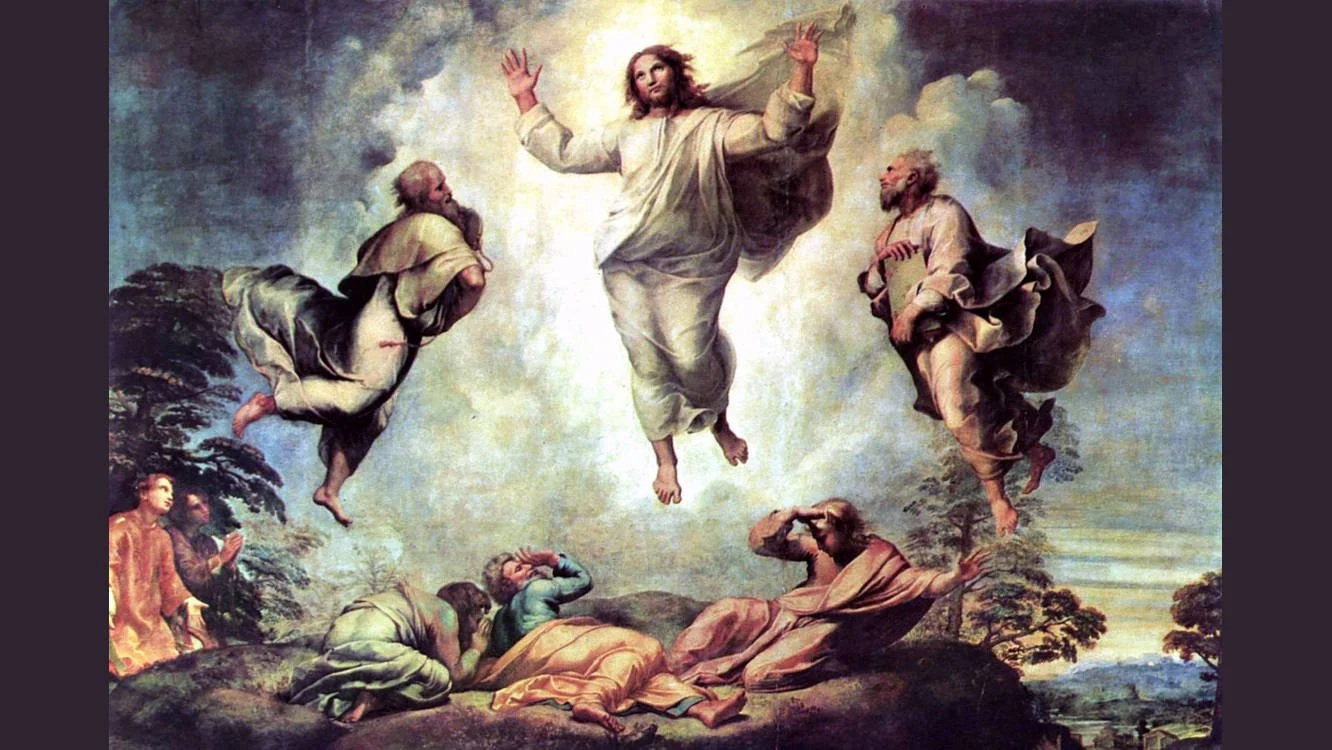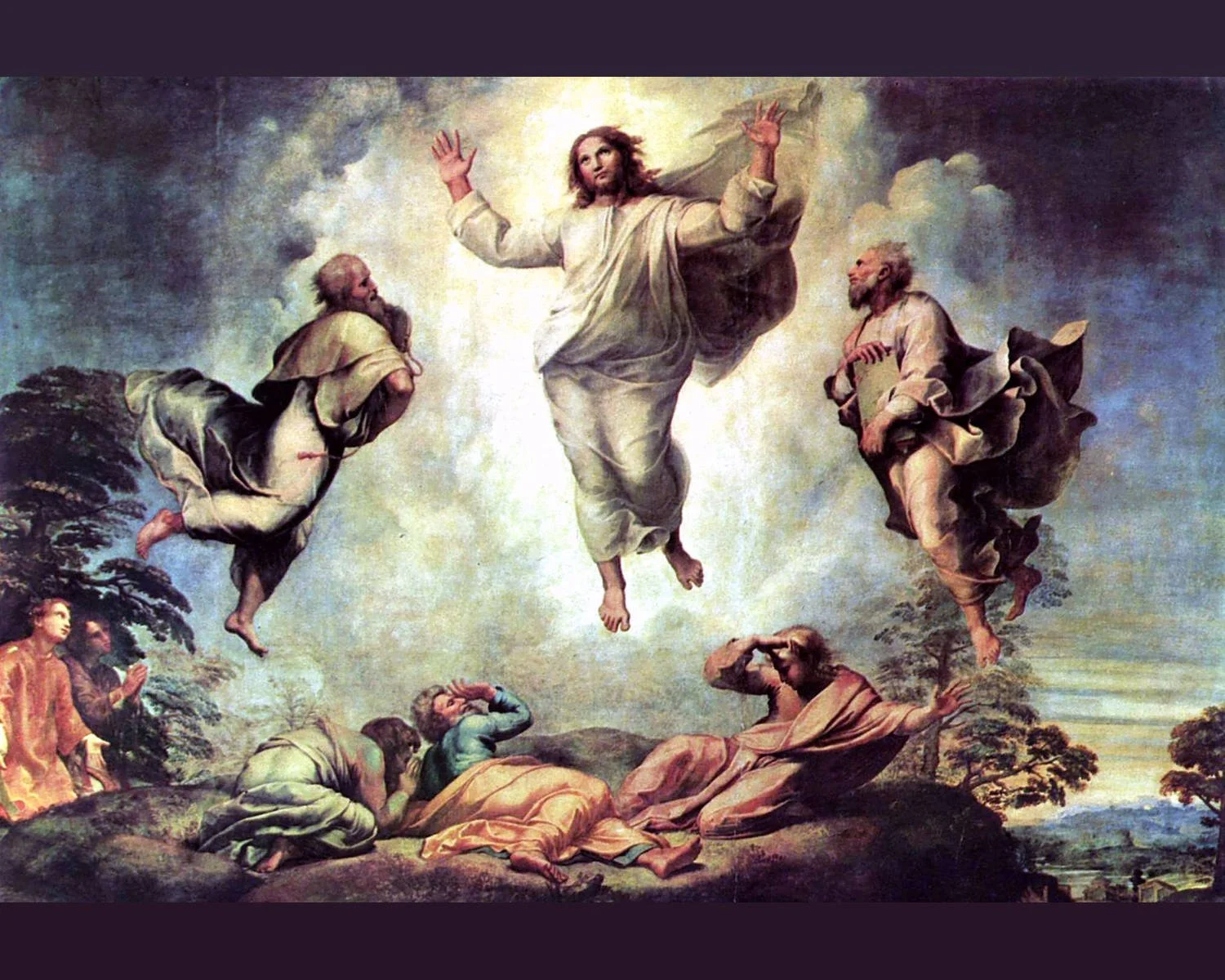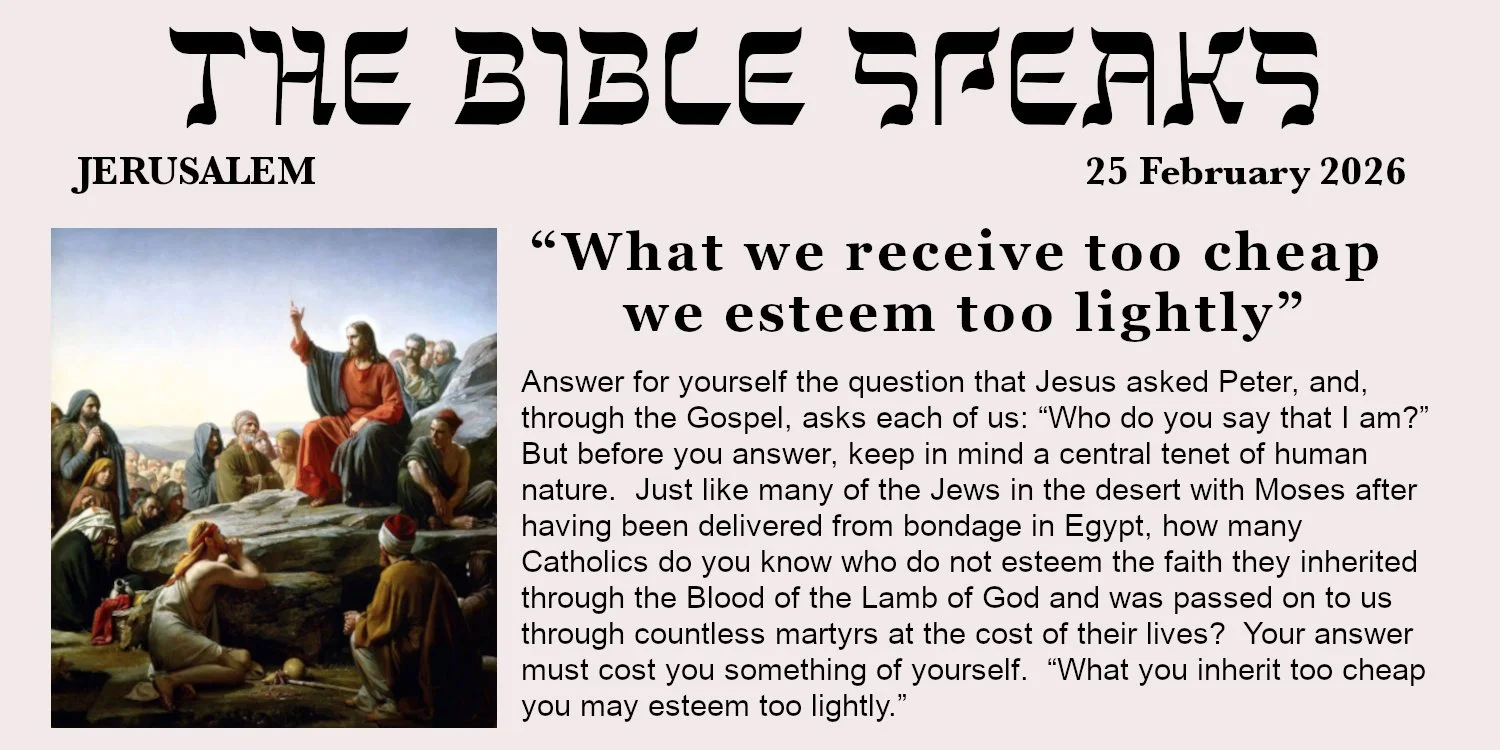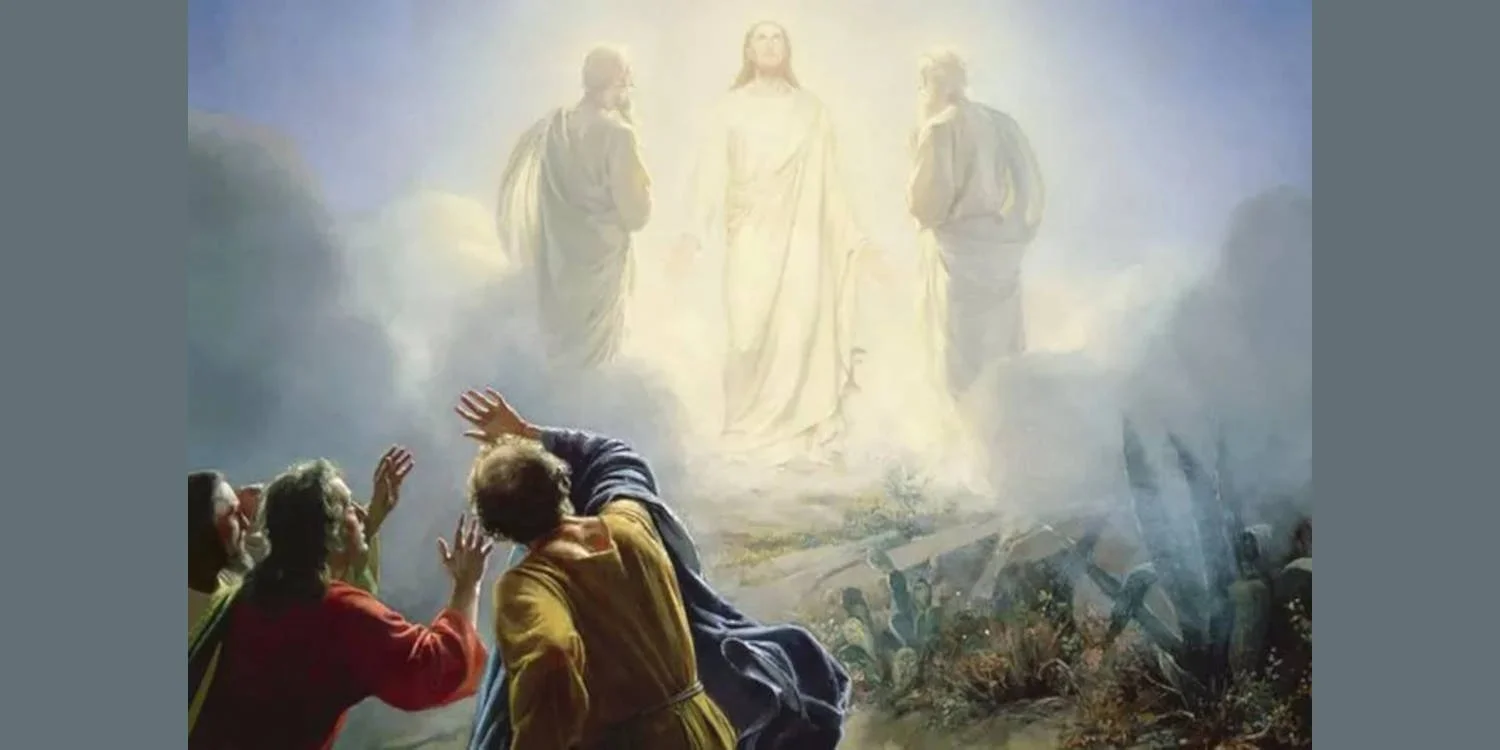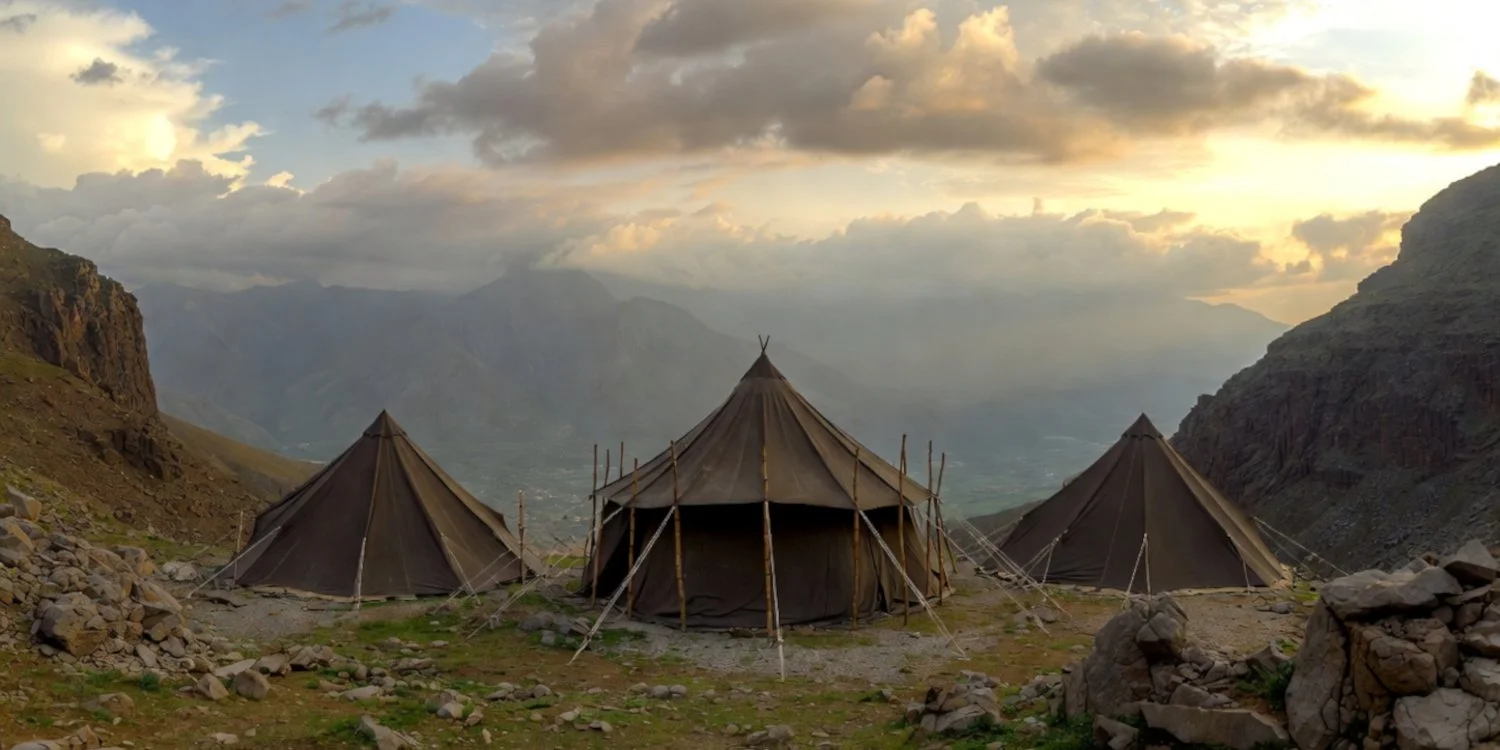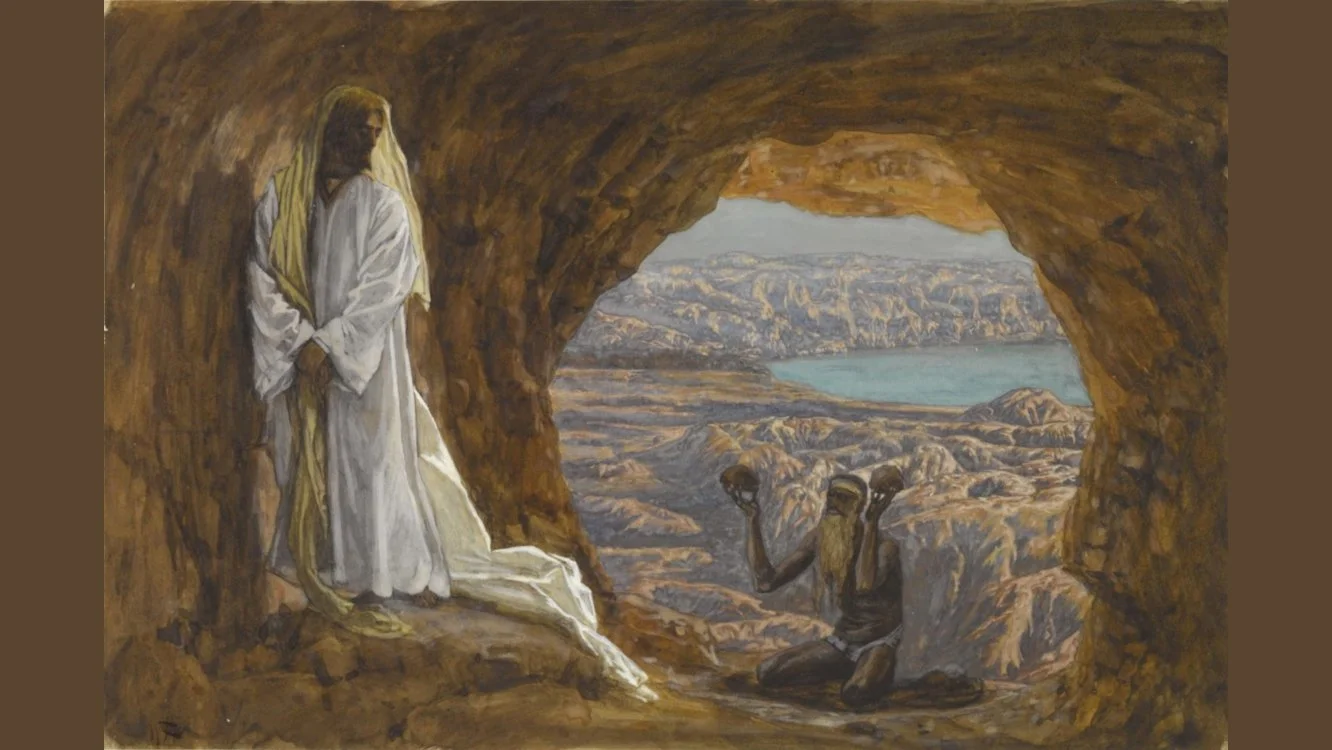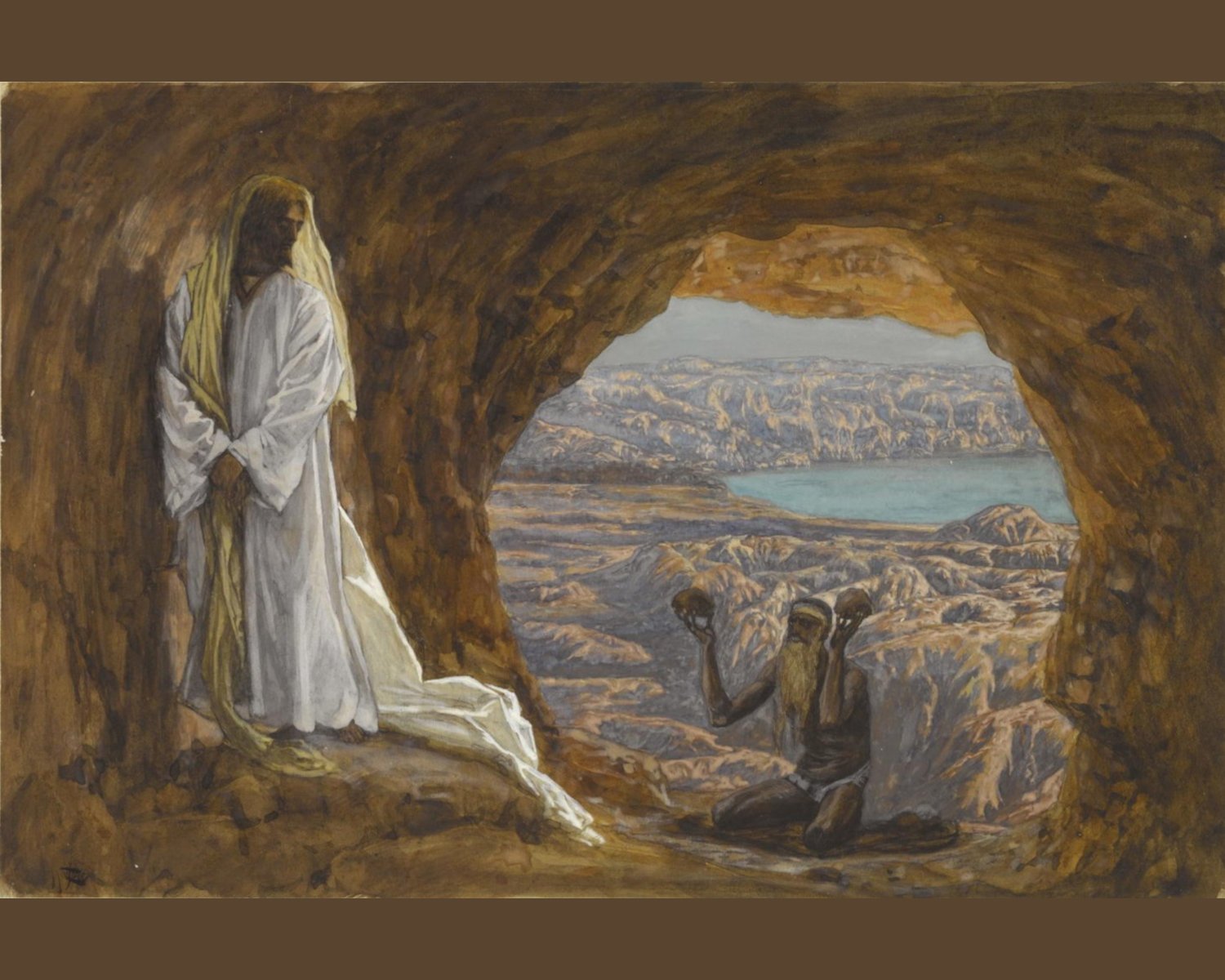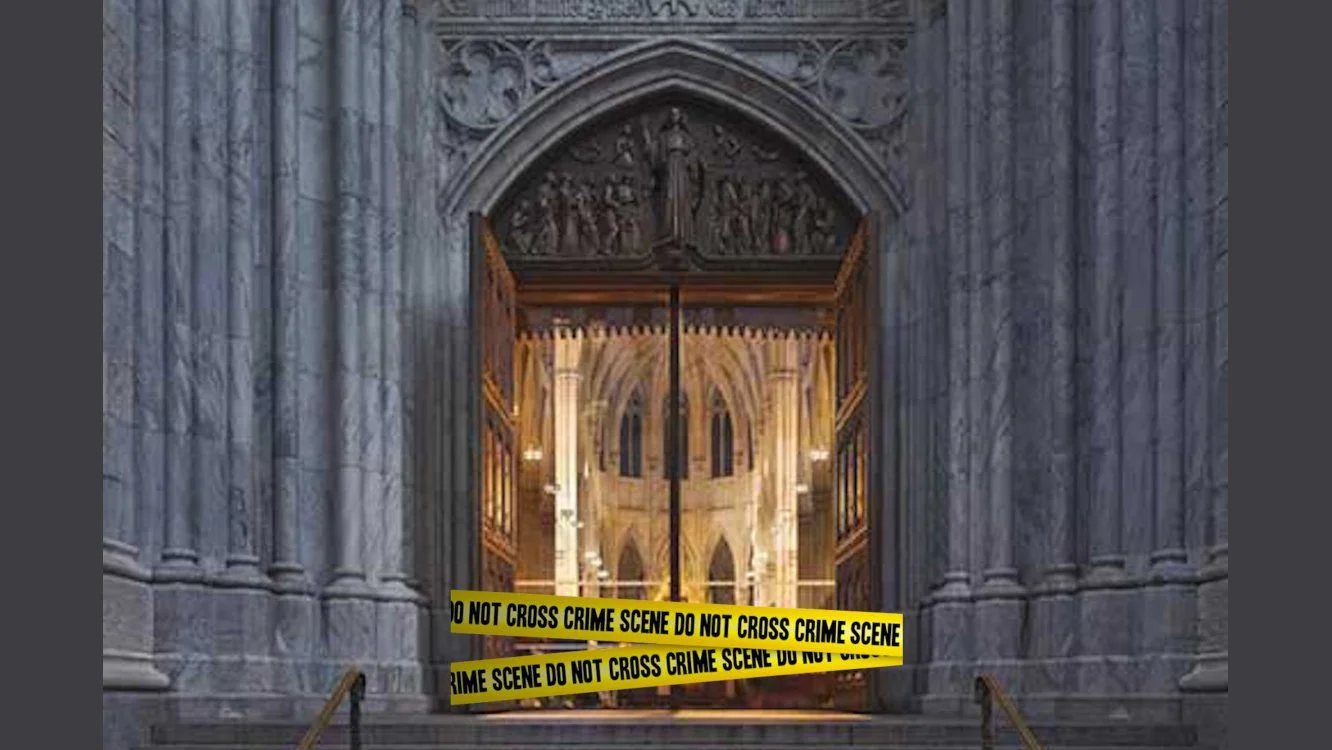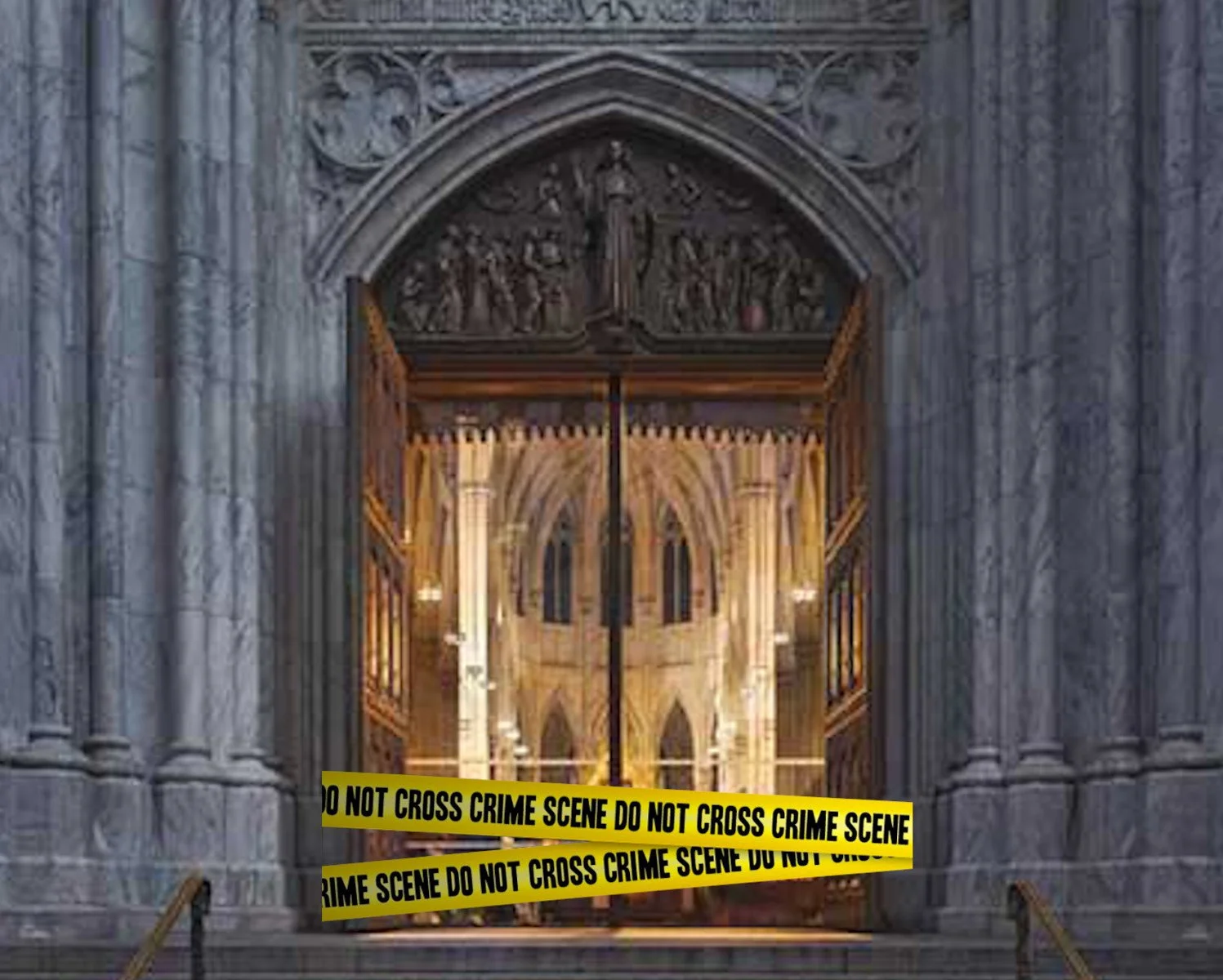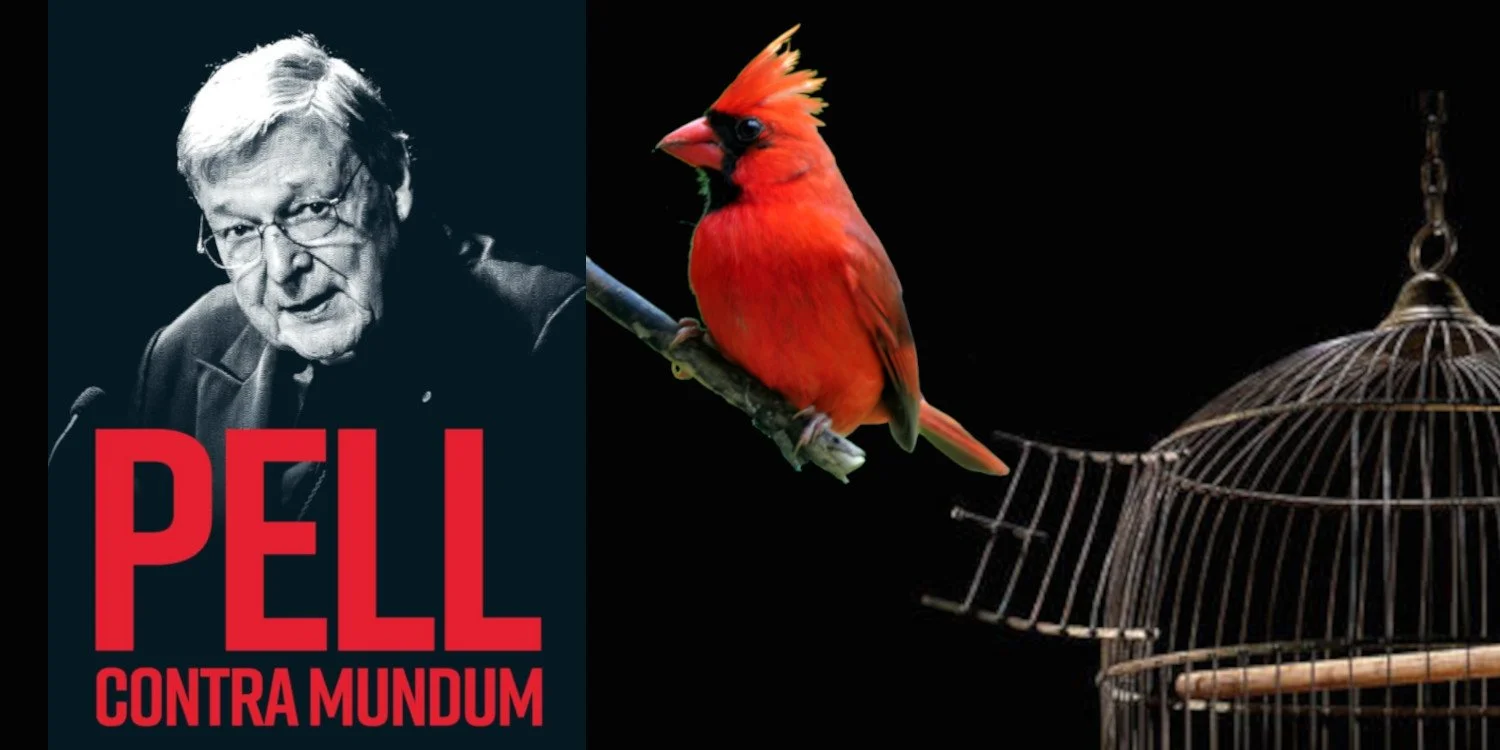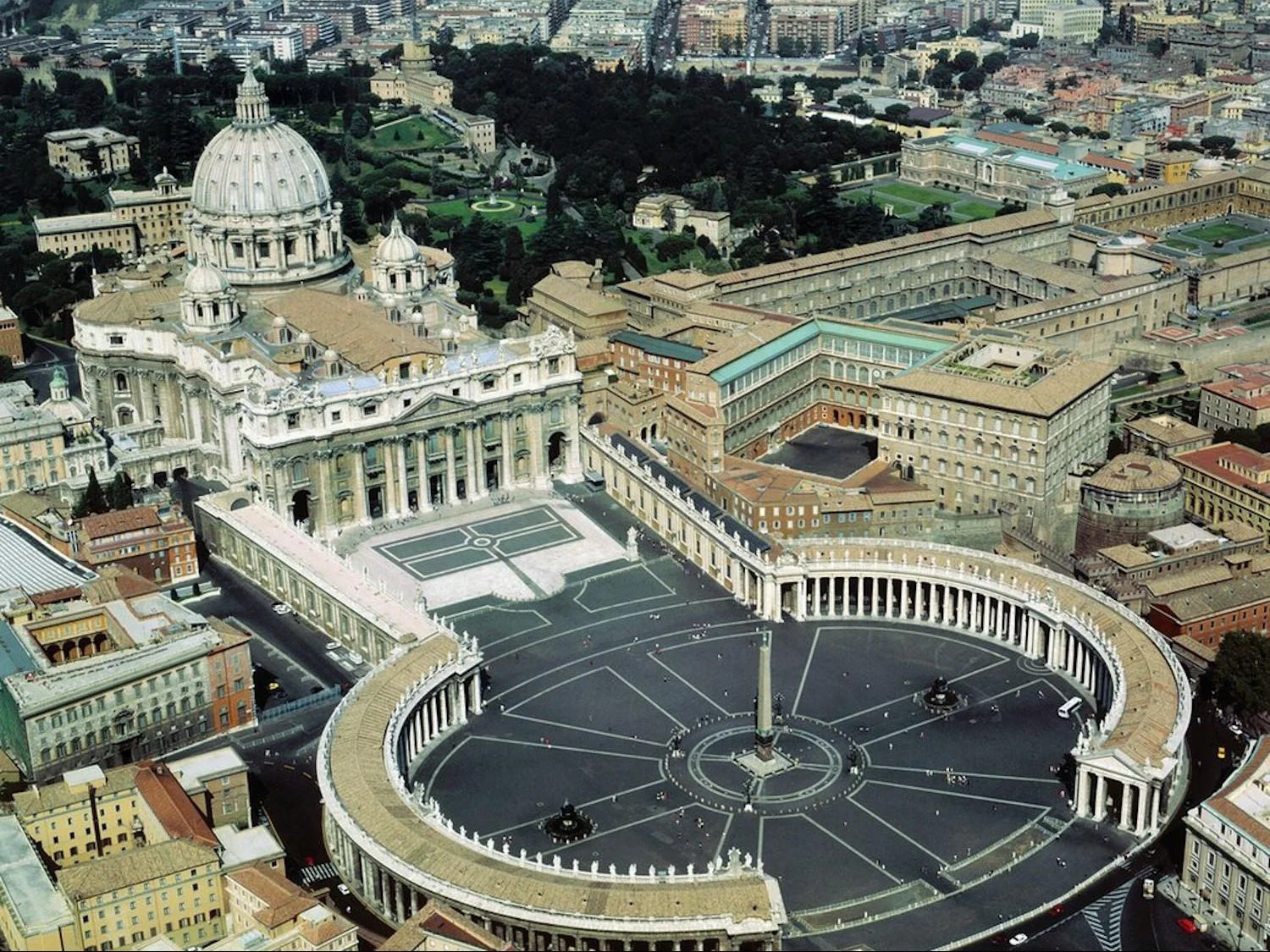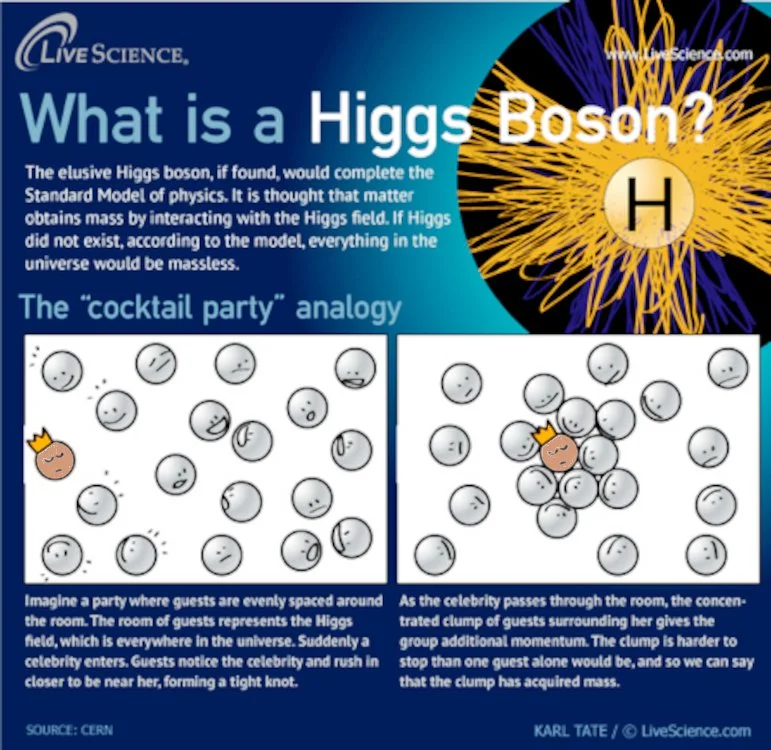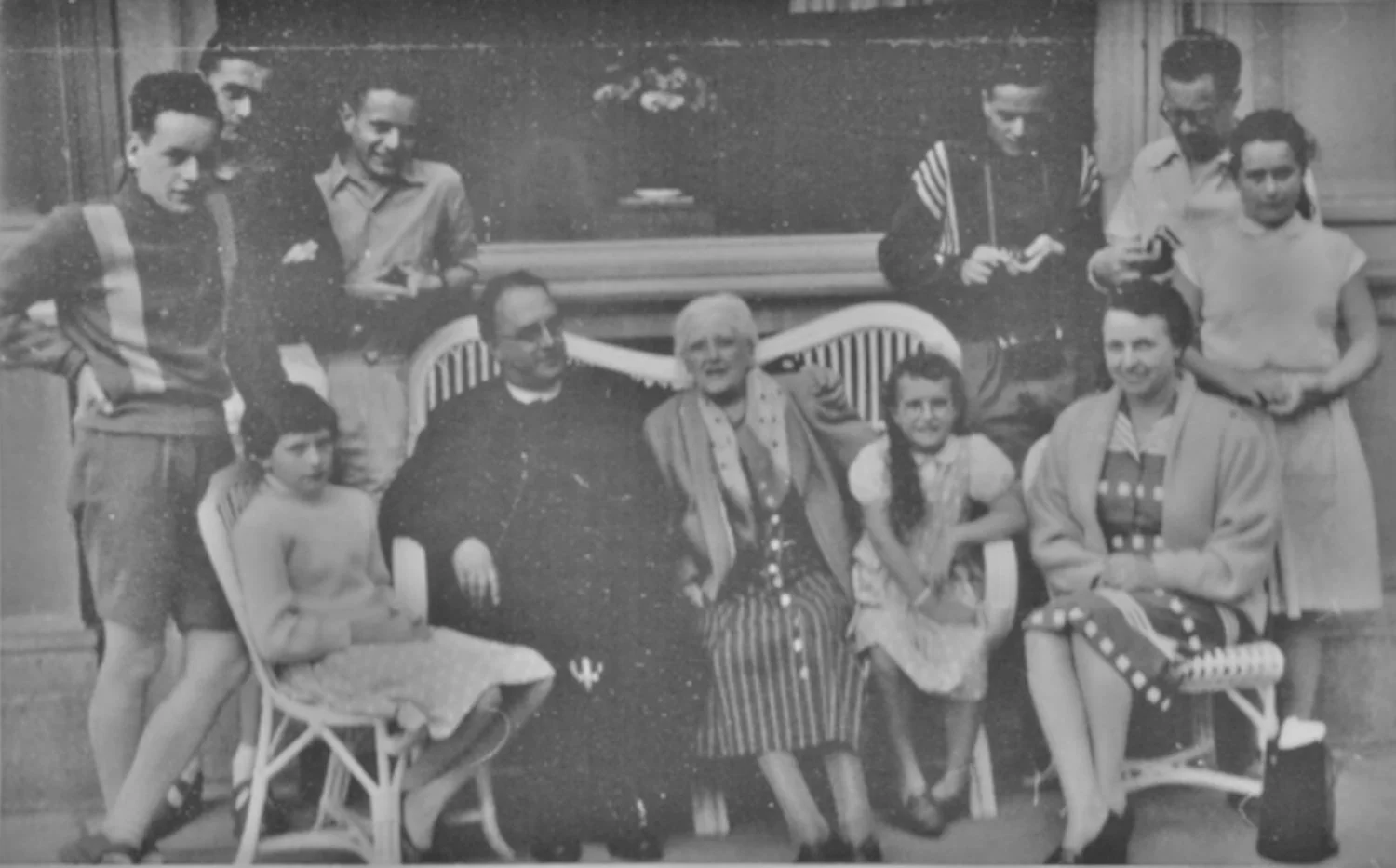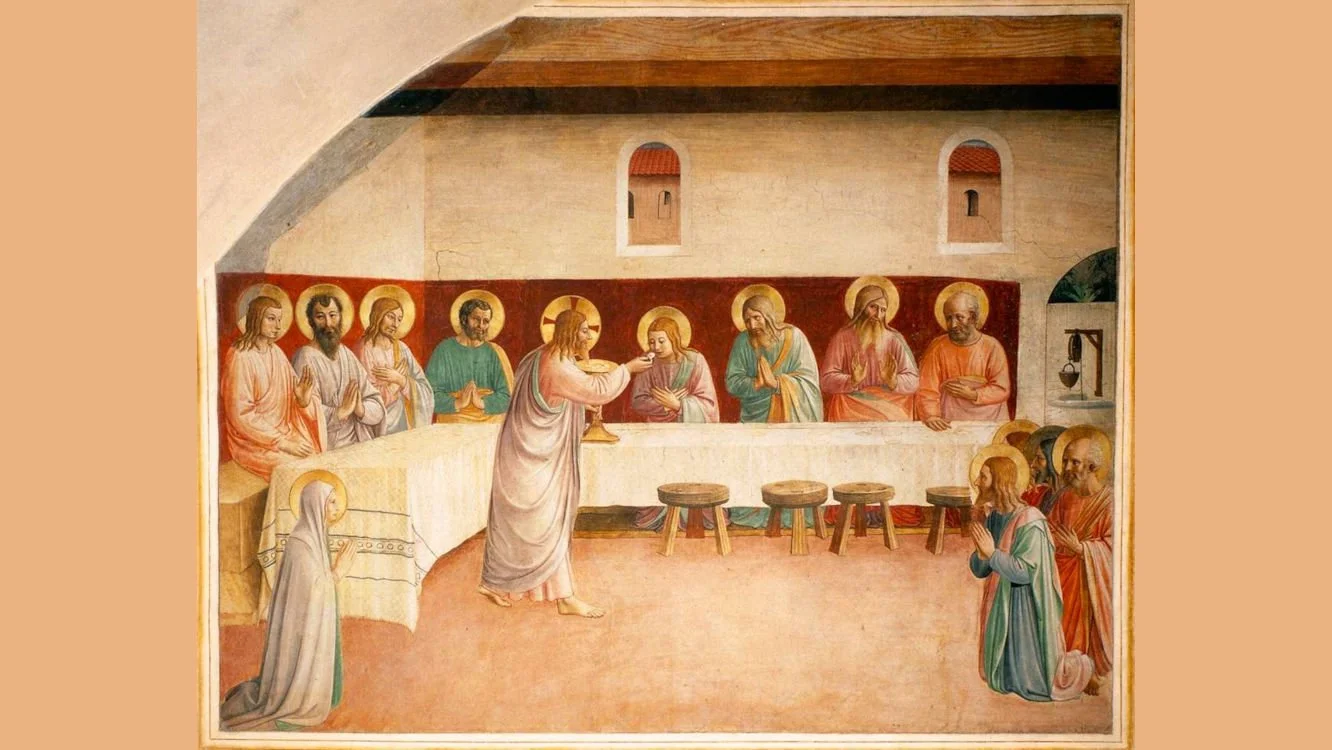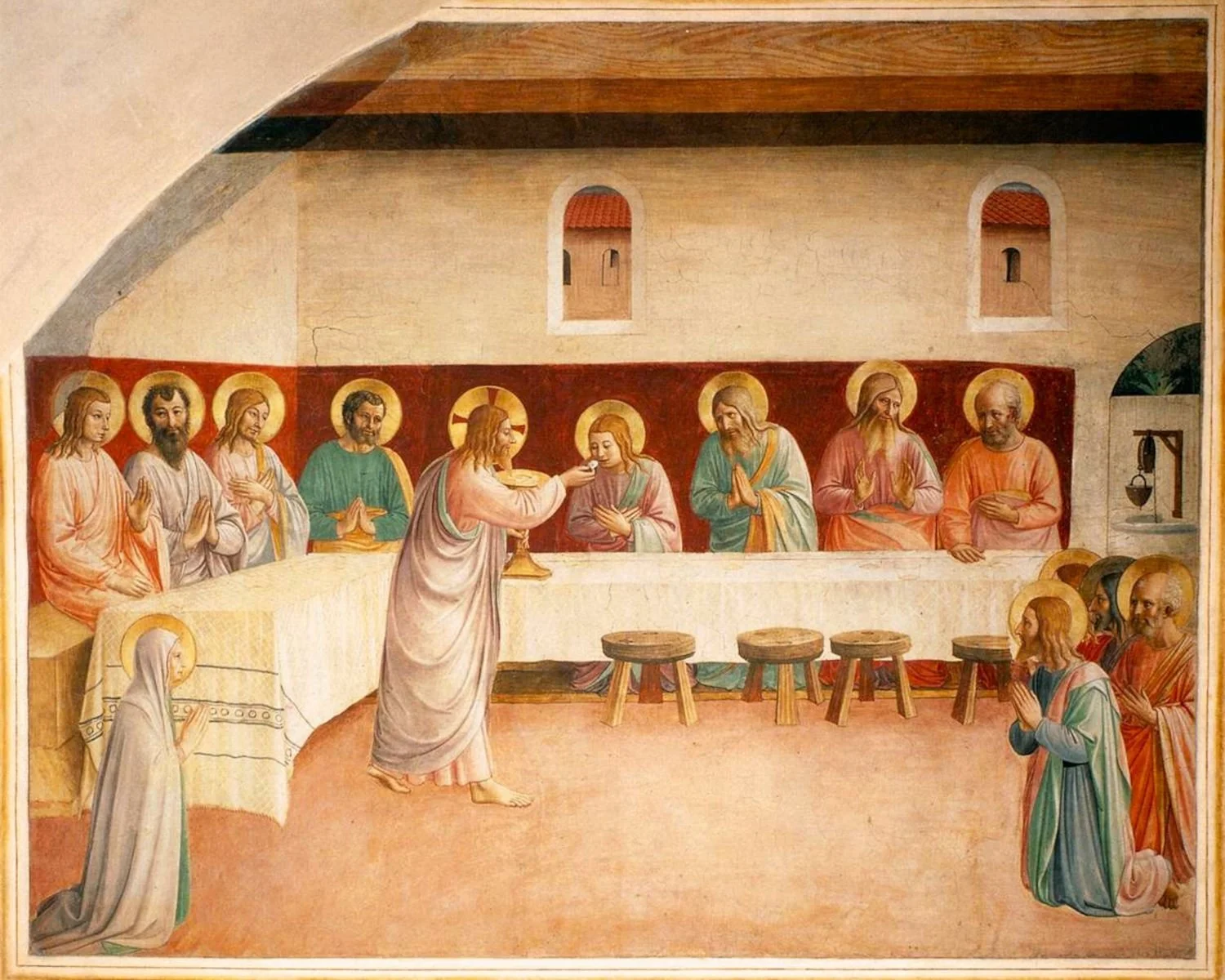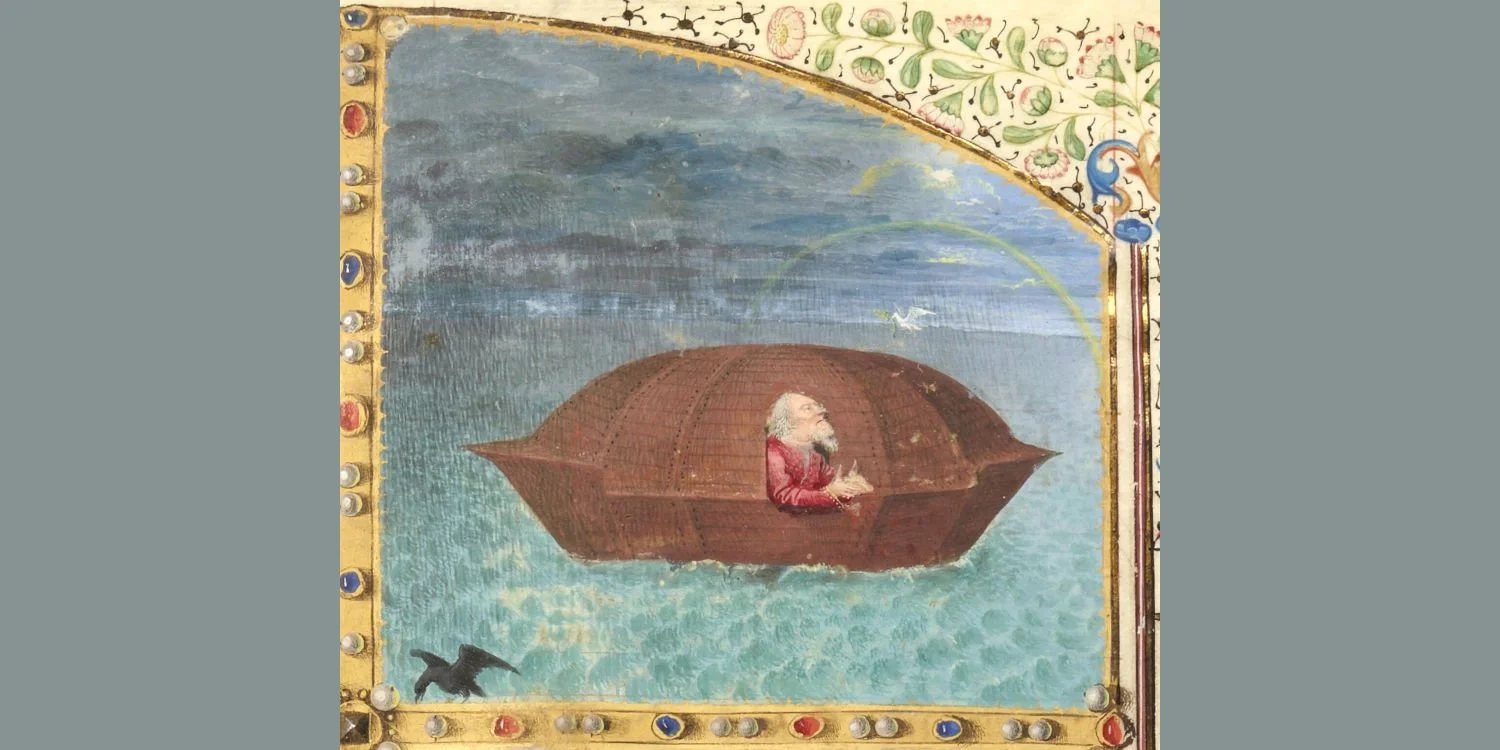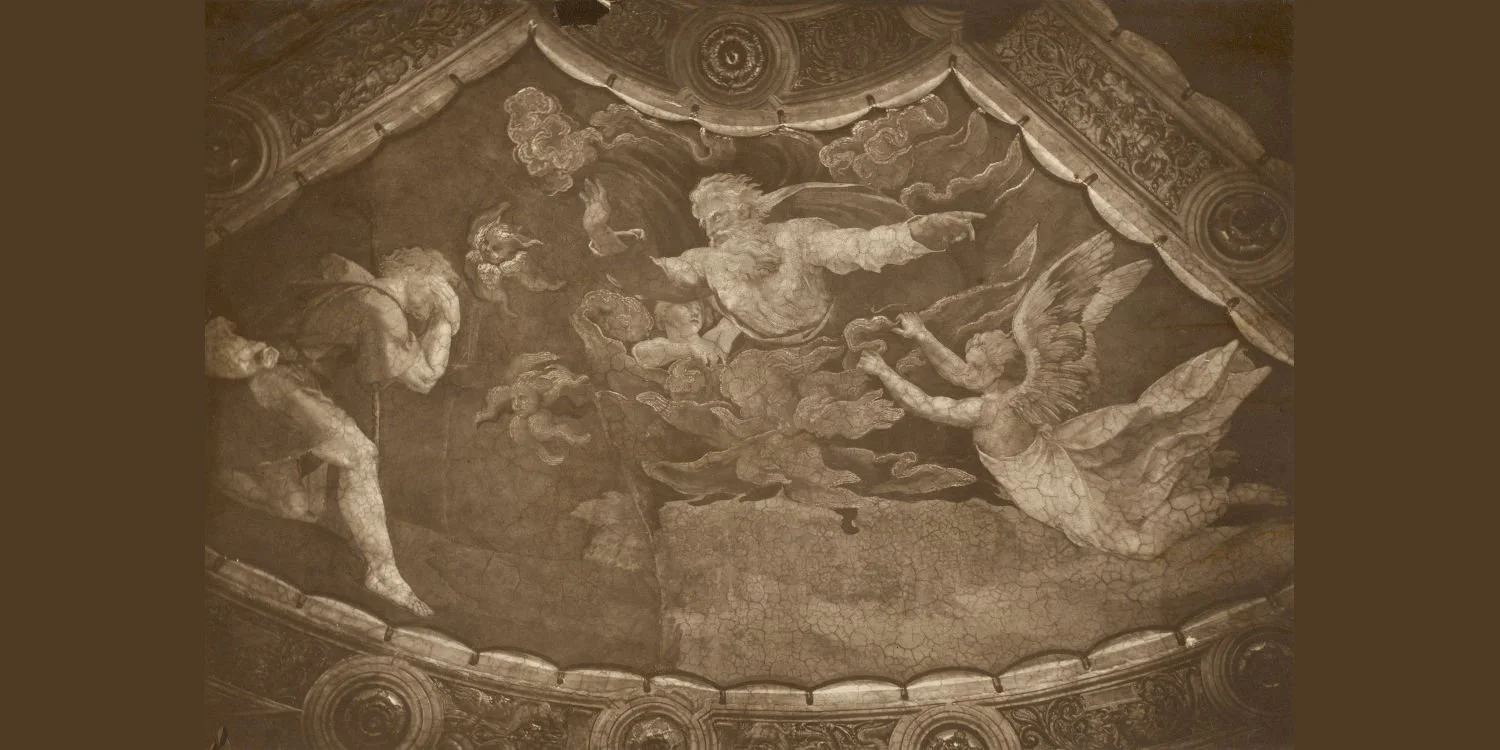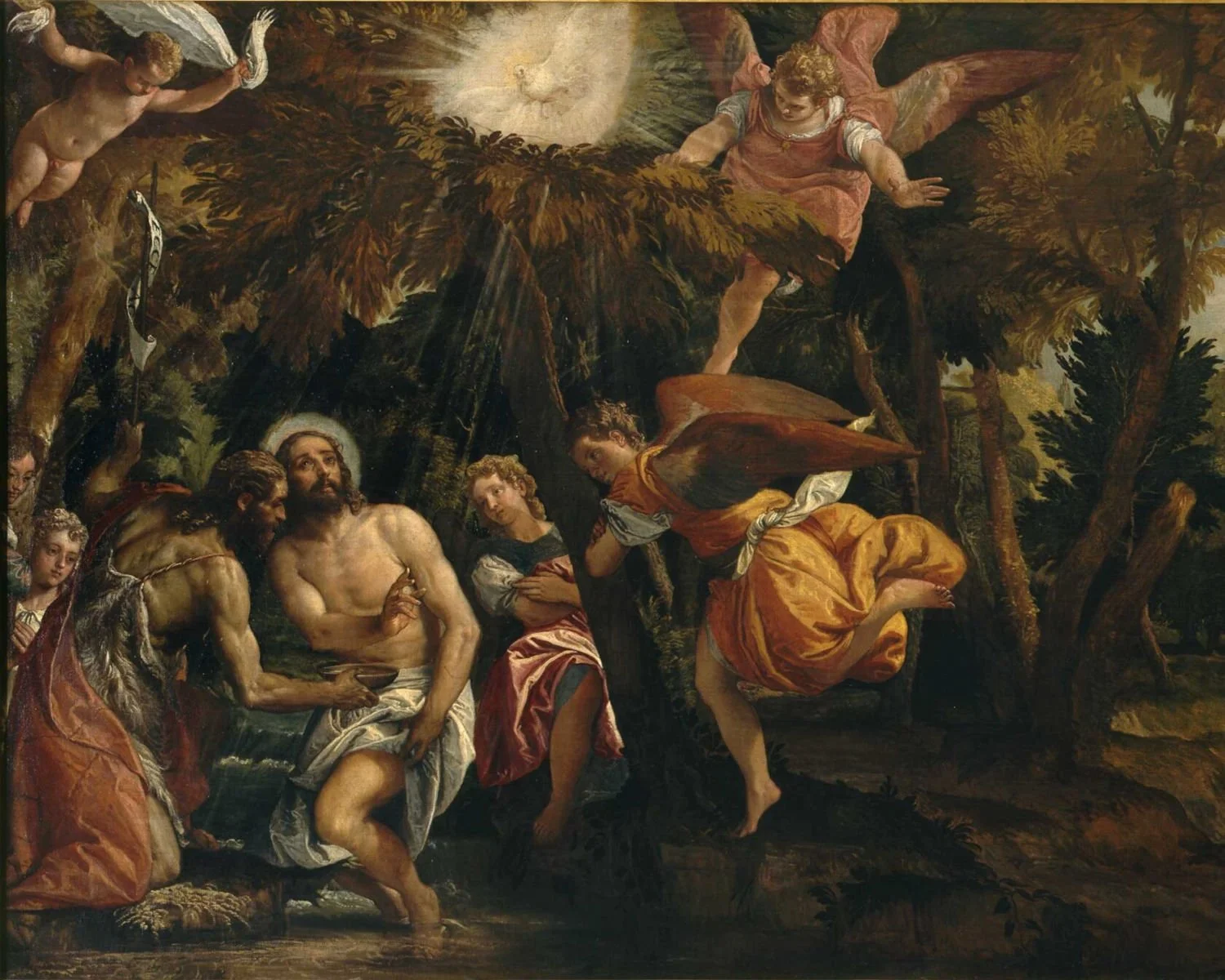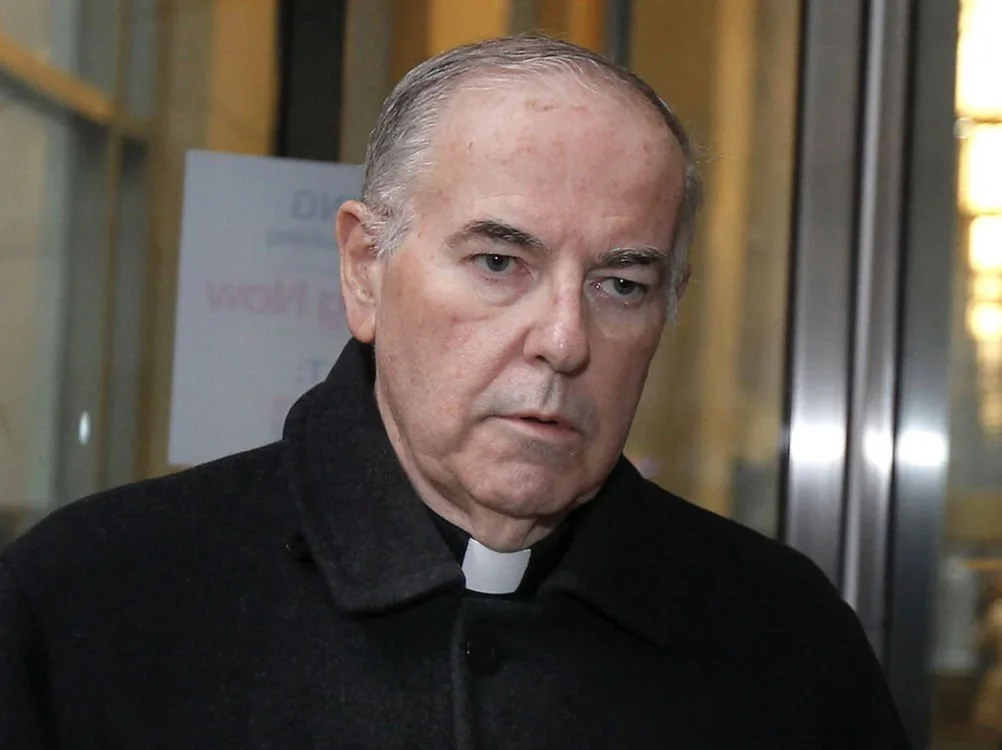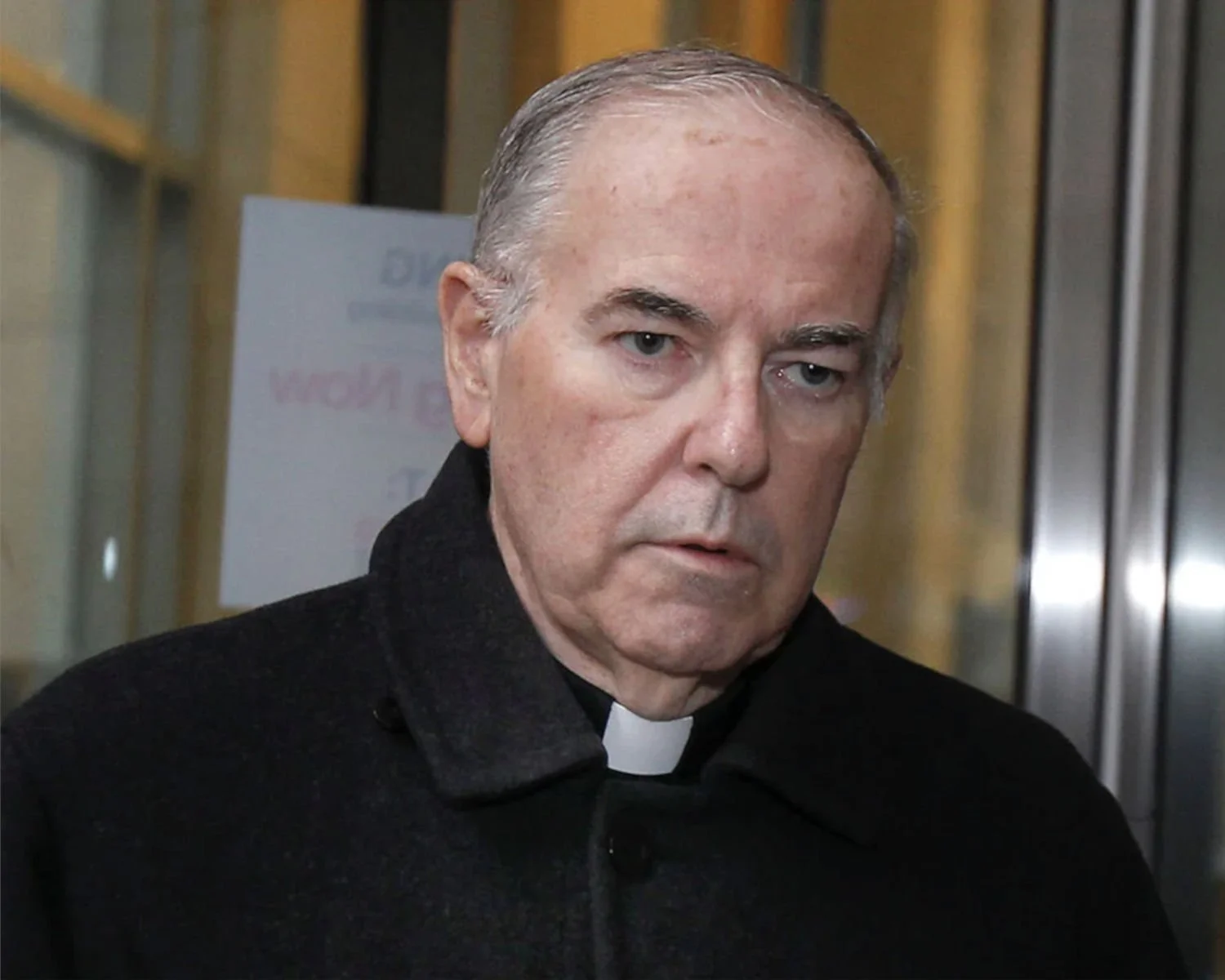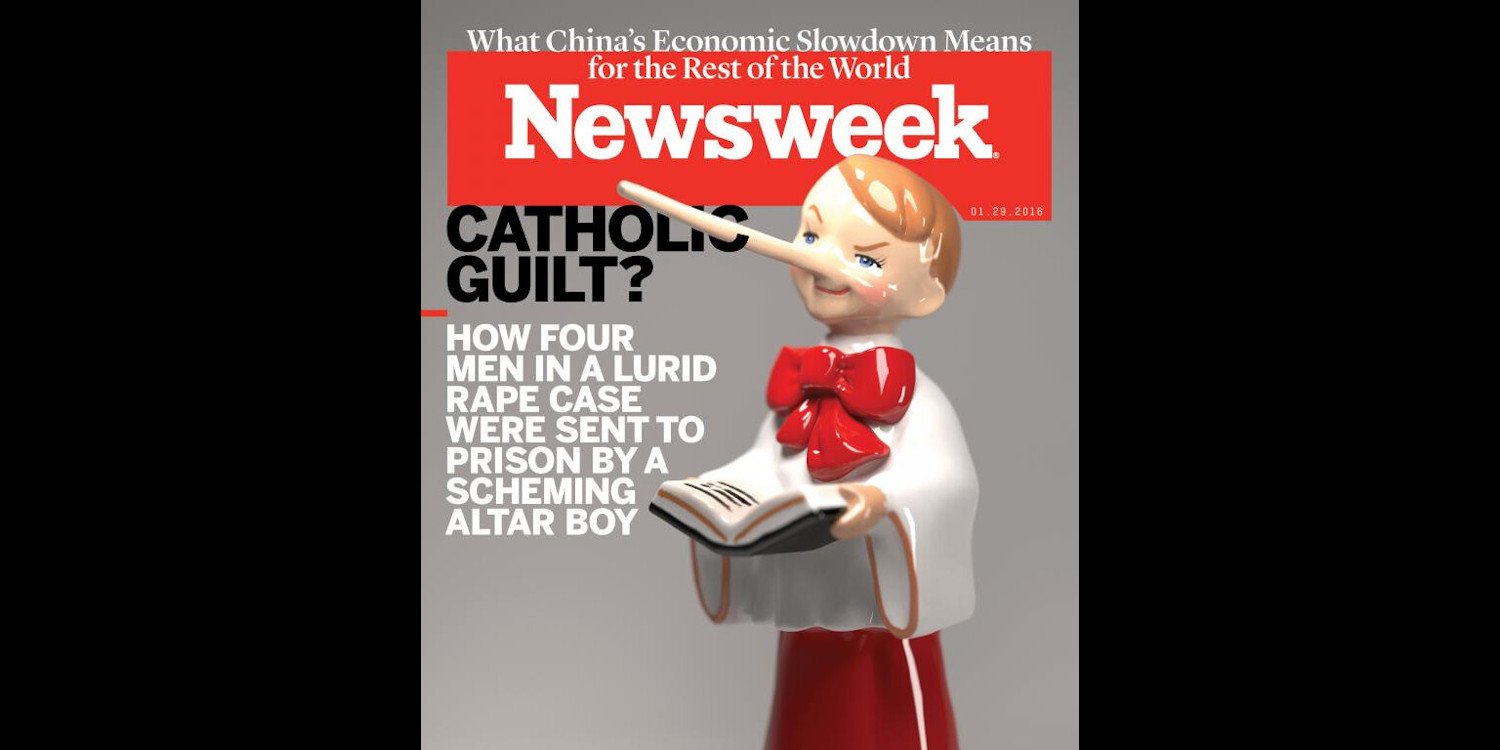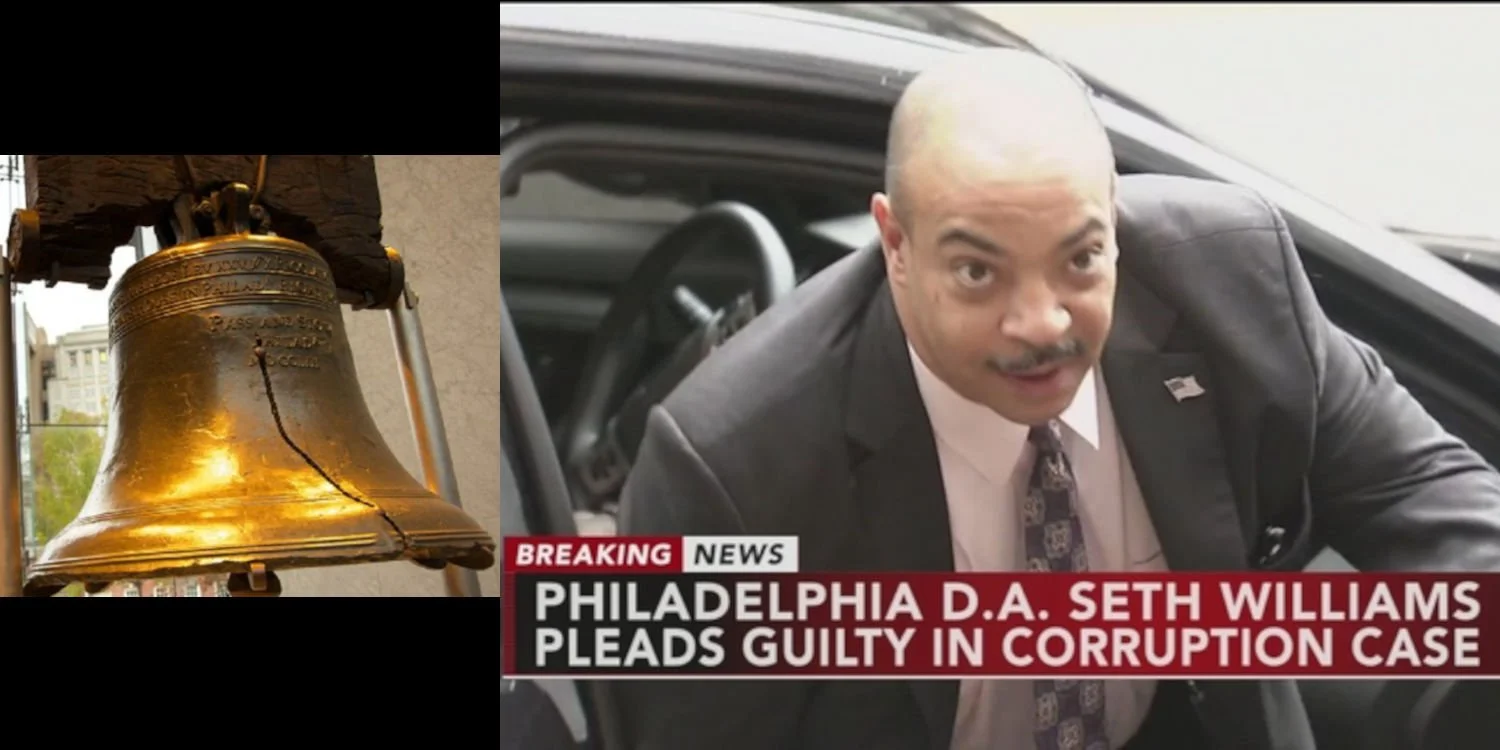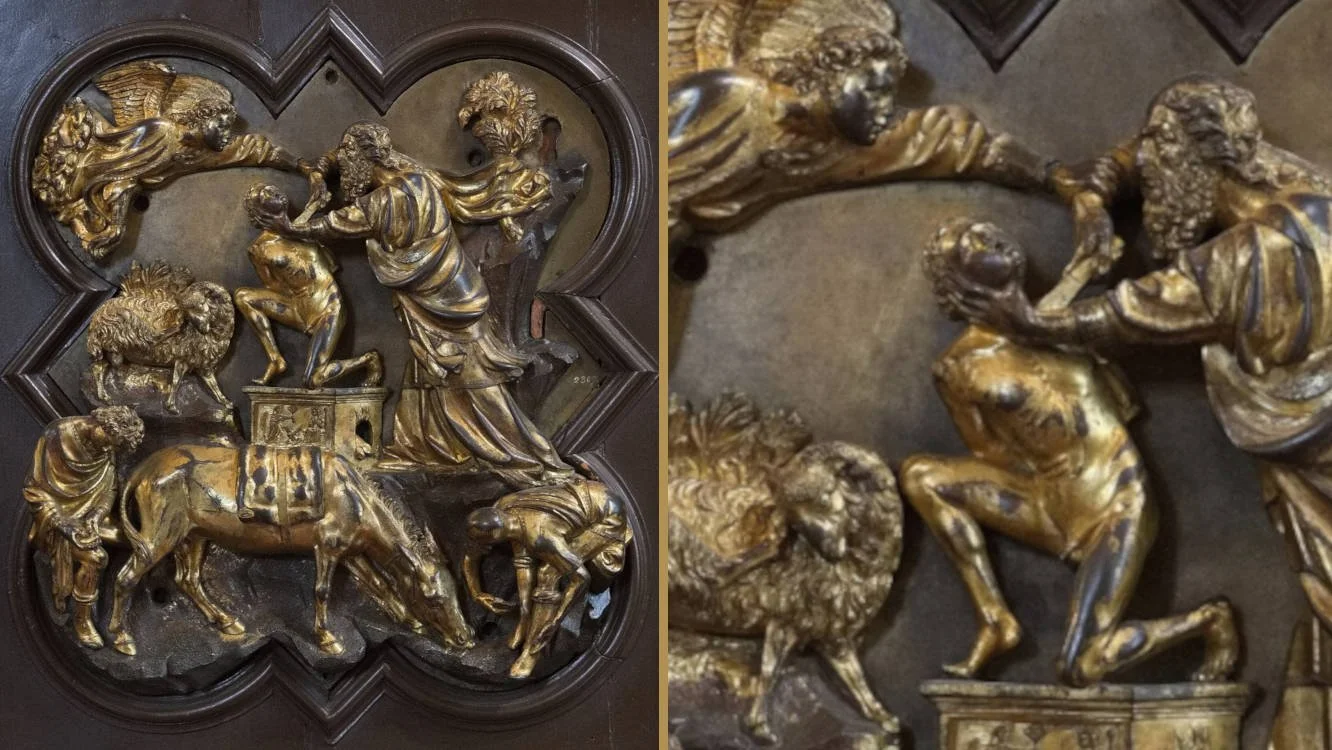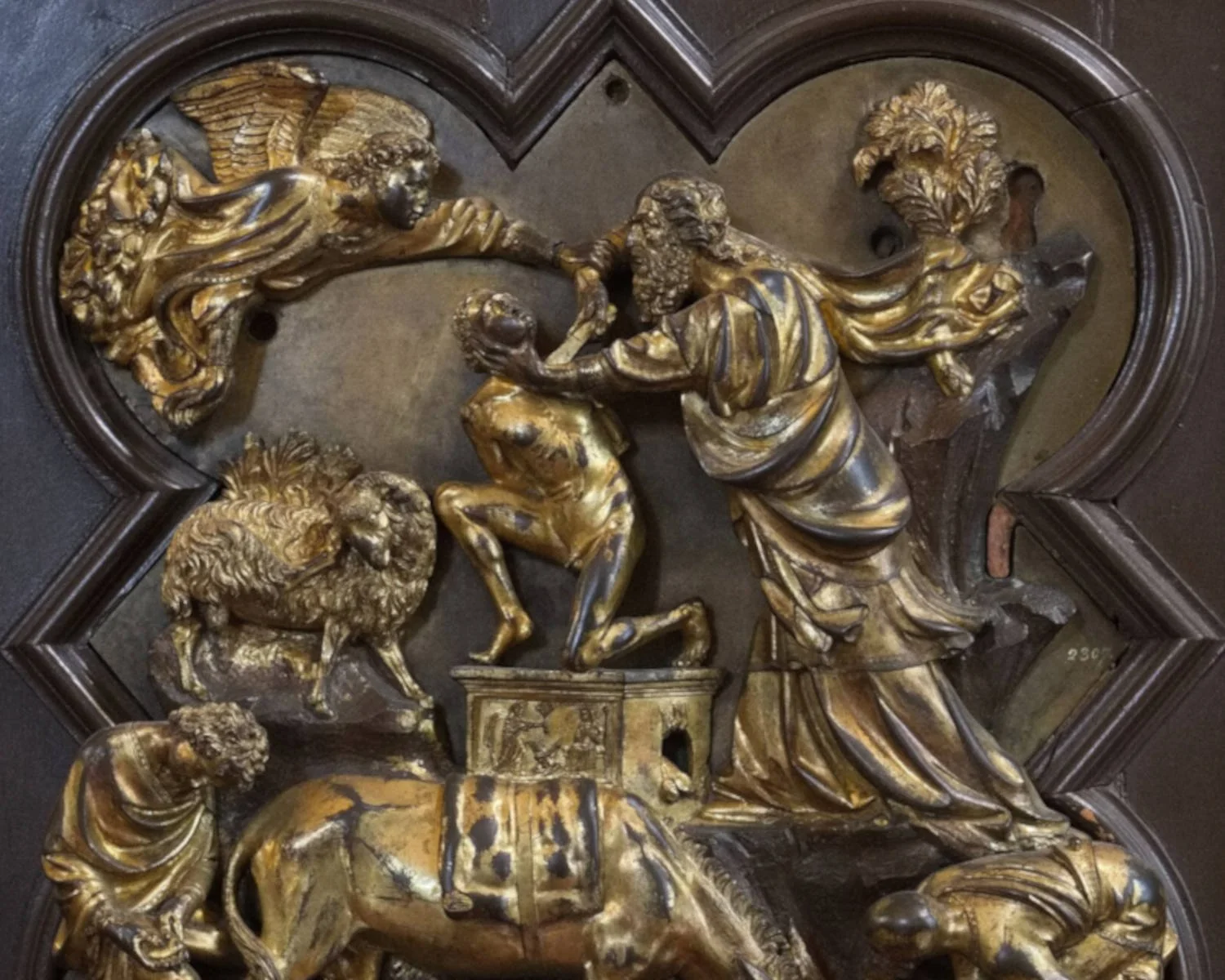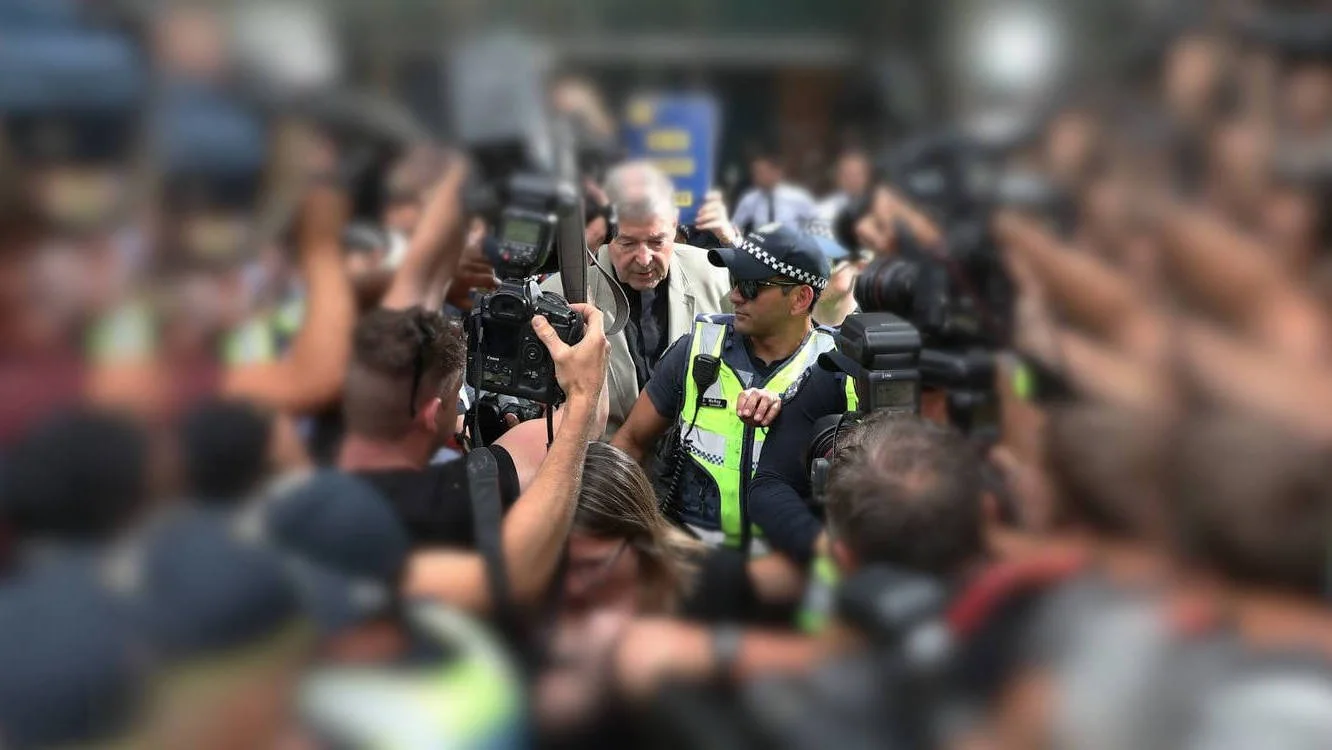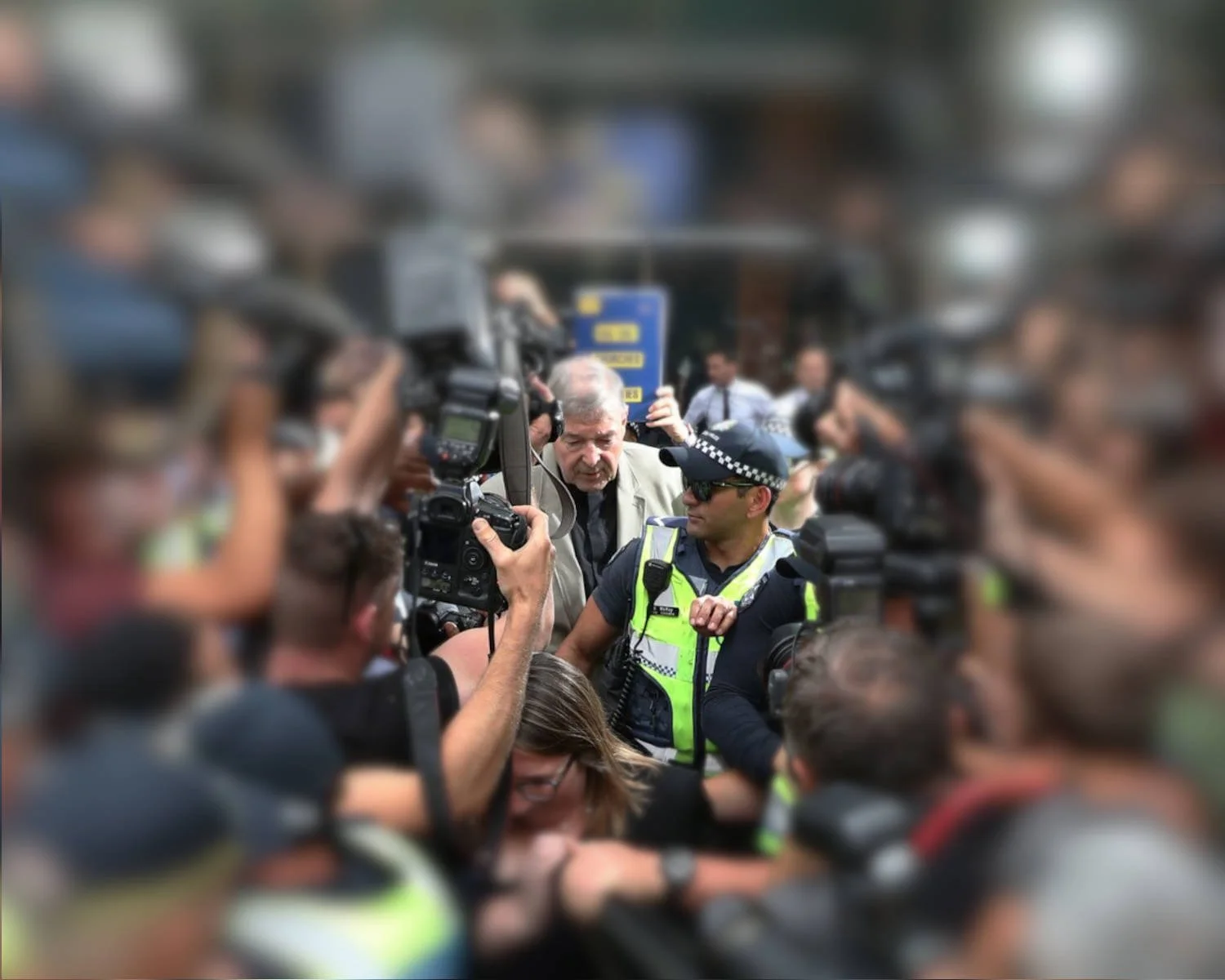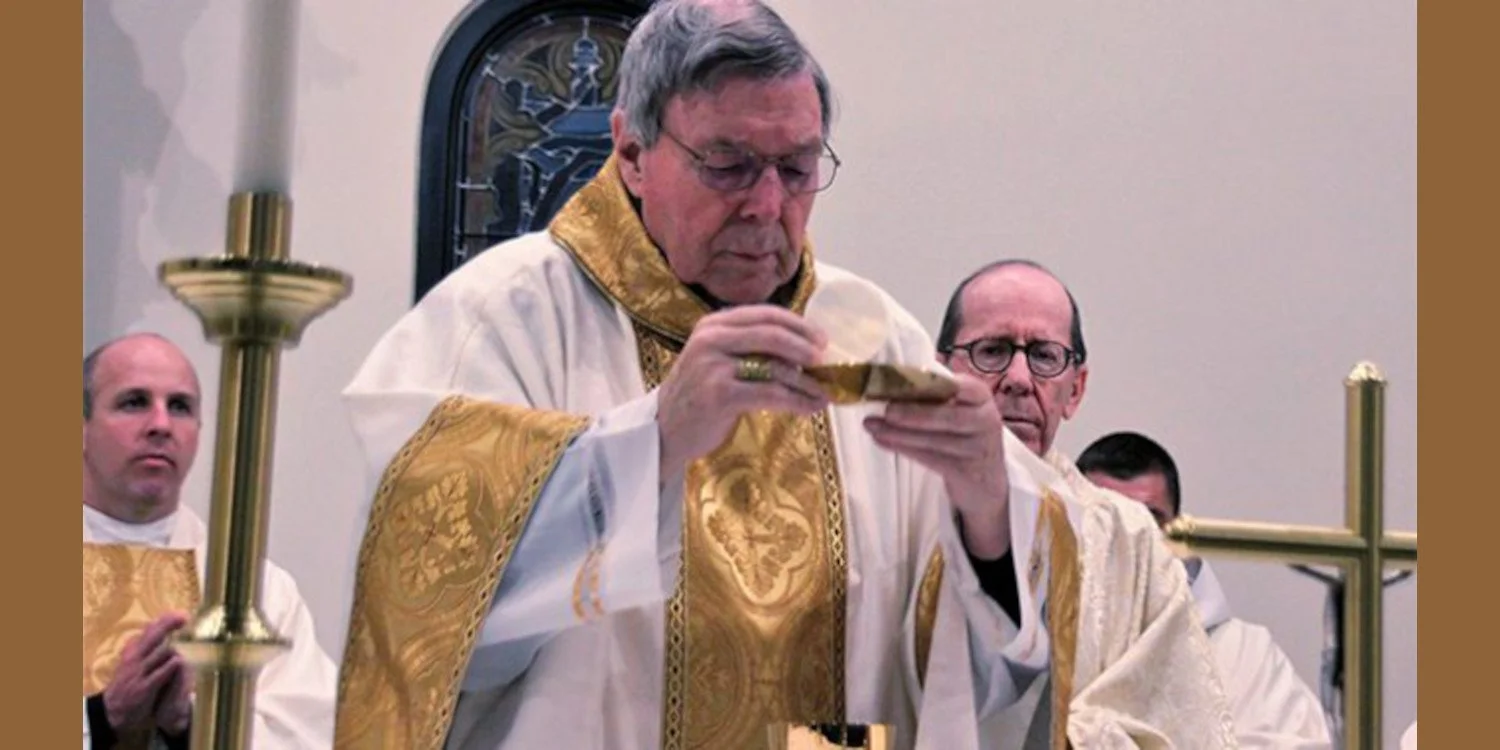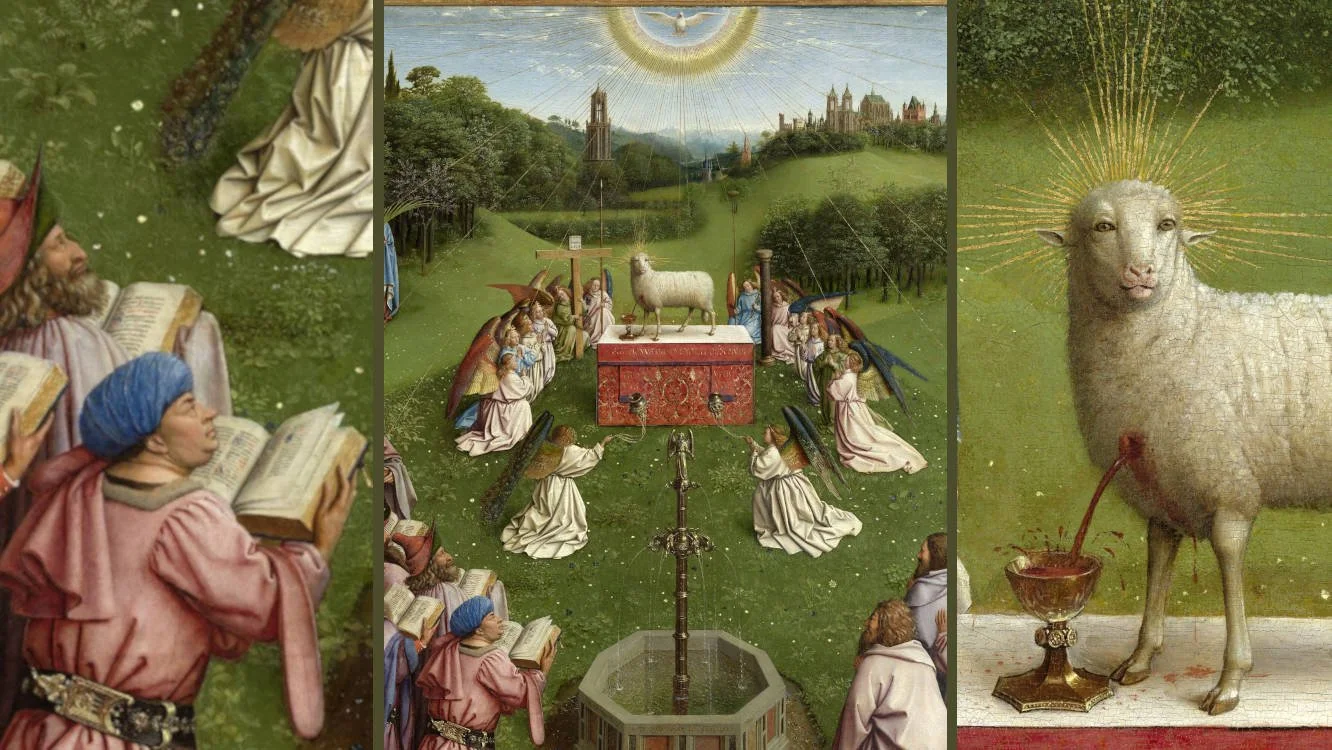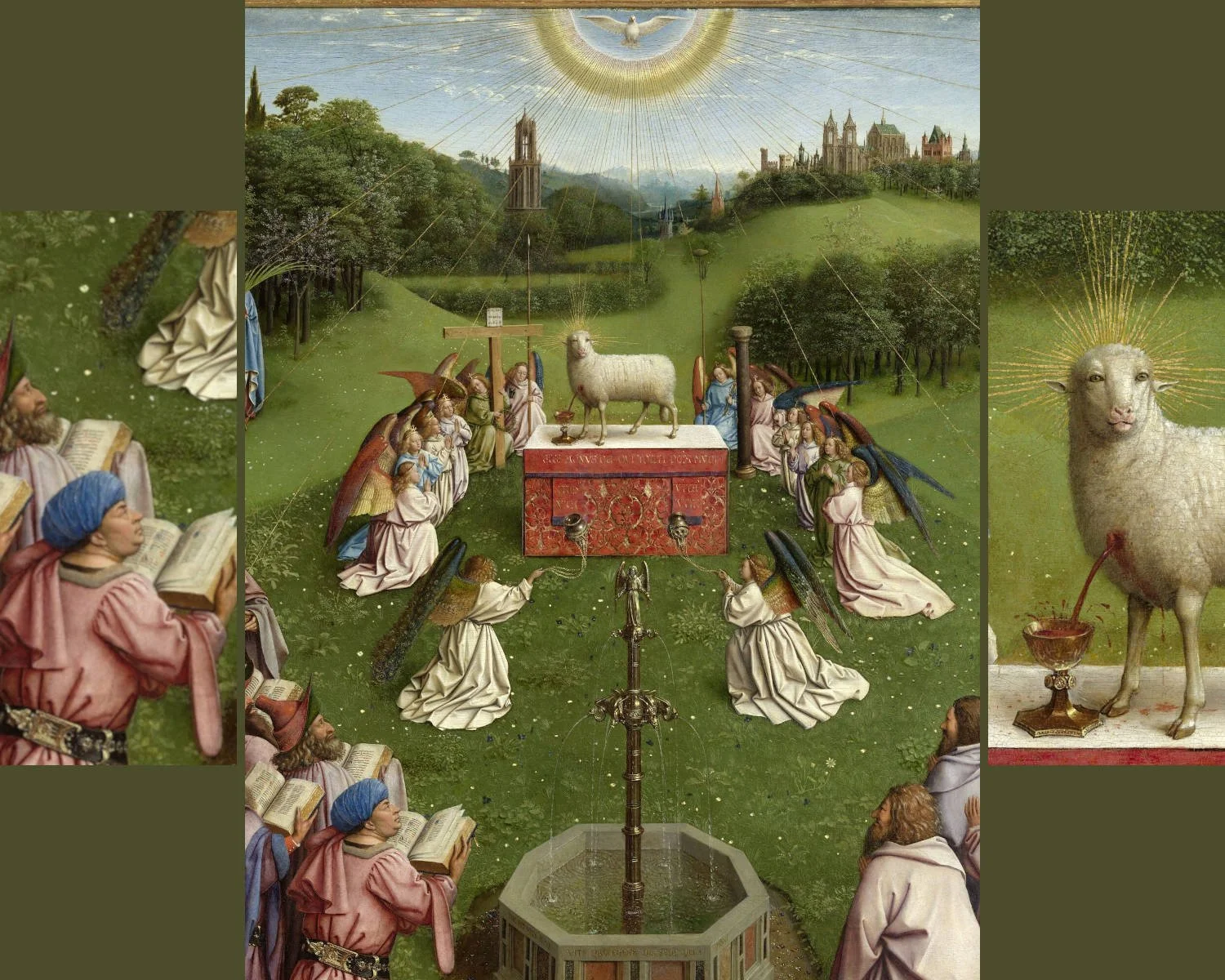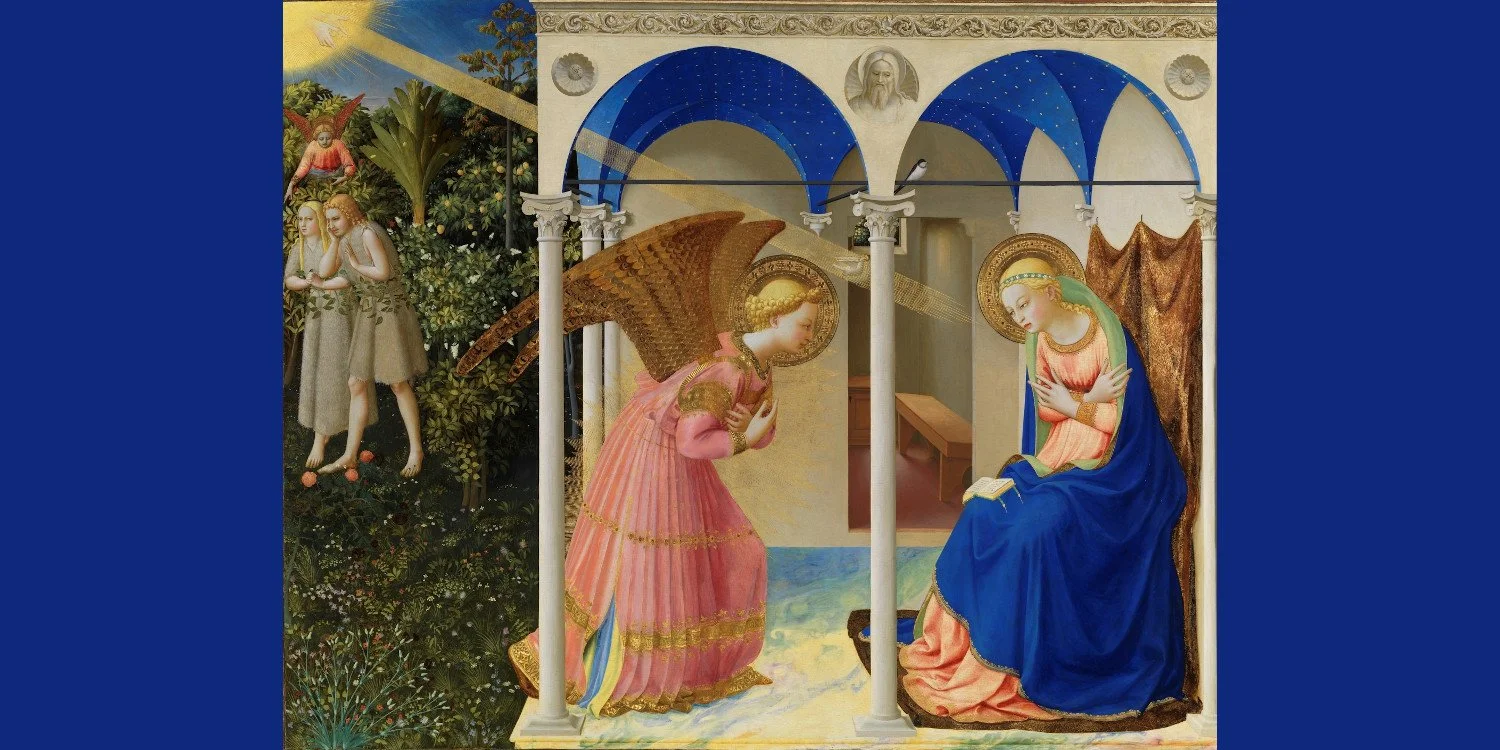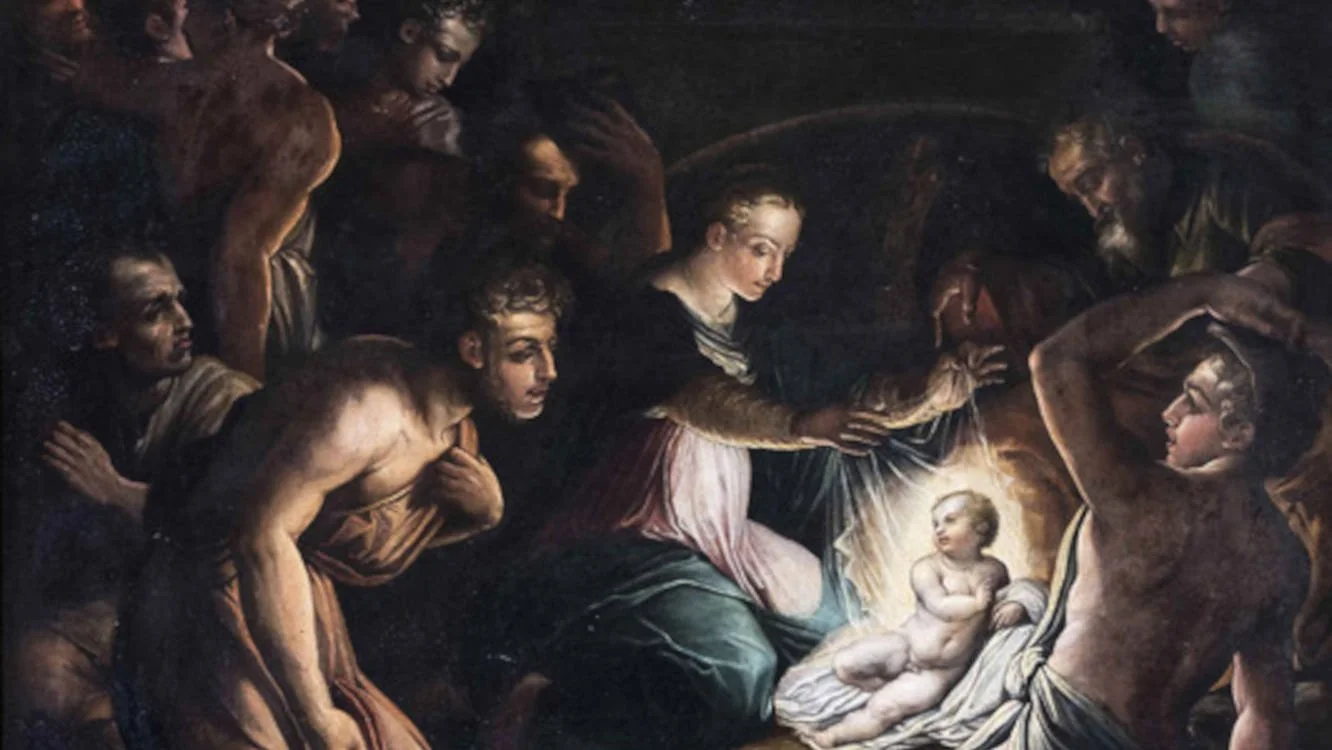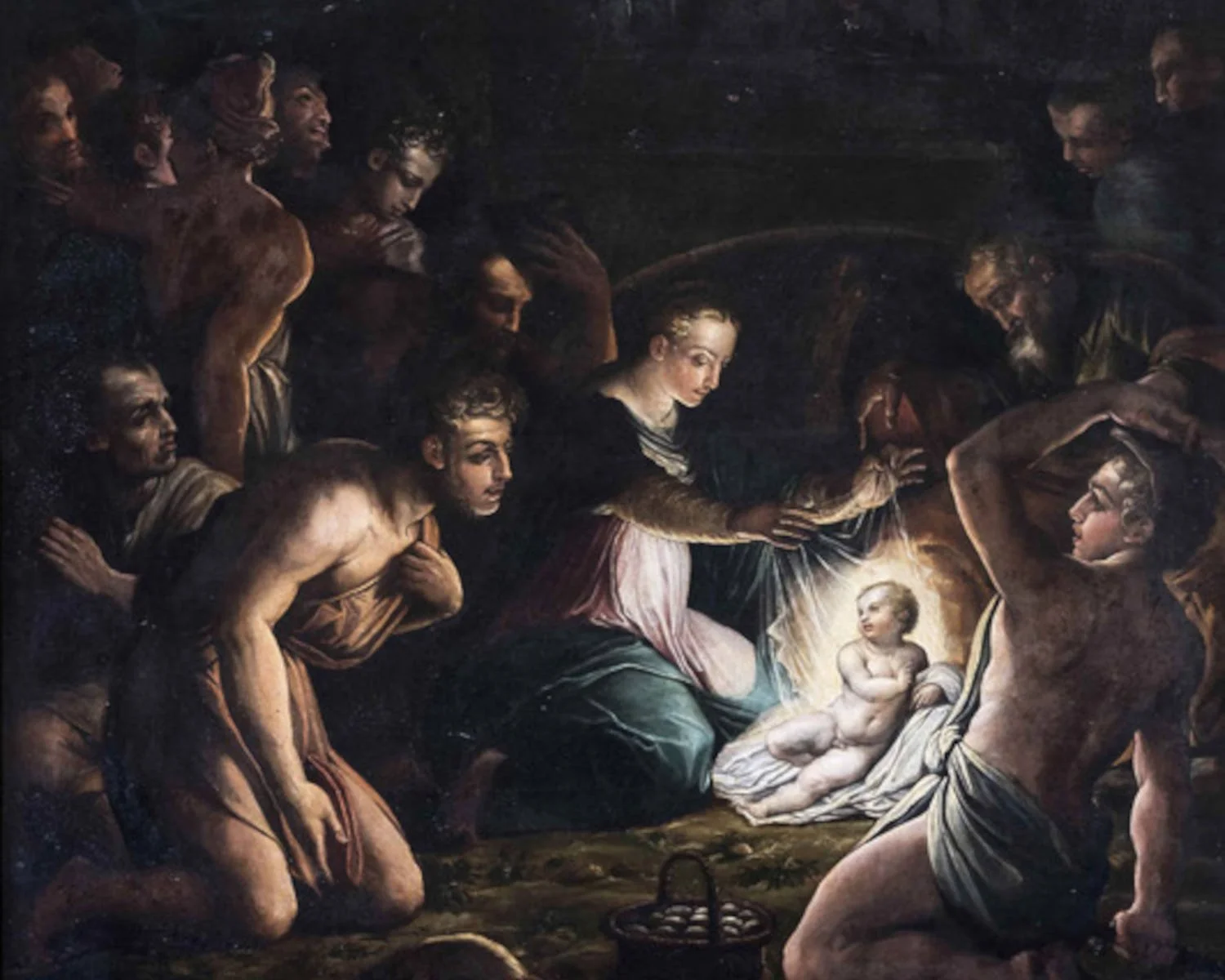“There are few authentic prophetic voices among us, guiding truth-seekers along the right path. Among them is Fr. Gordon MacRae, a mighty voice in the prison tradition of John the Baptist, Maximilian Kolbe, Alfred Delp, SJ, and Dietrich Bonhoeffer.”
— Deacon David Jones
The Law and the Prophets and the Transfiguration of Christ
Moses and the Prophet Elijah are present for the Transfiguration of Christ. They represent the Law and the Prophets, the two pillars of Israel's faith and ours.
Moses and the Prophet Elijah are present for the Transfiguration of Christ. They represent the Law and the Prophets, the two pillars of Israel's faith and ours.
February 25, 2026 by Father Gordon MacRae
“Nothing new in the Holy See.” I hear these words from our Editor every week as she reviews with me a global traffic report for this blog. Being blind behind these stone walls to everything going on with a post after it leaves my archaic typewriter, this opportunity to know that someone out there is actually reading is vaguely comforting to me. We cannot know who is reading any particular post, but we can see where they are, and how many they are.
Our call always ends with “Nothing new in the Holy See.” It means that no one there has stopped to look from Beyond These Stone Walls. There is a sadness in that. There is a lot of controversy in Rome these days, and because I have a stake in it, I am both anxious about it and anxious to have a voice in it. I look intently at the affairs of Rome even if no one there is ever looking back. Current events there are sometimes manipulated by those with an agenda to reshape the Church in their own image, or to filter the Way, the Truth, and the Light through the age of relativism.
But all this has more to do with our politics than the far more important opportunities to explore, and allow to be shaped within us, the profoundness of our faith. Unlike other Catholic bloggers, I can write only one post per week so the affairs of Rome will have to wait. It is Lent, after all, and the Transfiguration of Christ in the Gospel this week shakes the Earth under my feet while the affairs of Rome only make me tremble a bit.
So no offense to my fellow Catholics embroiled over the dramas of Rome, and the tug-of-war closer to home as struggles over altar rails and Latin in the Mass threaten to replace our struggle to live the Gospel. I am painfully aware that in 2013 Pope Benedict XVI left the Chair of Peter. My entire life as a priest had been overshadowed by the light of two great men who became giants not only in faith but in the world. I will never forget that 1978 knock on my seminary room door and the voice that followed: “The Pope has died!” I shouted back, “That happened a month ago!” The face of the Church in the modern world changed as the first non-Italian in centuries became pontiff in the person of Saint John Paul II. Twenty-six years later in 2005 he was followed in the papacy by the brilliant Joseph Ratzinger, a theologian par excellence who became Benedict XVI. I have always been aware that the two popes who followed them had to fill the shoes of giants, so I have to always remind myself to cut them a little slack. I fend off any tendency to judge or compare them with their predecessors.
These are dark days for priests, and often dark for faithful Catholics as well. But darkness preceded the Transfiguration of Christ at the center of the Gospel for the Second Sunday of Lent, and as usual there is a story on its surface and a far greater one in its depths. Lord, be our Light.
Who Do You Say That I Am?
All three Synoptic Gospels have an account of the Transfiguration of Jesus, and the accounts are remarkably uniform. This week for the Second Sunday of Lent, it is Matthew’s turn, but all the elements he presents in his presentation of the Transfiguration of Christ are also presented by Luke who adds a component. Luke alone presents a reason for the Lord to bring three of His Apostles to the top of Mount Tabor:
“Jesus took Peter, James and John and went up the mountain to pray. While he was praying his face changed in appearance and his clothing became dazzling white. And behold, two men were conversing with him, Moses and Elijah, who appeared in glory and spoke of his exodus that he was going to accomplish in Jerusalem.”
— Luke 9:28-30
I wrote of this same event and its place in Salvation History in my recent post, “Covenants of God.”
Some immediate understanding of this event would have dawned upon any faithful Jew and certainly registered with Peter, James and John. The account is highly reminiscent of an event in the Book of Exodus that took place some 13 centuries earlier:
“When Moses came down from Mount Sinai with the two tablets of the Law in his hands, as he came down from the mountain Moses did not know that the skin of his face shone because he had been talking with God. And when Aaron and all the people of Israel saw Moses, because the skin of his face shown, they were afraid to come near him.”
— Exodus 34:29-30
Though the event of the Transfiguration of Jesus would vividly bring to the Jewish mind that passage from Exodus, it was also very different. It was like the difference between the Sun and the Moon. The Moon only reflects light radiated from the Sun. As brilliant as a full moon can appear in the darkness of night, it produces no light of its own. The face of Moses only reflected the light of grace radiated from God.
The Sun, on the other hand, radiates its own dazzling light, and to look too long would cause blindness. The light of the Transfiguration of Christ was “dazzling,” and it came from within. In those few moments — for Peter, James and John could have stood no more than a few — God lifted a corner of the veil to reveal the nature of the person Peter declared to be the Christ:
“The only begotten Son of God, born of the Father before all ages, God from God, Light from Light, true God from true God, begotten, not made, consubstantial with the Father, through him all things were made. For our salvation he came down from heaven.”
— The Nicene Creed
I wrote of this account a few years ago in “A Transfiguration Before Our Very Eyes.” That post was more about the conversion that this episode can bring within a person who comes to some understanding of its spiritual dimensions. Canadian Catholic blogger Michael Brandon at “Free Through Truth” actually wrote a post about that post — and his was far better than mine — which he entitled, “Transfiguration, You and Me.”
The conversion that Michael Brandon and I both highlighted was that of Pornchai Moontri, and it is a most important story, not just for him, or for me, but for a Church embroiled in scandal. If you think I may beat this drum of Pornchai’s conversion too much, I challenge you to delve into it for I cannot emphasize it enough. Given the story told in “Pornchai Moontri and the Long Road to Freedom,” his conversion — a change not just of heart but of substance — should have been impossible. And he found no light in me, for I radiate none.
In the Gospel, the Transfiguration of Jesus was preceded by two pivotal events. On the command of Jesus, the Apostles fed 5,000 people with a mere five loaves of bread and two fish. When it was over, he asked the Apostles, “Who do the people say that I am?” They answered, “Some say John the Baptist” (for he had already been beheaded by Herod) “while some say Elijah or that one of the prophets of old has arisen.”
But what about you, asked Jesus. “Who do you say that I am?” Peter answered for all: “You are the Christ of God”. Jesus then told them a startling revelation bringing them to an inner darkness:
“You are to tell this to no one. The Son of Man, must suffer many things, be rejected by the elders and chief priests and scribes, and be killed, and on the third day be raised. If any man would come after me, let him deny himself and take up his cross daily and follow me. For whoever would save his life will lose it; and whoever will lose his life for my sake, will save it.”
So answer for yourself the question that Jesus asked Peter, and, through the Gospel, asks each of us: “Who do you say that I am?” But before you answer, keep in mind a central tenet of human nature. Just like many of the Jews in the desert with Moses after having been delivered from bondage in Egypt, how many Catholics do you know who do not esteem the faith they inherited through the Blood of the Lamb of God and was passed on to us through countless martyrs at the cost of their lives? Your answer must cost you something of yourself. “What you inherit too cheap you may esteem too lightly.”
A Conversation with Moses and Elijah
I would like to delve deeper into the theological significance of the Transfiguration account and into its spiritual resonance. First, the very important story behind the story. The account is filled with great spiritual meaning. First, why do Moses and Elijah appear?
A lot in Sacred Scripture happens on mountaintops. In the Book of Exodus, Moses received the Covenant from God on Mount Sinai. In the First Book of Kings, the Prophet Elijah encountered God on Mount Horeb. On Mount Tabor — the place where long-held tradition places the Transfiguration — Moses and Elijah represent the Law and the Prophets, the two central pillars of faith in Judaism, and the foundations of God’s Covenant with Israel.
But how can they be present in heaven before the Resurrection of Jesus and the Exodus from sin and death? The greatness of Elijah is attested to by the sheer number of allusions to him in both the Old and New Testaments. In the Hebrew mind, it was Elijah who affirmed the supremacy of Yahweh over nature and human history, and was seen as the principal defender of traditional Hebrew morality.
Elijah can be present at the Transfiguration because he was taken on a chariot into heaven (2 Kings 2:1-18). It was an ingrained belief of Hebrew tradition that God would return Elijah to Israel even before this prophecy was set forth by the Prophet Malachi: “Behold, I will send you Elijah the prophet before the great and terrible Day of the Lord comes” (Malachi 4:5). Knowing the Scriptures, the presence of Elijah must have struck both hope and terror into the hearts of Peter, James and John.
But how is it that Moses was there with Jesus on Mount Tabor? This is where the Hebrew Scriptures and the legends of faith intersect. The Canon of Sacred Scripture reveals the story of Salvation History from Abraham to Jesus, but Israel also had a collection of oral and written traditions accepted by Rabbinical teaching as “Deuterocanonical” meaning, “Secondary Canon.” Some of these are also called “Apocryphal” texts from the Greek, “apokryphos” which means “hidden.” Some of what is in these texts intersects with the Bible, but remains a matter of pious traditional belief instead of historical verification. I once wrote of these discoveries in “Qumran: The Dead Sea Scrolls and the Coming Apocalypse.” There are others perhaps not yet discovered. The Book of Daniel (12:9) speaks of “words that are shut up until the end of time.”
An example of how one such text contributed to popular belief is the “Protoevangelium of James.” It circulated in the Early Church and was cited by one of the Church Fathers. It is the only source for a tradition that the parents of Mary were Joachim and Anna.
There were several texts outside of Scripture from which legends and traditions circulated regarding Moses. These include the Books of Enoch, the Book of Jubilees, and the Assumption of Moses. They influenced early Rabbinic beliefs and teachings about angels, for example, and the lives of Moses and other Biblical figures.
The Assumption of Moses reveals a tradition, now lost from the fragments of the text that have survived, about the death of Moses in the Sinai desert. In that legend, Satan tried to claim the body of Moses, but Michael the Archangel contended with Satan and won. Michael then escorted Moses into heaven, like Elijah, body and soul. That this legend became engraved into the beliefs of Israel, and passed to the Early Christian Church, is evident in the New Testament Letter of Jude who is writing to an audience that obviously already knows of the account:
“But when the Archangel Michael, contending with the devil, disputed about the body of Moses, he did not presume to pronounce a reviling judgment upon him, but said, ‘The Lord Rebuke you.’ ”
— Jude 1:9
It may be from this legendary story that, from the earliest time in the Christian Church, Saint Michael the Archangel has the role of escorting the souls of the dead to salvation. This is how Moses could thus be present with Elijah at the Transfiguration where they are reported to have discussed with Jesus the Cross, the Second Exodus. The road upon which Jesus is embarked is connected to the Law and the Prophets. It is to be an Exodus from the bondage of sin and death in which God will Himself pay the price for release that he once exacted from Pharaoh: The sacrificial death of his own Son.
The Feast of Tabernacles
The entire Gospel account of Transfiguration takes place against the backdrop of the Feast of Tabernacles. This is why, in his dreamlike ecstatic state, Peter wants to delay the parting of Moses and Elijah from Jesus by saying,
“Master, it is good that we are here. Let us make three tents, one for you, one for Moses, and one for Elijah.”
Peter misinterprets the reason why they are all present in that place as being the annual Harvest Feast of Tabernacles (or tents), called in Hebrew, “Sukkot.” It is one of three Pilgrimage Feasts in the Hebrew calendar. It was originally a harvest feast, something like the American Thanksgiving, and called the “Feast of Ingathering” in the earliest Hebrew traditions. It lasts for seven days.
As I researched the connection between the Feast of Tabernacles, with its origin in Exodus 23:16, and the Transfiguration of Christ some thirteen centuries later, I came upon a long and detailed article about its history. As I studied the article, I was shocked to see at the end that it was written by my uncle, the late Father George W. MacRae, a renowned Scripture scholar who became rector of the École biblique et archéologique française de Jérusalem and Stillman Professor of Catholic Studies at Harvard University. It was an article he wrote for Catholic Biblical Quarterly in 1960, much of which became included in the New Jerome Biblical Commentary.
The Feast of Sukkot — variously interpreted as Tabernacles, Tents, Huts or Booths — had its roots in early Palestine as little huts were built in the fields, orchards and vineyards during the harvest. Much later, the Pilgrimage Feast was given a deeper religious meaning when it became connected to the events of the Exodus as a memorial to how the Israelites lived during their forty years of wandering in the desert after following Moses through the Red Sea.
It is an irony of Biblical proportions that this formed the scene for the revelation of Jesus as the Son of God about to enter Jerusalem for the New Exodus, the Exodus through the Red Sea of sin and death. It is the Exodus of the Cross through which Jesus will lead us to the New Jerusalem, the Promised Land, if we pick up our Cross and follow Him.
“This is my Son, my Chosen. Listen to him.”
— Luke 9:35
+ + +
Note from Father Gordon MacRae: Thank you for reading and sharing this post. You may also like these related posts from Beyond These Stone Walls:
Qumran: The Dead Sea Scrolls and the Coming Apocalypse
He Has His Mother’s Eyes: The Vision of Our Lady of Guadalupe
“What Shall I Do to Inherit Eternal Life?” (Luke 10:25)
On Good Authority, “Salvation Is from the Jews”
Readers have told us that our Sacred Scripture collection, The Bible Speaks, is a treasure trove of meaningful biblical literature and fine reading for Lent.
Don’t be a stranger. Follow Father Gordon MacRae on X.
The Eucharistic Adoration Chapel established by Saint Maximilian Kolbe was inaugurated at the outbreak of World War II. It was restored as a Chapel of Adoration in September, 2018, the commemoration of the date that the war began. It is now part of the World Center of Prayer for Peace. The live internet feed of the Adoration Chapel at Niepokalanow — sponsored by EWTN — was established just a few weeks before we discovered it and began to include in at Beyond These Stone Walls. Click “Watch on YouTube” in the lower left corner to see how many people around the world are present there with you. The number appears below the symbol for EWTN.
Click or tap here to proceed to the Adoration Chapel.
The following is a translation from the Polish in the image above: “Eighth Star in the Crown of Mary Queen of Peace” “Chapel of Perpetual Adoration of the Blessed Sacrament at Niepokalanow. World Center of Prayer for Peace.” “On September 1, 2018, the World Center of Prayer for Peace in Niepokalanow was opened. It would be difficult to find a more expressive reference to the need for constant prayer for peace than the anniversary of the outbreak of World War II.”
For the Catholic theology behind this image, visit my post, “The Ark of the Covenant and the Mother of God.”
Christ in the Desert: A Devil of a Time
The Gospel according to St Luke tells the story of Jesus, revealed to be Son of God, led into the desert to be tested by the devil who does not give up easily.
The Gospel according to St Luke tells the story of Jesus, revealed to be Son of God, led into the desert to be tested by the devil who does not give up easily.
Ash Wednesday, 2026 by Father Gordon MacRae
Many of our readers are aware that the Church follows a three-year cycle for Sunday Scripture Readings. As Ordinary Time now gives way to the Season of Lent, I explore the Gospel for the First Sunday of Lent. Being in the “A Cycle,” the Gospel from Saint Matthew (4:1-11) seemed very familiar. Like much of Scripture, I knew that I had read about this passage, but I also felt certain that I had written about it. It is the story of Jesus following the revelation that he is the Son of God revealed at his Baptism in the Jordan. In Matthew’s Gospel, Jesus is led into the desert by the Spirit to face Satan and a series of temptations for which, if he failed, his redemptive mission would end before it even began. All three of the Synoptic Evangelists, Matthew, Mark and Luke, tell the same story but from different perspectives and traditions. Saint Mark’s version appears in Year B in just three lines of Scriptural text (Mark 1:12-15). The Gospel According to Saint Luke is the most theologically nuanced of the three. So even though in our current cycle, the version from Saint Matthew is used on the First Sunday of Lent, it is very similar to that of Saint Luke. So I have chosen the latter to present in exegesis form for our post this week.
+ + +
In my estimation, one of the best movies about Catholic life in America taking a wrong turn has been deemed by some to be a bit rough around the edges. Robert DeNiro portrays Los Angeles Monsignor Desmond Spellacy, and Robert Duvall is cast as his brother, LAPD homicide detective Tom Spellacy in the 1981 film, True Confessions. The film is from a novel of the same name by John Gregory Dunne based on the famous Los Angeles “Black Dahlia” murder case of 1947.
DeNiro’s character, Monsignor Desmond Spellacy is a priest of some prominence in the Archdiocese of Los Angeles in the late 1940s at the epicenter of the power politics of a Church beginning to succumb to the world in which it thrives. Amid corruption while being groomed to become the next Archbishop, the Monsignor nonetheless clings to an honest spiritual life just starting its inevitable fraying at the edges as he is drawn ever deeper into a tangled web of deceit.
Robert Duvall portrays his older brother, Tom Spellacy, an honest and dedicated — if somewhat cynical — L.A. homicide detective whose investigation of the murder of a prostitute brings him ever closer to the perimeter of an archdiocese circling the wagons of self preservation. The Church in America would see a lot more of this in the generation to come. Actor Charles Durning portrays the thoroughly corrupt owner of a large construction firm bidding for church building projects. About to be awarded Catholic Layman of the Year by the Archbishop of Los Angeles, he is also a person of interest in the murder investigation that a lot of powerful people want quietly covered up.
Those wanting to influence and sideline Tom’s investigation come up with evidence — a photograph. It depicts the murdered woman in a social scene with a few prominent people, one of whom, standing next to her, is Monsignor Desmond Spellacy, heir apparent of the archdiocesan throne.
The photograph is entirely bening, but it becomes for Tom Spellacy, as it was intended to be, evidence that the Monsignor knew the murdered woman. Many readers would be reminded by this today of the frenzied media fiasco that has been playing out to much fanfare, recriminations, and disgust about the Jeffrey Epstein files and the many lives, some innocent and some not-so-much, who are entangled by a mere photograph in Epstein’s posthumous web of corruption and deceit. In the hands of politicians on the eve of battle in the midtern national elections, such photographs have been honed as weapons of war in our bitter partisan politics. The film ends with the case solved, but Monsignor Spellacy banished to a small parish in the California desert, his hopes for political advancement in the Church destroyed.
Nonetheless, in the hands of media and various other entities, the photograph remains evidence and a legal and political quagmire for Detective Tom Spellacy tasked with an open and public investigation of a murder scene leading to political corruption. Tom knows that any pursuit of the case that involves this photograph will inevitably destroy the career and good name of his innocent brother. Tom struggles about what to do, but in the end he does the right thing. He pursues the truth of the matter wherever it leads.
The case is eventually solved and of course Monsignor Spellacy had nothing to do with the matter at hand. Someone is convicted (You have to watch the film to find out who). But in the moral sensitivies of the time, which was very much like our time, the photo with the murdered prostitute and the Monsignor becomes more enticing for the press than the murder itself. The photo ends up on the Front Page of the LA Times, and Monsignor Spellacy ends up where our Gospel passage begins: in the desert where he is exiled to a tiny parish in obscurity.
Being exiled in the desert is highly symbolic in Sacred Scripture. It has ancient roots in the Book of Leviticus. This book is composed of liturgical laws for the Levitical priesthood reaching back to 1300 BC as Moses led his people through a forty-year period of exile in the Sinai desert. Some of the ritual accounts it contains are far more ancient.
In a recent Christmas post, “Silent Night and the Shepherds Who Quaked at the Sight,” I wrote that the troubles of our time are the manifestation of spiritual warfare that has been waged in the world since God’s first covenant bonds with us. Before this covenant relationship, we were doomed. Since the covenants of God there is hope for us. We remain oblivious to spiritual warfare to our own spiritual peril. As I have written many times, we now live in a vulnerable time in God’s covenant relationship with us. The Birth of the Messiah and his walking among us are equidistant in time between our existence now in the 21st Century AD and Abraham’s first encounter with God in the 21st Century BC.
Our Day of Atonement Begins
The Gospel according to St Luke (4:1-13) is also set in the desert as the Day of Atonement begins for all humankind. Revealed in Baptism as the Son of God …
“Filled with the Holy Spirit, Jesus returned from the Jordan and was led by the Spirit into the desert for forty days to be tempted by the devil.”
— Luke 4:1
The scene has roots in an ancient ritual for the Day of Atonement described in Leviticus 16:5-10. Aaron, the high priest …
“Shall take from the congregation of the people of Israel two male goats for a sin offering .... Then he shall take the two goats and set them before the Lord at the tent of meeting; and Aaron shall cast lots upon the two goats, one for the Lord and the other lot for Azazel. And Aaron shall present the goat upon which the lot fell for the Lord, and offer it as a sin offering, but the goat upon which the lot fell for Azazel shall be presented alive before the Lord to make atonement over it, that it may be sent away into the desert wilderness to Azazel …”
— Leviticus 16:5,7-10
This describes the ritual for purification known in Hebrew as Yom Kippur, or the Day of Atonement, from Leviticus Chapter 16. The ritual reaches far beyond Moses into the time of God’s covenant with Abraham some 2000 years before the Birth of the Messiah.
There are two goats mentioned in the ritual: One for sacrifice, to Yahweh, and the other — the one bearing the sins of Israel — is “for Azazel.” This name appears only in Leviticus 16 and nowhere else in Scripture except here in the Gospel of Luke and in some of the apocryphal writings found in the Dead Sea Scrolls. One of them is the Apocryphal Book of Enoch, the name of a figure in Genesis who “walked with God” and “was taken up from the Earth.” As such, Enoch is presented in the genealogy of Jesus in Luke (3:37), and thus was spared the deluge of Noah and the destruction intended for all mankind.
The name Azazel is believed by most scholars to be the name of a fallen angel and follower of Satan. Azazel haunts the desert wilderness. Some scholars believe Azazel to be the being referred to as “the night hag” in Isaiah 34:14.
The Latin Vulgate translation of the Bible called the second goat “caper emissarius,” (“the goat sent out”). An English translation rendered it “escape goat” from which the term “scapegoat” has been derived. A scapegoat is one who is held to bear the wrongs of others, or of all. The symbolism in the Gospel of Jesus being led by the Spirit into the desert to face the devil is striking because Jesus is to become, by God’s own design, the scapegoat for the sins of all humanity.
In the Gospel for the First Sunday of Lent, Jesus is described as “filled with the Holy Spirit.” This term appears in only three other places in Scripture, all three also written by Saint Luke. In the Book of Acts of the Apostles (6:5) Stephen, “filled with the Holy Spirit” was the first to be chosen to care for widows and orphans in the daily distribution of food. Later in Acts (7:55) Stephen, “filled with the Holy Spirit gazed into heaven and saw the glory of God” as he became the first Martyr of the Church.
The witnesses who approved of the stoning of Stephen “laid their cloaks at the feet of a young man named Saul” (Acts 7:58) whose radical conversion to become Saint Paul would build the global Church.
Also in Acts (11:24) Barnabas is filled with the Holy Spirit as he founded the first Church beyond Jerusalem for the Gentiles of Antioch. The sense of the term “filled with the Holy Spirit” in Saint Luke’s passages alludes to the hand of God in our living history.
In our first Sunday Gospel for Lent, Jesus, filled with the Spirit, “having returned from the Jordan,” is led by the Spirit for forty days in the desert wilderness. The Gospel links this account to his Baptism at the Jordan at which he is revealed as “Son of God.” This revelation becomes, in the desert scene, a diabolical taunt, and knowing that Jesus has fasted becomes the devil’s first temptation: “If you are the Son of God, turn this stone into bread.” Jesus thwarts the temptation and the taunt with a quote from the Hebrew Scriptures (Deuteronomy 8:3), “Man does not live by bread alone but by every word that proceeds from the mouth of God.”
The symbolism is wonderful here. Like the Father in the Parable of the Prodigal Son — also from Luke (15:11-32) — God had two sons. In the Book of Exodus (4:21-22) Israel is called God’s “first-born son”:
“The Lord said to Moses, ‘When you go back to Egypt, see that you do before Pharaoh all the miracles which I have put in your power, but I will harden his heart so that he will not let the people go. And you shall say to Pharaoh, ‘Thus says the Lord, Israel is my first-born son, and I say to you, let my son go that he may serve me. If you refuse to let my son go, I will slay your first-born son’.”
It was the fulfillment of this command of God that finally broke the yoke of slavery and caused Pharaoh to release Israel from bondage. But, as the Parable of the Prodigal Son implies of the Prodigal Son’s older brother, Israel was not faithful to the Word of God, and spent forty years wandering in the desert as a result of its infidelity.
In the Gospel of Luke, the Second Person of the Most Holy Trinity assumed the humanity of the first son, and was led by the Spirit into the desert to save us in the Second Exodus, our release, through the Death and Resurrection of the Son of God, from the eternal bondage of sin and death.
Clerical Scandal and the Scandal of Clericalism
The second temptation is the lure of political power. In a single instant, the devil showed Jesus all the kingdoms of the world and said, “I shall give you all this power and glory for it has been handed over to me… all this will be yours if you worship me.” This has been the downfall of many, including many in our Church. Jesus again quotes from Scripture, “It is written, you shall worship the Lord your God and serve him alone” (Deuteronomy 6:13). This Gospel revisits the lure of political power immediately after the Institution of the Eucharist:
“A dispute arose among them, which of them was to be regarded as the greatest. And he said to them, ‘The kings of the Gentiles exercise lordship over them, and those in authority over them are called benefactors. But not so with you. Rather let the greatest among you become as the youngest, and the leader as one who serves… I am among you as one who serves.”
— Luke 22:24-26
The Greek in which this Gospel was written used for the word “leader” the term “hēgoumenos.” Its implication refers especially to a religious leader. The Letter to the Hebrews (13:7) uses the same Greek term for “leaders,” and it is not their Earthly power which is to be emulated, but their faith to the extent to which they reflect Christ:
“Remember your leaders, those who spoke to you the word of God, consider the outcome of their life, and imitate their faith. Jesus Christ is the same yesterday and today and forever.”
— Hebrews 13:7-8
Though it doesn’t generate the media’s obsession with sexual scandals, hubris and self-centered aggrandizement have been a far greater problem in our Church, and are the underlying catalyst for almost all other scandals, sexual, financial, and reputational. This culture has led Church leaders into the temptation of Earthly Powers, and too many have been eager participants. Some refer to this as “clericalism,” and in my opinion the best commentary on it was a brief article by the late Father Richard John Neuhaus in First Things entitled, “Clerical Scandal and the Scandal of Clericalism.”
The Payment of Judas Iscariot
Catholicism in America thrived when it had to earn its dignity. Once it became politically accepted, it went on in this culture to become comfortable, and its leaders (“hēgoumenos”) perhaps a bit too comfortable. Religious authority and the sheer masses of believers spelled political power. The pedestals upon which we stood grew in height with every clerical advance, and our bishops stood upon the highest pedestals of all with palatial trappings more akin to the courts of Herod and Caesar than the Cross of Christ the King, the same yesterday, today, and forever.
It is no mystery why, as the height of our pedestals grew, so did our scandals. This is perhaps why Jesus offered to us the way to pray “Lead us not into temptation, but deliver us from evil.” It is because he alone could be led by the Spirit into the desert of temptation and emerge without dragging along behind Him the evil He encountered there.
As the last temptation of Christ unfolded in the Gospel for the First Sunday of Lent, it is now the devil, in a final effort, who dares to quote and distort the Word of God. He led Jesus to Jerusalem, and to the parapet, the highest point of the highest place, the Temple of Sacrifice. And now comes his final taunt:
“If you are the Son of God, throw yourself down from here, for it is written, ‘He will give his angels charge of you, to guard you,’ and ‘On their hands they will bear you up, lest you strike your foot against a stone’.”
— Luke 4:9-11, quoting Psalm 91
This devil of the desert takes up the argument of Jesus, the Word of God, quoting Psalm 91 (11-12). The taunt to test God and “go your own way” is far deeper than the mere words convey. In Jerusalem, the devil will take hold of Judas Iscariot (Luke 22:3) leading to the trial before Pilate and the Way of the Cross. In Jerusalem, the powers of darkness, first encountered here in the desert, are mightily at work: “This is your hour, and the power of darkness.” (Luke 22:53)
The Church in the Western world has entered a time of persecution but thus far the institutional response — having traded the Gospel for “zero tolerance” in a quest for scapegoats to cast out into the desert to Azazel — does not bode well for the faith of a Church built upon the blood of the martyrs.
Perhaps, as the Spirit leads us into this desert, it is our vocation, and not that of our leaders, that is essential. Perhaps it is not clerical reform that is needed so much as a revolution — a revolution of fidelity that can only be lived and not just talked about. We will not find the Holy Spirit in a revolution that manifests itself in blessing sin or in any politically correct acquiescence to same-sex unions that some now call the Sacrament of Holy Matrimony, and other moral distortions of our time. Those who abandon their faith in a time in the desert were leaving anyway, just waiting for the right excuse. To use the behavior of leaders to diminish and then abandon the Sacrament of Salvation is to cave to the true goal of Azazel. He could not lure Christ from us, but he can lure us from Christ and he is giving it a go.
The devil finally gives up in the desert scene of the Last Temptation of Christ in Luke Chapter 4. But the devil is not quite done. Luke’s Gospel tells that he will return “at a more opportune time.” Satan finds that time not in an effort to test Jesus, but rather to test his followers. He targets Judas Iscariot in the last place we would ever expect to find the devil: “Satan at The Last Supper: Hours of Darkness and Light.”
+ + +
Note from Father Gordon MacRae: Thank you for reading and sharing this Ash Wednesday post. You may also like these other posts from Beyond These Stone Walls as we proceed through Lent:
Pope Francis Had a Challenge for the Prodigal Son’s Older Brother
A U.S. Marine Who Showed Me What to Give Up for Lent
Satan at The Last Supper: Hours of Darkness and Light
Behold the Lamb of God Upon the Altar of Mount Moriah
We presently have 39 titles in our collection of Scriptural posts, The Bible Speaks.
The Eucharistic Adoration Chapel established by Saint Maximilian Kolbe was inaugurated at the outbreak of World War II. It was restored as a Chapel of Adoration in September, 2018, the commemoration of the date that the war began. It is now part of the World Center of Prayer for Peace. The live internet feed of the Adoration Chapel at Niepokalanow — sponsored by EWTN — was established just a few weeks before we discovered it and began to include in at Beyond These Stone Walls. Click “Watch on YouTube” in the lower left corner to see how many people around the world are present there with you. The number appears below the symbol for EWTN.
Click or tap here to proceed to the Adoration Chapel.
The following is a translation from the Polish in the image above: “Eighth Star in the Crown of Mary Queen of Peace” “Chapel of Perpetual Adoration of the Blessed Sacrament at Niepokalanow. World Center of Prayer for Peace.” “On September 1, 2018, the World Center of Prayer for Peace in Niepokalanow was opened. It would be difficult to find a more expressive reference to the need for constant prayer for peace than the anniversary of the outbreak of World War II.”
For the Catholic theology behind this image, visit my post, “The Ark of the Covenant and the Mother of God.”
Latin Mass and Altar Rails Are Under Siege in North Carolina
Citing unity, the Bishop of Charlotte, North Carolina imposed a ban on altar rails and kneeling and severely further restricted access to the Traditional Latin Mass.
Citing unity, the Bishop of Charlotte, North Carolina imposed a ban on altar rails and kneeling and severely further restricted access to the Traditional Latin Mass.
February 11, 2026 by Father Gordon MacRae
In its “Year in Review” feature dated December 28, 2025, the National Catholic Register published “The Top 25 Register Stories of 2025.” AI tools were used to generate summaries and rank the stories based upon online page views, which were then reviewed by an editor. The result was a visually striking account of Catholic interests over the previous year. Two of the entries were perplexing, however.
Item #17 on the list featured a photo of Charlotte, North Carolina, Bishop Michael Martin with the headline, “Charlotte Liturgy Controversy Heats Up After Bishop’s Proposed Ban of Latin, Altar Rails Leaked.” The segment was written by Register Columnist Jonathan Liedl who added, “The Charlotte Diocese ignites a firestorm in 2025 as Bishop Michael Martin’s leaked proposal to ban Latin and altar rails stirs international debate. Critics argue the norms contradict Vatican II’s teachings, while supporters claim they aim for liturgical unity. This controversy marks the first major liturgical clash under Pope Leo XIV, positioning Charlotte, North Carolina, as a litmus test for the future Catholic worship.”
In another Register column appearing adjacent to the above story was Item #20, which presented a polar opposite view: “Communion Rails Return as Churches Embrace Beauty and Reverence,” presented by Register Columnist Joseph Pronechen who added, “In 2025, Catholic parishes across the U.S. embrace a revival of altar rails, transforming the reception of Communion into a more reverent experience. Joseph Pronechen highlights how this return fosters a sacred atmosphere, encouraging congregants to kneel and reflect on the significance of the Eucharist. As communities rediscover this liturgical beauty, they deepen their connection to faith and tradition marking a profound shift in worship practices.”
I could not help but notice further context in a mid-September, 2025 Catholic News Agency report on new regulations on Catholic practice in China. This time, the ban came from the Chinese Communist Government’s State Administration for Religious Affairs. It imposes a ban on any form of online evangelization. It is imposed on all Catholic priests in China, both foreign and domestic. The ban also requires that all clergy express their “love for the Motherland,” and their support for Chinese Communist Party leadership and its socialist system.
Faith leaders in China are also banned from “preaching and performing religious rituals to live broadcasts, videos, or online meetings,” and are specifically banned from evangelizing or educating minors on the Internet, and from raising funds in support of their ministries.
Lest Catholics take any of this personally, the Chinese Communist government has also taken upon itself the absolute right to select the next Dalai Lama supplanting centuries-old traditions.
I do not in any way equate what is happening under State authority in China with what is happening under religious authority in North Carolina or elsewhere in America, but the timing of these endeavors is striking. In the matter of the oppression of faithful Catholics in China, it seems that the motive of the Chinese Communist Party in issuing their agenda at this time came in response to a September 18, 2025 interview with Pope Leo XIV.
Pope Leo has reportedly stated that he had been listening to a significant group of Chinese Catholics who faced difficulty in living their faith freely. In the interview, he reportedly signaled that he may be open to future changes in the Vatican’s controversial agreement with China, according to the Catholic News Agency.
Cardinal Pell’s Concern About Schismatic Agendas
Catholics have come to expect suppression of legitimate faith experience from Communist regimes, but suppression by Church hierarchy of previously sanctioned forms of worship seems entirely new. For the Sensus Fidelium, the lived experience of the faithful across generations, it can also be deeply troubling and spiritually wounding.
I have come to appreciate the candor and spiritual integrity of prison writing from the ranks of Dietrich Bonhoeffer, Father Walter Ciszek, Father Alfred Delp, and most recently, the late Cardinal George Pell. Writing from prison with very limited opportunities for dialogue and in-depth research means writing almost exclusively from one’s own mind, heart and soul. The three-volume Prison Journal of George Cardinal Pell is a treasure trove of unfiltered candor and spiritual integrity.
While reading his Prison Journal, Volume 2 (in which, for full disclosure, my own writing occupied several pages) Cardinal Pell wrote candidly of his concern for the modern direction of the Church. Among his deepest concerns was the growing possibility of a progressive-driven schism. He cited a September 17, 2019 Catholic Culture entry by Philip Lawler, “Who benefits from all this talk of schism?”
Lawler argued that the prospect of a schism was remote, but became less so during the papacy of Pope Francis and the Synod on Synodality. Francis had spoken calmly about such a prospect saying that he is not frightened by it, something that both Lawler and Pell found to be concerning in and of itself. Cardinal Pell added that The New York Times had been writing about the prospect of a progressive German Catholic schism by “the John Paul and Benedict followers in the United States, the Gospel Catholics.” He observed that Lawler’s diagnosis was correct and pointed out that, “the most aggressive online defenders of Pope Francis realized they cannot engineer radical changes they want without precipitating a split in the Church. So they want orthodox Catholics to break away first, leaving progressives free to enact their own revolutionary agenta.” (Prison Journal Vol. 2, pp 214-215 — emphasis added)
In light of this, it comes as no surprise that progressive bishops are pushing for divisive restrictions on the Traditional Latin Mass and other traditional expressions of the faith, such as kneeling and altar rails. These efforts should come as no surprise to faithful Catholics. Embracing and promoting fidelity with respect for tradition has never been more urgent. Faithful Catholics must never accede to the desired end that progressives seek. Handing the Church over to that agenda would leave “Satan at the Last Supper” while Jesus is removed from the room.
+ + +
Note from Father Gordon MacRae: We hope you will take time to read and share this important post, and along with it a companion post at our Voices from Beyond feature by Aloonsri Paokumhang. Aloonsri is a first-generation American citizen and the daughter of immigrants from the Kingdom of Thailand. She is a convert to our faith, and a most articulate writer about current matters facing the Church. It is Aloonsri whom I had in mind when I wrote that suppression of the Sensus Fidelium, the lived experience of faithful Catholics, can be deeply troubling and spiritually wounding.
You may also like these related posts from Beyond These Stone Walls:
Priests in Crisis: The Catholic University of America Study
My Father’s House Has Many Rooms. Is There a Room for Latin Mass?
Pell Contra Mundum: Cardinal Truth on the Synod
The Once and Future Catholic Church
+ + +
One More Note: Diane Montagna is an American journalist acccredited to the Holy See. She has written for Aleteia, LifeSite News, and L’ Osservatore Romano. Ms. Montagna has compiled a well informed critique published in July 2025 entitled:
EXCLUSIVE: Official Vatican Report Exposes Major Cracks in Foundation of Traditionis Custodes
The Eucharistic Adoration Chapel established by Saint Maximilian Kolbe was inaugurated at the outbreak of World War II. It was restored as a Chapel of Adoration in September, 2018, the commemoration of the date that the war began. It is now part of the World Center of Prayer for Peace. The live internet feed of the Adoration Chapel at Niepokalanow — sponsored by EWTN — was established just a few weeks before we discovered it and began to include in at Beyond These Stone Walls. Click “Watch on YouTube” in the lower left corner to see how many people around the world are present there with you. The number appears below the symbol for EWTN.
Click or tap here to proceed to the Adoration Chapel.
The following is a translation from the Polish in the image above: “Eighth Star in the Crown of Mary Queen of Peace” “Chapel of Perpetual Adoration of the Blessed Sacrament at Niepokalanow. World Center of Prayer for Peace.” “On September 1, 2018, the World Center of Prayer for Peace in Niepokalanow was opened. It would be difficult to find a more expressive reference to the need for constant prayer for peace than the anniversary of the outbreak of World War II.”
For the Catholic theology behind this image, visit my post, “The Ark of the Covenant and the Mother of God.”
The Higgs Boson God Particle: All Things Visible and Invisible
In 2012, scientists at the Large Hadron Collider detected the elusive Higgs boson, a subatomic particle dubbed the “God Particle” explaining the origin of matter.
In 2012, scientists at the Large Hadron Collider detected the elusive Higgs boson, a subatomic particle dubbed the “God Particle” explaining the origin of matter.
February 4, 2026 by Father Gordon MacRae
“Two Higgs boson particles walked into a bar. Over drinks one said, ‘I hear Stephen Hawking bet $100 that we don’t exist. What if he’s right?’ The other replied, ‘No matter!’ ”
Get it? No matter? Get it? Well, hopefully you will in a few minutes. I didn’t get it either until I did some heavy-duty reading.
If this post is creating a touch of déjà vu, a sense that you have seen it before, it’s because you probably have. Something quite unusual happened here at this blog in recent weeks. In the earliest days of this blog in 2010, I was contacted by a reader in Australia about a new book by physicists Stephen Hawking and Leonard Mlodinow entitled The Grand Design (Bantam Books, 2010). The letter writer was concerned that media outlets in Australia and around the world were citing aspects of the book out of context in an attempt to demonstrate that Stephen Hawking declared that God does not exist. That was a faulty interpretation and the reader wanted me to set the record straight. It was a tall order, but I had time on my side to ponder and present a contrary point of view. So on October 6, 2010, we published “Did Stephen Hawking Sacrifice God on the Altar of Science?”
A lot of work went into that post, but to my chagrin it was met by most of our readers with a yawn the size of a giant black hole. Fifteen years later, someone (not me) submitted that post to an advanced artificial intelligence model requesting an analysis of it. The results were then read to me by our Editor. AI scoured the Internet and then referred to me as “a Catholic priest with a background in science” while singling out that post as “a significant example of bridging the gap between science and faith.”
So of course, I thought that was the nicest thing any AI had ever said about me (There was very little to compare it to.). Given this new interest in a bridge between science and faith, I decided to haul out this 15-year-old post and rehabilitate it for a new audience. On July 30, 2025, we republished “Did Stephen Hawking Sacrifice God on the Altar of Science?” The result was mind boggling, but it was not immediate. A few months later that post started showing up in our stats and then it began a viral spread. By January it was outpacing my regular weekly posts in popularity. And then by mid-January it spread all over the world in unprecedented numbers for this blog.
I cannot pretend to know why this happened. I do not understand the global attention to this one post on the space-time continuum. Perhaps my only conclusion is that when I post a bomb, just wait 15 years and post it again.
The Discovery
There is another post of mine that also bridges the gap between science and faith. I do not have an explanation for why or how, but another of my posts, this one from 2012, also began to show up in unusually large numbers with that other post. I have long wanted to repost this one with some updated information so that those who are currently reading and spreading it can see the updated version. It is “The Higgs Boson God Particle: All Things Visible and Invisible.”
I first wrote it in September 2012. It, too, was met with a rather extended yawn, but today it shows up often and everywhere. It profiles the work of the late physicist Peter Higgs who rose to prominence in the scientific community in 1964 when he theorized that the Higgs boson exists as a necessary subatomic particle which explains the existence of matter. After my post was first published, the Higgs boson was experimentally demonstrated again and Peter Higgs was awarded the Nobel Prize in Physics. He died on April 8, 2024 at the age of 94 knowing that his life’s work was a major addition to the scientific understanding of the Universe.
A boson in physics is a component of subatomic particles such as protons and photons, which exist in every atom of matter. As a class of particle, a boson is so-called in honor of Indian physicist, Satyenda Nath Bose, who collaborated with Albert Einstein. The existence of a then-theoretical Higgs boson resolved a puzzle in the Standard Model of physics, a widely accepted model for how particles interact. The thinking in the Standard Model was that particles such as photons — particles of light — have no mass. They should move throughout the Universe unhindered. The mathematics of the Standard Model explained successfully the existence of particles, but not mass or matter. The Higgs boson proposed by Peter Higgs in 1964 was an explanation for how particles could attain mass, and thus bring into being a Universe filled with matter that we can see or otherwise detect.
CERN, the European agency for nuclear research, operates and oversees the Large Hadron Collider. It is a donut-shaped laboratory 27-miles in circumference on the French-Swiss border. Two beams of protons were set on a collision course moving at close to the speed of light. Their collision resulted in an explosion that recreated the conditions of The Big Bang, the scientifically accepted origin of our Universe. During the collision, a supercomputer detected the presence of the Higgs boson particle and a Higgs field for a trillionth of a second. It was the first time its existence had ever been established in a laboratory
On July fourth in 2012, physicists announced that they had a momentary glimpse of the elusive Higgs boson, the subatomic particle long theorized to exist, and without which matter itself would not exist. The physicists who reported that they only found “evidence” of the Higgs boson were just being careful scientists. The discovery had a 99.9999% rate of certainty. There is no doubt left. The Higgs boson does indeed exist and that experiment has since been ratified.
So what exactly does this mean? Many scientists grimaced every time someone in the news media referred to this discovery as “the God particle.” Using science out of context to debunk religious faith is a favorite pastime of some in the media, but the reverse should also not happen.
I took a hard look at the interaction between faith and science in “Did Stephen Hawking Sacrifice God on the Altar of Science?” After publication of The Grand Design, some in the news media speculated that Hawking’s book demonstrated that gravity — and not God — is responsible for the creation of the Universe. My conclusion was simply that Stephen Hawking has thrown in with the wrong “G,” and the pundits misreading his book have confused the tools of God with God. I cited in that post a vivid example. If you were an archeologist digging in ruins in Florence, Italy and you discovered a worn chisel that was used by Michelangelo to create the Pietà, one of the most celebrated examples of sculptured marble in art history, would you then conclude that Michelangelo did not create the Pietà, his chisel did?
What I find most interesting about the recent discovery is that the Higgs boson appears nowhere in Stephen Hawking’s The Grand Design. His analysis of the science of cosmology omitted it entirely. In fact, two decades ago Stephen Hawking wagered $100 that the Higgs boson would never be detected. He lost the bet.
The discovery of the Higgs boson is a big deal in science because it presents a purely scientific explanation for how matter exists, but not why. The model for creation it implies is that a primordial atom exploded in what we call The Big Bang 13.7 billion years ago. As the explosion cooled, a force known as a “Higgs field” — which contained the Higgs boson — was formed and permeates the Universe. As other particles interacted with this field, they acquired mass allowing gravity to bring particles together. It acted sort of like a dam slowing particles so that they would mass together. The result was matter as we know and see it — everything from stars to us. It’s sort of the yeast with which God bakes bread.
A Day Without Yesterday
The Higgs boson was detected by the Large Hadron Collider’s super computers in July 2012 for a fraction of a trillionth of a second. The tiny collision sent particles in every direction producing the energy equivalent to 14 trillion electron volts and blistering temperatures. The collision recreated a tiny model of the instance of The Big Bang. Some theorize that it was the presence of the Higgs boson particle within the primordial atom that caused The Big Bang itself, and the explosion of all matter in the Universe.
I find this all fascinating, but what is most fascinating is that the entire model was first mathematically predicted, and then demonstrated to even Albert Einstein’s satisfaction, by a Catholic priest. I wrote of the Belgian priest and physicist, Father Georges Lemaitre, in “A Day Without Yesterday:” Father Georges Lemaitre and the Big Bang. As a result of that post and others related to it, I began a correspondence with Father Andrew Pinsent, who prior to priesthood had been a physicist at CERN. We collaborated on a very special post, “Fr Georges Lemaître, the Priest Who Discovered the Big Bang.”
If ever you bristle about the typical anti-Catholic mythology that religion attempts to hold back science, remember that the originator of all the science behind this model of creation was a Catholic priest, and many of the great scientists of his time did everything they could to suppress his ideas. They failed because they could not successfully refute either his faith or his science. In the end, even Einstein bowed to Father Lemaitre, declaring that his model was “the most satisfactory explanation of creation I have ever heard.”
Pope Pius XII applauded Father Lemaitre’s discovery of The Big Bang because it challenged the acceptable science of the time which claimed that the Universe was not created, but always existed and is eternal. Einstein later acknowledged that his “Cosmological Constant” was his greatest error.
Perhaps the greatest miracle of all for me was receiving the photo below of Pornchai Moontri’s Godfather, the late Pierre Matthews, whose mother was a close friend of Father Lemaitre, who became Pierre’s Godfather. The odds that my roommate in Concord, New Hampshire would turn out to be the Godson of a man whose own Godfather discovered the Big Bang are as great as the odds of the Big Bang itself.
Michio Kaku, a professor of theoretical physics at City University of New York, wrote a brilliant and (unlike this post) brief commentary about the Higgs boson for The Wall Street Journal (“The Spark That Caused the Big Bang,” July 6, 2012). Professor Kaku wrote:
“The press has dubbed the Higgs boson the ‘God particle,’ a nickname that makes many physicists cringe. But there is some logic to it. According to the Bible, God set the Universe in motion as He proclaimed ‘Let there be light.’”
“So why did the Higgs boson particles hurry to church?
Because Mass could not start without them.”
+ + +
Note from Fr. Gordon MacRae: For open minds and enlightened souls bridges are taking shape between the realms of science and faith. You may also like these related posts from Beyond These Stone Walls:
Did Stephen Hawking Sacrifice God on the Altar of Science?
Fr Georges Lemaître, the Priest Who Discovered the Big Bang (a must-read by Father Andrew Pinsent)
The James Webb Space Telescope and an Encore from Hubble
For Those Who Look at the Stars and See Only Stars
+ + +
And then there was this: xAI Grok on Higgs Boson, God Particle, Science and Faith.
The Eucharistic Adoration Chapel established by Saint Maximilian Kolbe was inaugurated at the outbreak of World War II. It was restored as a Chapel of Adoration in September, 2018, the commemoration of the date that the war began. It is now part of the World Center of Prayer for Peace. The live internet feed of the Adoration Chapel at Niepokalanow — sponsored by EWTN — was established just a few weeks before we discovered it and began to include in at Beyond These Stone Walls. Click “Watch on YouTube” in the lower left corner to see how many people around the world are present there with you. The number appears below the symbol for EWTN.
Click or tap here to proceed to the Adoration Chapel.
The following is a translation from the Polish in the image above: “Eighth Star in the Crown of Mary Queen of Peace” “Chapel of Perpetual Adoration of the Blessed Sacrament at Niepokalanow. World Center of Prayer for Peace.” “On September 1, 2018, the World Center of Prayer for Peace in Niepokalanow was opened. It would be difficult to find a more expressive reference to the need for constant prayer for peace than the anniversary of the outbreak of World War II.”
For the Catholic theology behind this image, visit my post, “The Ark of the Covenant and the Mother of God.”
Covenants of God from Genesis to the Book of Revelation
A Covenant is a kinship bond between two parties. It is the master-theme of Salvation History in which God draws believers into a family relationship with Himself.
A Covenant is a kinship bond between two parties. It is the master-theme of Salvation History in which God draws believers into a family relationship with Himself.
January 28, 2026 by Father Gordon MacRae
“Testament” is the name given to the two principal divisions of the Christian Bible. It is derived from the Latin, “testamentum,” translated from the biblical Greek term, “diathēkē,” which is more properly translated as “Covenant.” In fact, the traditional designations of the biblical “Old Testament” and “New Testament” were inspired by Saint Paul’s distinction between the Old Covenant and the New Covenant in 2 Corinthians 3:6,14:
“Our sufficiency is from God who has qualified us to be ministers of a New Covenant, not in written code but in the Spirit; for the written code kills, but the Spirit gives life … not like Moses who put a veil over his face so that the Israelites might not see the end of the fading splendor.”
This cryptic verse from Saint Paul requires some deeper analysis. I touched on it once in my post, “A Vision on Mount Tabor: The Transfiguration of Christ.”
Peter had just declared at Caesarea Philippi that Jesus is the Christ (Luke 9:18-22). As though to demonstrate the truth of that declaration, the face of Jesus shone momentarily like the sun. The story recalled for Hebrew hearers of the Gospel the account of Moses at Mount Sinai as he received the Decalogue, the Ten Commandments (Exodus 20:1-17). Being in the presence of the Lord caused the face of Moses to shine brilliantly causing Aaron and other Israelites to fear approaching him. Moses then placed a veil over his face.
Some 3,000 years later, Saint Paul interpreted this as a sign that the Sinai Covenant is destined to fade so that the New Covenant in Christ may fulfill it. I will address this in the Sinai Covenant below. The point Saint Paul makes is that the glory of Jesus in the Transfiguration does not look back upon the Sinai Covenant for meaning, but rather the other way around. It is a statement from Saint Paul that the Old Covenant looks forward, and points us looking forward to the New. The Gospel of Matthew Transfiguration account gives symbolic witness to this (Matthew 17:8): On Mount Tabor, “When they lifted up their eyes, they saw no one but Jesus only.” Saint Augustine in the Fifth Century offered a summation of the meaning of this passage: “The New Testament lies hidden in the Old and the Old Testament is unveiled in the New.”
In his brilliant “Overview of Salvation History,” an introductory essay in the Ignatius Catholic Study Bible, John S. Bergsma, PhD, identifies something interesting and unique in Catholic spiritual tradition. It is the concept of “Divine filiation,” the notion, unique in religion, that elevates us as sons and daughters of God by adoption.
In Islam it is considered blasphemy to claim to be a child of God. In Judaism of the Old Covenant it is but a metaphor, not meant literally, but figuratively and symbolically. In Classical Buddhism it is simply irrelevant because individual personhood is itself an illusion remedied, for the Buddhist believer, by cycles of reincarnation.
Only Christianity holds that we become — literally become — sons and daughters of God the Creator, our Father and the source of all fatherhood. This is identified in Saint Paul’s Letter to the Ephesians (3:15):
“For this reason I bend my knees before the Father from whom every family in Heaven and on Earth is named.”
“Abba, Father” is an Aramaic and English term that occurs three times in the New Testament. The first time (Mark 14:36) quotes Jesus directly:
“Abba, Father, all things are possible to you; remove this chalice from me; yet not what I will, but what you will.”
The term was then reiterated by Saint Paul (Romans 8:15 and Galatians 4:6). “Abba” is an Aramaic term that reveals an especially familiar bond between father and child. Aramaic, closely related to Hebrew, was the common language in the Near East from about 700 BC to 600 AD. Each time “Abba” was used in the New Testament it was paired with the Greek equivalent of “Father.” This gave us the English translation, “Abba, Father” denoting the connection with Jesus as children of God.
After the fall of man, the only remedy for broken Covenants was for God to adopt us, and for us to strive to live up to that adoption. We strive still.
The Covenants of Adam, Noah, and Abraham
The people of Israel were also unique in ancient Near Eastern religion in their belief that God had established a Covenant relationship with them and with their ancestors. In the Catholic Bible Dictionary (Doubleday 2009) a companion volume to the Ignatius Catholic Study Bible, Dr. Scott Hahn identifies a sequence of Covenants found in the biblical text. There are six of them, each built upon the preceding one. Together they account for all of Salvation History. They are identified through the mediation of different individuals: Adam, Noah, Abraham, Moses, David, and then ultimately, in the Covenant that fulfills them all, Jesus Christ.
In the Creation Covenant mediated by Adam, creation culminates on the Sabath, which is the sign of a Covenant elsewhere in Scripture (Exodus 31:12-17). The term used for the making of the Covenant with Noah is not the usual one for Covenant initiation (in Hebrew, kārat), but rather a term indicating the renewal of a pre-existing Covenant (in Hebrew, hēqim).
The five Covenants before Jesus end in varying degrees of failure or success. The Covenant with Adam collapses upon the revelation of his disobedience. Having eaten from the Tree of Knowledge of Good and Evil in disobedience to the directive of God, the Covenant collapses as Adam is cast out from Eden. Many generations later God establishes a new Covenant with Noah. In an act of both judgement and re-creation God again plunges the world under the primordial waters described in Genesis 1:2. God saves the righteous man, Noah and his family along with pairs of every animal and creature in an ark. As the water receded, the ark came to rest on Mount Ararat. Noah, a new Adam figure, emerges from the ark and performs the priestly act of offering sacrifice (Genesis 8:20). God renews the previous Covenant repeating the blessings originally given to Adam. According to John S. Bergsma, PhD, in his “Overview of Salvation History,” “sin has left a lasting wound,” and disharmony between man and nature. But the filial relationship of man in Covenant with God does not last long. Noah betrays his priestly-patriarcal role. He becomes drunk and lies naked in his tent (Genesis 9:21). His son Ham, in an enigmatic deed described in Genesis as seeing “the nakedness of his father” (Genesis 9:22) causes Noah to curse Ham’s descendents through his son Canaan (Genesis 9:25). The phrase, “seeing the nakedness of his father,” is widely seen as a euphemism for an incestuous encounter between Noah’s son Ham and the wife of Noah. So where the Covenant with Adam was marred by disobedience, the Covenant with Noah was marred by perversion.
Many generations pass through the next three chapters of Genesis when, in Genesis 12:3, God bestows upon Abram the promises of a great nation, a great name, and universal blessing upon mankind. God incorporated these promises into a formal Covenant. Then God bestowed upon Abram a greater name, “Abraham” (Genesis 17:5). This Covenant becomes subjected to the ultimate test of loyalty: that Abraham should offer his beloved son Isaac in sacrifice to God (Genesis 22:2). I explored this account in detail in “Behold the Lamb of God Upon the Altar of Mount Moriah.”
An Angel of the Lord stayed Abraham’s hand and pointed to a ram in the thicket, which became the substitute sacrifice for Isaac just as 2,000 years later, Jesus became the substitute sacrifice for us.
The Covenants of Moses, David, and Jesus
Unlike the aftermath of the Covenants with Adam and Noah, the Covenant with Abraham did not collapse under a catastrophic fall. Even though the Covenant is complicated by the sins of his descendants, God fulfills his promise to Abraham, but Abraham’s lineage ends up in Egypt.
Generations passed. Abraham’s descendant, Joseph, one of the sons of the Patriarch Jacob, was betrayed by his own brothers and sold into slavery in Egypt. Thus, centuries later, Israel became a nation in bondage in Egypt until Moses led the Israelites out of captivity to the Promised Land. God called upon Moses from a burning bush on Mount Horeb (Exodus 3:6, 10). God identified himself as “The God of your fathers, the God of Abraham, the God of Isaac, the God of Jacob. Come, I will send you to Pharaoh that you may bring forth my people, the sons of Israel, out of Egypt.”
Once the children of Israel were released from bondage, Moses led them to Mount Sinai where the Lord established a national Covenant — the Decalogue, the Ten Commandments. No sooner than the Sinai Covenant had been established, however, it was broken. Some Israelites were enticed at Mount Sinai into worship of a golden calf, an icon of an Egyptian deity. Moses expelled them and then Israel was subjected to wandering in the desert as penance. Moses is mentioned more in the New Covenant (the New Testament) than any other Old Testament figure.
Centuries later, around 1,000 BC, King David arose in Salvation History. He descended from the tribe of Judah and is introduced in Scripture as a young shepherd in Bethlehem, which came to be known in our Nativity accounts as the “City of David.” David was a gifted poet and musician. He composed many of the psalms in the Hebrew Bible setting some of them to music. He was also a warrior known to history as having slain the giant Philistine warrior, Goliath (1 Samuel 17:48).
The Prophet Samuel annointed David as King over Israel, “and the Spirit of the Lord came mightly upon David from that day forward (1 Samuel 16:13).” Like a New Adam, David also functioned as a priest and a prophet while Israel expanded to become an empire.
Under the reign of David’s son, Solomon, Israel became a great military power in the Ancient World. His greatest accomplishment was the building of the Temple in Jerusalem and the Ark of the Covenant, which I described in these pages in “The Ark of the Covenant and the Mother of God.”
The terms of Davidic Covenant are layed out in 2 Samuel 7. The elements of the Davidic Covenant include Nathan’s oracle (2 Samuel 7:8-16) about David’s intention to build a sanctuary for Yahweh.
The New Covenant Gospels, especially Matthew and Luke, depict Jesus as the heir of David and the one to restore the Davidic Covenant. God’s Covenant with Jesus was the Institution of the Eucharist at the Last Supper. Jesus identifies his own body and blood as the sacrificial elements of this New Covenant.
This was something entirely new in the Bible and in Salvation History. Jesus did not simply make a Covenant, but rather “became” a Covenant, a living bridge linking us to God. It was, and is, the fulfillment of all of Salvation History.
+ + +
Note from Father Gordon MacRae: Thank you for reading and sharing this post. It will be added to our collection of special Scripture posts about Salvation History.
You may also like these related posts from Beyond These Stone Walls:
A Vision on Mount Tabor: The Transfiguration of Christ
Behold the Lamb of God Upon the Altar of Mount Moriah
The Ark of the Covenant and the Mother of God
On the Great Biblical Adventure, the Truth Will Make You Free
+ + +
“This is my beloved Son on whom my favor rests.”
The Eucharistic Adoration Chapel established by Saint Maximilian Kolbe was inaugurated at the outbreak of World War II. It was restored as a Chapel of Adoration in September, 2018, the commemoration of the date that the war began. It is now part of the World Center of Prayer for Peace. The live internet feed of the Adoration Chapel at Niepokalanow — sponsored by EWTN — was established just a few weeks before we discovered it and began to include in at Beyond These Stone Walls. Click “Watch on YouTube” in the lower left corner to see how many people around the world are present there with you. The number appears below the symbol for EWTN.
Click or tap here to proceed to the Adoration Chapel.
The following is a translation from the Polish in the image above: “Eighth Star in the Crown of Mary Queen of Peace” “Chapel of Perpetual Adoration of the Blessed Sacrament at Niepokalanow. World Center of Prayer for Peace.” “On September 1, 2018, the World Center of Prayer for Peace in Niepokalanow was opened. It would be difficult to find a more expressive reference to the need for constant prayer for peace than the anniversary of the outbreak of World War II.”
For the Catholic theology behind this image, visit my post, “The Ark of the Covenant and the Mother of God.”
Fr Charles Engelhardt’s Indicted Prosecutor Took a Plea Deal
With strange testimonial ties to the Cardinal George Pell case in Australia a corrupt U.S. prosecutor faced a 23-count indictment of his own and took a plea deal.
With strange testimonial ties to the Cardinal George Pell case in Australia a corrupt U.S. prosecutor faced a 23-count indictment of his own and took a plea deal.
January 21, 2026 by Father Gordon MacRae
On January 7, 2026 in these pages I exposed a story with new and relevant information about the notorious case of Cardinal George Pell of Australia who became the first Roman Catholic cardinal to be accused, tried and convicted on sexual abuse charges. It was a media event with global coverage that survived two appeals affirming the conviction and sentence until Australia’s highest court reversed the conviction in April, 2020. It was a story I covered here in “From Down Under, the Exoneration of George Cardinal Pell”
When I wrote of his exoneration in 2020, I was not aware of the tentacles of connection between the testimony against Cardinal Pell on trial in Australia, and that of another Catholic priest almost simultaneously on trial in America. As one prominent Australian writer exposed, “These similarities are too many to be attributed to chance.”
In an epilogue at the end of my January 7, 2026 post, I included this paragraph:
“There is a background story about the origin of the false charges against Cardinal Pell. It came out of the United States when a young con man named Daniel Gallagher was allowed to use a pseudonym, Billy Doe, to bring phony charges against several Catholic priests in Philadelphia, one of whom died in prison. The story was propelled forward by Sabrina Rubin Erdely and Rolling Stone magazine. It has been exposed as fraudulent, including here at Beyond These Stone Walls in “The Lying, Scheming Altar Boy on the Cover of Newsweek.”
It is important to restore integrity to the justice system in this regard because it was exploited by corrupt individuals on two continents to attack the Catholic Church through the enticement of the almighty dollar. The stage was set for this story by some other con artists posing as “victim advocates.”
Some of the mighty have fallen from their public ruse as self-proclaimed champions of truth, justice, and the American way. The entire landscape of the Catholic Church in America was altered by the work of David Clohessy, Barbara Blaine, and “SNAP,” the Survivors Network of those Abused by Priests.” If you click on that link (which is linked again at the end of this post) you will get an eyeful about the financial corruption that has been the jaded hallmark of many of the modern-day claims of sexual abuse by Catholic priests.
There are some in Australia and beyond who have taken a position that a postmortem on the Pell case is unwarranted because he is deceased while other matters of justice and injustice are still alive. That reflects a most jaded sense of justice because if we cannot learn from our mistakes then we are doomed to repeat them. And we have repeated them.
SNAP also made the American Catholic bishops shudder, spawning policies that, in the quest to assuage SNAP and satisfy lawyers, brought great harm to the priesthood and the relationship between bishops and priests. The damage was summed up in a single sentence by Canadian Catholic blogger, Michael Brandon, in an assessment of Beyond These Stone Walls:
“The Catholic Church has become the safest place in the world for young people and the most dangerous place in the world for Catholic priests.”
Now, ever so slowly, much of the media and prosecutorial spin woven by SNAP has unraveled. While most Catholic leaders were cowered into accommodating silence, the Catholic League for Religious & Civil Rights led by Bill Donohue, published “SNAP Implodes” (Catalyst, March, 2017). It is a must read, an essential and accurate expose of a corrupt organization designed solely out of hatred and animus for the Catholic Church.
It is a stunning summation of SNAP’s seismic fall. A lawsuit against SNAP by one of its top officials unmasked all that Bill Donohue suspected to be true. SNAP officials stood accused of fraud and a financial kickback scheme with personal injury lawyers. SNAP is alleged to have used the plight of victims — real and fraudulent — to pad its own bottom line. I also wrote of this recently in “To Fleece the Flock: Meet the Trauma-Informed Consultants.”
A Thin Line Between Prosecution and Persecution
Among the most widely read and shared posts at this blog was one I wrote in January, 2016, entitled, “The Lying, Scheming Altar Boy on the Cover of Newsweek.” Readers found it to be shocking and compelling. What I found most shocking was how the lurid testimony of Daniel Gallagher was somehow repackaged and recycled for the trial of another priest on another continent, Cardinal George Pell in Australia. The Newsweek account by journalist Ralph Cipriano profiled the story of Father Charles Engelhardt, a Catholic priest who died chained to a gurney in the hospital wing of a Pennsylvania prison because he refused a lenient plea deal while maintaining his innocence. This aspect of this story should sound eerily familiar to our readers.
As the story that landed Father Engelhardt in prison was sensationalized in the press, facts became lost in the national coverage. Rolling Stone magazine’s now-infamous former crime reporter, Sabrina Rubin Erdely, hyped the story of lascivious Philadelphia priests molesting innocent youths while bishops looked the other way. That was two years before Ms. Erdely was deposed for vastly irresponsible journalistic practices. After her lurid account of “Billy Doe” molested by Father Engelhardt and then “traded” to other priests, Ms. Erdely went on to be conned by another fraudulent claim brought by “Jackie.” This time the accused were fraternity students at the University of Virginia, and they too turned out to be innocent.
Unlike the Catholic targets of Rolling Stone, UVA and the students sued for defamation. The result was a multi-million dollar judgment against Rolling Stone and Sabrina Rubin Erdely for her “Rape on Campus” story, described by jurors as “reckless disregard for truth.” Ms. Erdely was quickly and quietly dropped from the Rolling Stone editorial staff. I wrote more of this story in “The Path of Sabrina Rubin Erdely’s Rolling Stone.”
Meanwhile, journalist Ralph Cipriano took the story of Father Engelhardt to the cover of Newsweek magazine. Every objective observer of this story is now convinced that Father Charles Engelhardt was an innocent man falsely accused and wrongfully convicted. The accuser’s history, kept from the jury, left little doubt that conducting such a scam was well within his reach, another aspect of this story that should sound familiar to our readers.
Daniel Gallagher received $5 million dollars for his claims. After this story made him a millionaire, he became the face of fraud and false witness. After Sabrina Rubin Erdely became an icon of investigative journalism, she became the face of journalistic disgrace. After Fr Charles Engelhardt became a prisoner, he became a martyr for the truth.
How Philadelphia Cracked the Liberty Bell
This story also made Philadelphia prosecutor, Seth Williams, a rising star reaching ever new career heights in the world of Pennsylvania tough-on-crime politics. Then that, too, imploded. Seth Williams found himself before the same bar of justice through which he dragged some innocent priests. In a 23-count federal indictment in 2017, Seth Williams stood accused of soliciting and receiving bribes in the form of cash and gifts — including a Jaguar convertible and trips to Florida, California, Las Vegas, and the Dominican Republic. He was accused of using his office to alter plea deal offers in exchange for money, and multiple other fraud efforts. The indictment contained a set of text messages between Williams and a business owner in which the prosecutor agreed to lower terms of a plea deal in exchange for cash. Seth Williams — whose annual salary was $170,000 — was accused of receiving more than $54,000 in bribes that a grand jury ordered him to forfeit. The indictments also alleged that he channeled for his own use a relative’s retirement fund intended for nursing home care.
Before the federal indictment was issued, Seth Williams sought to end an investigation by Philadelphia’s Board of Professional Ethics by agreeing to pay $62,000 in civil penalties. It was the largest penalty ever imposed by the Ethics Board in its 10-year history.
The big target of Seth Williams’ Philadelphia prosecutions was, of course, Monsignor William Lynn. Accused of child endangerment for assigning the priests who were later found guilty in tainted trials, Msgr. Lynn spent three years in prison only to have his conviction overturned and reinstated twice. In the Catholic League journal, Bill Donohue wrote:
“[Prosecutor Seth] Williams’ war on Msgr. Lynn is the most unethical assault ever conducted by a D.A. against a high-ranking member of the Catholic clergy in America. Worse, the corruption extends beyond Williams.”
In the same week that prosecutor Seth Williams was indicted on federal corruption charges in Philadelphia, Msgr. William Lynn was once again denied justice in Philadelphia. His contrived “child endangerment” conviction was overturned by a previous court because prosecutors failed to tell his defense attorneys that the lead detective in the case had serious doubts about the veracity of “Billy Doe” — aka Daniel Gallagher. Philadelphia Detective Joseph Walsh was assigned to investigate the wild claims of Gallagher, the prosecution’s star witness against both Father Charles Engelhardt and Msgr. William Lynn. The conclusion was that every witness statement the detective took — including ones from Gallagher’s own family members — entirely contradicted Gallagher’s claims. The detective could corroborate none of Daniel Gallagher’s story. Then the prosecutor hid that fact from the defense, accusing the detective of “killing my case.” Later in this legal debacle, Philadelphia Judge Gwendolyn Bright denied a motion to dismiss the case against Msgr. William Lynn stating that a decision to hide evidence is not “intentional” misconduct.
The American Liberty Bell housed in Philadelphia cracked when it was tolled upon the death of Chief Justice John Marshall in 1835. This champion of liberty and justice for all would find no justice in Seth Williams’ office in the Philadelphia of today. The moral demise in this story has shown us that it is real victims of abuse who should be most affronted by the injustice of false, money-driven claims. As Dorothy Rabinowitz wrote in The Wall Street Journal:
“People have to come to understand that there is a large scam going on with personal injury attorneys, and what started as a serious effort (to help genuine victims) has now expanded to become a huge money-making proposition.”
— Dorothy Rabinowitz, The Wall Street Journal
+ + +
In the words of the late Cardinal George Pell from his book, Prison Journal Volume 2:
“The late Cardinal Avery Dulles, SJ, whom I admired personally and as a theologian, encouraged Fr MacRae to continue writing from jail, stating, ‘Someday your story and that of your fellow sufferers will come to light and be instrumental in a reform.’ Fr MacRae recounts extraordinary similarities between the accusations I faced and the accusations of Billy Doe in Philadelphia, which were published in Australia in 2011 in the magazine, Rolling Stone.”
+ + +
Please read this important companion article by courageous journalist Ralph Cipriano published in the Catholic League Journal Catalyst (January-February 2019) printed here with permission at our Voices from Beyond feature. It will make your blood boil: Don’t miss …
+ + +
Note from Father Gordon MacRae: We can bring a little postmortem justice to Cardinal Pell and Father Engelhardt by learning more of this story through the following posts at Beyond These Stone Walls:
Was Cardinal George Pell Convicted on Copycat Testimony?
David Clohessy Resigned SNAP in Alleged Kickback Scheme
The Eucharistic Adoration Chapel established by Saint Maximilian Kolbe was inaugurated at the outbreak of World War II. It was restored as a Chapel of Adoration in September, 2018, the commemoration of the date that the war began. It is now part of the World Center of Prayer for Peace. The live internet feed of the Adoration Chapel at Niepokalanow — sponsored by EWTN — was established just a few weeks before we discovered it and began to include in at Beyond These Stone Walls. Click “Watch on YouTube” in the lower left corner to see how many people around the world are present there with you. The number appears below the symbol for EWTN.
Click or tap here to proceed to the Adoration Chapel.
The following is a translation from the Polish in the image above: “Eighth Star in the Crown of Mary Queen of Peace” “Chapel of Perpetual Adoration of the Blessed Sacrament at Niepokalanow. World Center of Prayer for Peace.” “On September 1, 2018, the World Center of Prayer for Peace in Niepokalanow was opened. It would be difficult to find a more expressive reference to the need for constant prayer for peace than the anniversary of the outbreak of World War II.”
For the Catholic theology behind this image, visit my post, “The Ark of the Covenant and the Mother of God.”
Behold, the Lamb of God
As Christmastide gives way to Ordinary Time in the Sunday Mass Gospel, John the Baptist connects the Lamb of God to the time of Abraham 2000 years before Christ.
As Christmastide gives way to Ordinary Time in the Sunday Mass Gospel, John the Baptist connects the Lamb of God to the time of Abraham 2000 years before Christ.
January 14, 2026, Ordinary Time
Note from Father Gordon MacRae: In 17 years writing for this blog I have produced about 850 posts from inside a prison cell with access only to an old typewriter. After I type them, I mail them to be scanned by an editor and then published at Beyond These Stone Walls. Once I mail a post, I have no means to ever see it again except on the rare occasion when I can make a photocopy. Once published, readers can see it but I cannot. So these 850 posts, at least for me, exist only in my mind. It seems inevitable that I would eventually write content that is familiar to readers.
After the Gospel passage about the Baptism of Jesus, the Church’s liturgy enters Ordinary Time. The Sunday Gospel this week, According to Saint John (1:29-34), begins with a declaration of John the Baptist as he saw Jesus coming toward him at the River Jordan: “Behold, the Lamb of God, who takes away the sin of the world.” This is the source of the Agnus Dei, the declaration we recite three times before the reception of the Eucharist at every Mass. The declaration has its origin in this Gospel passage.
It has another origin story as well, deep in the chasms of Salvation History. I set out to write about that this week, and then realized that I already had. So this post should sound familiar. I thank you for reading and sharing it.
+ + +
“This is the night when Christ broke the prison-bars of death and rose victorious from the underworld. Our birth would have been no gain had we not been redeemed.”
— from the Easter Vigil Exultet
You might readily see the irony of my invoking the subject of this post in the haunting passage above. It is from the Exultet, that wondrous proclamation of Salvation History as the Paschal Candle is blessed at the doors of the church in the liturgy for the Easter Vigil. The imagery of Christ breaking the prison bars of death may understandably have deep meaning for me. The excerpt recalls a scene from Holy Week that I once wrote about in “To the Spirits in Prison: When Jesus Descended into Hell.”
That post conveys the story referenced in the Second Letter of Saint Peter, about what happened to Jesus on what we now call Holy Saturday, that period of darkness between the Cross and the Resurrection.
Back in February 2025, I wrote a post entitled “On the Great Biblical Adventure, the Truth Will Make You Free.” It mentioned my recent acquisition of the much anticipated Ignatius Catholic Study Bible: Old and New Testament edited by Dr. Scott Hahn. That post also referred to a recent and surprising resurgence of biblical interest throughout the free world. I learned of that explosion of interest when Ignatius Press placed me on a waiting list for that particular bible, and I had to wait for its fourth or fifth printing. I have been lugging the weighty hardcover tome, consisting of 2,314 pages, around with me for months at this writing. I don’t seem to be able to part with it for long. It is a treasure trove of biblical insight and truth, filled not only with readable and scholarly translations of Sacred Scripture, but also with scholars’ notes on the biblical texts. From a historical perspective it draws clear connections between the Old and New Testaments. From a spiritual perspective it is as though a lamp has been relit opening for me, and hopefully also for you, a world of deeper meaning embedded within the texts. As I mentioned in a previous post, my goal has been two-fold: to educate, or rather reeducate myself on the story of God and us, and to avoid dropping the very heavy book on my foot in the process.
The interpretation of a religious text is a study called exegesis. It seeks to convey and understand both the literal and spiritual sense of biblical truths. Neither should be sacrificed in pursuit of the other. I have often described it this way: There is a story on its surface, which is true, and a far greater story in its depths which points to even greater truths. One way in which the spiritual truth of Scripture is expressed is in allegory. Jesus told many allegorical accounts in parables. Most readers are clear that the truth in these precious accounts is in the lesson they convey. Two of the most famous examples are the “Parable of the Good Samaritan” and the “Parable of the Prodigal Son,” both found in the Gospel of Luke. You know these stories well, and they need no explanation.
Most of Sacred Scripture is not conveyed in parable form, but as a historical narrative. Allegory is still very much a part of that narrative, and we are cheating our understanding of a text when we suppress its allegorical content. We should start by accepting both truths: the truth of the historical content of Scripture and the equal and sometimes even greater truth in its allegorical content. In this sense allegory refers to a story, poem, or picture that can be interpreted to reveal a hidden meaning, typically a moral or religious one. In the 19th and 20th centuries, fundamentalist Scripture scholars stripped allegory from their interpretations of the text, but at great cost. More modern scholars have restored it. One of them has been Dr. Scott Hahn.
When I cited an excerpt from the Exultet Proclamation from the Easter Vigil liturgy as I opened this post, I later realized that the Second Reading for the Easter Vigil Mass is one that I have pondered for a very long time. It is from Genesis 22:1-19, the story of God calling upon Abraham to sacrifice Isaac, his beloved son. “So momentous is this event in its outcome,” wrote Scott Hahn, “that it stands as one of the defining moments of Salvation History.” I have set out to study the great depths of this account and they are astonishing.
Abraham and Isaac
Isaac is a Hebrew name, of course, and it means “He laughs.” It has its origin in Genesis 17:16-17: “ ‘I will bless (Sarah) and moreover I will give you a son by her; I will bless her and she shall be the mother of nations; kings of peoples shall come from her.’ Then Abraham fell on his face and laughed, and said to himself, ‘Shall a child be born to a man who is a hundred years old? Shall Sarah, who is ninety years old, bear a child?’ ”
Abraham apparently gave little thought to the wisdom of falling to the ground and laughing at God. The fact that he “said it to himself” is no guarantee that God would not have heard it loud and clear. And so it was that the Word of God came to give the son of Abraham and Sarah the name “Isaac,” which means “He laughs.”
Abraham was apparently not the only one laughing. God seemed to get a chuckle out of it as well.
As the story progressed, the significance of Isaac’s birth was immediate. He was to be the fulfillment of God’s promise to Abraham. Isaac was to be the bearer of the covenant into future generations: “I will establish my covenant with him as an everlasting covenant for him and his descendants after him” (Genesis 17:19). Then the drama of the Book of Genesis reaches its greatest intensity with the heart-wrenching story of God’s call to Abraham to sacrifice as a burnt offering his beloved son upon the heights of Mount Moriah. Had Abraham shown anything less than heroic faith and obedience the grand narrative of the Bible would have developed very differently thereafter. Here is the Genesis account which became the Second Reading of our Easter Vigil liturgy.
From the Book of Genesis 22:1-18:
After these things, God tested Abraham and said to him, “Take your son, your only begotten son Isaac, whom you love, and go to the land of Moriah, and offer him there as a burnt offering upon one of the mountains of which I shall tell you.” So Abraham rose early in the morning, saddled his donkey, and he cut the wood for the burnt offering, and went to the place of which God had told him. … Abraham took the wood for the burnt offering and laid it on the shoulders of his son to carry, and he took in his own hands the fire and the knife. So they went both of them together. Isaac said to his father, “Behold the fire and the wood, but where is the lamb for a burnt offering?” Abraham said, “God will provide himself the lamb for a burnt offering, my son.”
When they came to the place of which God had told him, Abraham built an altar there and laid the wood in order, and he bound Isaac his son and laid him on the altar upon the wood. Then Abraham put forth his hand and took the knife to slay his son. But the angel of the Lord called to him from heaven and said, ‘Abraham, Abraham! Do not lay your hand on your son or do anything to him for now I know that you have not withheld your only begotten son from me.” Abraham then lifted up his eyes and looked, and behold, behind him was a ram caught by his horns in a thicket. So Abraham went and took the lamb and offered it up as a burnt offering instead of his son. So Abraham called the name of that place YHWH YIR’EH, in Hebrew, “The Lord will see.”
It is from this very account that, twenty one centuries later, the Gospel of John (1:29) proclaims “Behold the lamb of God who takes away the sin of the world.”
I have always felt that this account in Genesis was a presage, a looking far ahead, to the sacrifice of Jesus upon Golgotha. It is allegorical in that sense. The account is true on its literal face but it is also true that it echoes the Greatest Story Ever Told which will come many centuries later. All the elements are there. The Second Book of Chronicles (3:1) identifies Moriah as the site upon which, nearly one thousand years later, Solomon would build the Jerusalem Temple, and Calvary, where the only begotten Son of God was crucified, is a hillock in the Moriah range. So for the Hebrew reader of the story of the Crucifixion, there is a powerful sense of déjà vu: the place, the mount, Abraham placing the wood for sacrifice upon the back of Isaac, and is not the ram caught by its horns in the thicket highly reminiscent of the Crown of Thorns? But we cannot reminisce backwards. This amazing account from Genesis is a mysterious example of the power of biblical inspiration. Only in the mind of God, in the time of Genesis, was the story of Christ evident.
From Sheol to the Kingdom of Heaven
In the Old Testament, “to die” meant to descend to Sheol. It was our final destination. To rise from the dead, therefore, meant to rise from Sheol, but no one ever did. The concept of Sheol being the “underworld” is a simple employment of the cosmology of ancient Judaism which understood the abode of God and the heavens as being above the Earth, and Sheol, the place of the dead, as below it. This is the source of our common understanding of Heaven and hell, but it omits a vast theological comprehension of the death, Resurrection and Ascension of Jesus and the human need to understand our own death in terms of faith.
If, up to the time of Jesus, “to die” meant to descend into Sheol, then Jesus introduced an entirely new understanding of death in his statement from the Cross to the penitent criminal, Dismas, who pleaded from his own cross, “Jesus remember me when you come into your kingdom.” Jesus responded, “Today you will be with me in Paradise” (Luke 23:43). This is an account that I once told entitled, “Dismas, Crucified to the Right: Paradise Lost and Found.”
It is by far the most widely read of our Holy Week posts, and not just at Holy Week. On the Cross, where the penitent criminal comes to faith while being crucified along with Jesus, God dissolves the bonds of death because death can have no power over Jesus. It is highly relevant for us that the conditions in which the penitent Dismas entered Paradise were to bear his cross and to come to faith.
It was at the moment Jesus declared, in His final word from the Cross, “It is finished,” that Heaven, the abode of God, opened for human souls for the first time in human history. The Gospels do not treat this moment lightly:
“It was now about the sixth hour [3:00 PM], and there was darkness over the whole land until the ninth hour while the sun’s light failed; and the curtain of the Temple was torn in two. Then Jesus, crying with a loud voice, said, ‘Father, into your hands I commend my spirit.’ Saying this he breathed his last.”
— Luke 23:44-46
“And behold, the curtain of the Temple was torn in two from top to bottom, and the Earth shook, and the rocks were split. The tombs also were opened, and many bodies of the saints who had fallen asleep were raised ... When the centurion, and those who were with him keeping watch over Jesus, saw the earthquake, and what took place, they were filled with awe, and said, ‘Clearly, this was the Son of God.’”
— Matthew 27:51-54
The veil of the Temple being torn in two appears also in Mark’s Gospel (15:38) and is highly significant. Two veils hung in the Jerusalem Temple. One was visible, separating the outer courts from the sanctuary. The other was visible only to the priests as it hung inside the sanctuary before its most sacred chamber in which the Holy of Holies dwelled (see Exodus 26:31-34). At the death of Jesus, the curtain of the Temple being torn from top to bottom is symbolic of salvation itself. Upon the death of Jesus, the barrier between the Face of God and His people was removed.
According to the works of the ancient Jewish historian, Josephus, the curtain barrier before the inner sanctuary that was torn in two was heavily embroidered with images of the Creation and the Cosmos. Its destruction symbolized the opening of Heaven, God’s dwelling place and the Angelic Realm, to human souls.
In ancient Israel in the time of Abraham and Isaac the concept of Sheol after death was closely connected with the grave and pictured only as a gloomy underworld hidden deep in the bowels of the Earth. There human souls descended after death (Genesis 37:35) to a joyless existence where the Lord is neither seen nor worshipped. Both the righteous and the wicked sank into the nether world (Genesis 44:31). Despite the apparent finality of death, Scripture displays great confidence in the power of God to deliver his people from its clutches. That confidence was made manifest in the deliverance of Jesus from his tomb after he displayed the power of God to the one place where he had always been absent, the realm of the dead. “For Christ also died for sins once and for all, the righteous for the unrighteous, that he might bring us to God, being put to death in the flesh but made alive in the spirit, in which he went and declared to the spirits in prison who did not formerly obey when God’s patience waited in the days of Noah.” (1 Peter 3:18-20)
The essential point for us could not be clearer or more hopeful. Besides Jesus himself, the first to be sanctioned with a promise of paradise was a condemned prisoner who, even in the intense suffering of his own cross, refused to mock Jesus but rather came to believe and then place all his final hope in that belief. As I ended “Dismas, Crucified to the Right” Dismas was given a new view from his cross, a view beyond death away from the East of Eden, across the Undiscovered Country of Death, toward his sunrise and eternal home.
I have written many times that we live in a most important time. The story of Abraham told above took place twenty one centuries before the Birth of the Messiah. We now live in the twenty first century after. Christ is now at the very center of Salvation History.
+ + +
+ + +
Note from Father Gordon MacRae: Please visit our new page: Abraham to Easter: The Bible Speaks, our collection of Scriptural exegesis for Beyond These Stone Walls.
+ + +
The Eucharistic Adoration Chapel established by Saint Maximilian Kolbe was inaugurated at the outbreak of World War II. It was restored as a Chapel of Adoration in September, 2018, the commemoration of the date that the war began. It is now part of the World Center of Prayer for Peace. The live internet feed of the Adoration Chapel at Niepokalanow — sponsored by EWTN — was established just a few weeks before we discovered it and began to include in at Beyond These Stone Walls. Click “Watch on YouTube” in the lower left corner to see how many people around the world are present there with you. The number appears below the symbol for EWTN.
Click or tap here to proceed to the Adoration Chapel.
The following is a translation from the Polish in the image above: “Eighth Star in the Crown of Mary Queen of Peace” “Chapel of Perpetual Adoration of the Blessed Sacrament at Niepokalanow. World Center of Prayer for Peace.” “On September 1, 2018, the World Center of Prayer for Peace in Niepokalanow was opened. It would be difficult to find a more expressive reference to the need for constant prayer for peace than the anniversary of the outbreak of World War II.”
For the Catholic theology behind this image, visit my post, “The Ark of the Covenant and the Mother of God.”
Cardinal Pell … Well, Well, Well …
The slow martyrdom of Cardinal George Pell began in Australia but ended in Rome on January 10, 2023. His resurrection continues from the ash heap of his good name.
The slow martyrdom of Cardinal George Pell began in Australia but ended in Rome on January 10, 2023. His resurrection continues from the ash heap of his good name.
January 7, 2026 by Father Gordon MacRae
Cardinal George Pell passed from this life unexpectedly on January 10, 2023. The official cause of death was a cardiac arrest in a Rome hospital after routine surgery for a hip replacement. His death came as a great shock to the many people around the world who prayed and worked for his release from prison on false charges of sexual abuse dating back decades. The false charges were exposed, and his wrongful conviction disposed of in a unanimous decision of the seven members of Australia’s highest court on Tuesday of Holy Week in 2020.
As I did every year for the life of this blog, I wrote a Holy Week post in 2020 that was published on the day after Cardinal Pell’s exoneration. My Holy Week post then was “Satan at the Last Supper: Hours of Darkness and Light.” Only later did I see connections in the symbolism within that post and what had been going on in Australia and Rome in regard to accusations against Cardinal Pell at that time. I never consciously intended the connection, but on the day previous to its publishing, Pell emerged from his darkness into a brighter Australian light. At the end of that same month, on April 29, 2020, I published “From Down Under, The Exoneration of George Cardinal Pell.”
There were some in Australia who refused to accept the findings of the High Court even though there was never any credible evidence against Pell. Some suggested that even if innocent, he should remain in prison to atone for the sins of other priests. One Australian commenter wrote on the Australia Wrongful Convictions Report site: “Why not just drop the Pell case? It is controversial. Besides, he is deceased. I suspect Pell is guilty.” So, in the eyes of some in Australia and beyond, actual evidence of guilt, or the lack thereof, means nothing. Guilt or innocence is purely an emotional affair depending upon the whims or prejudice of any person following the case. So why have trials, and why have appeals? It is a tragedy that Cardinal Pell spent 405 days in an Australia prison having his evidence-free guilt affirmed by two appellate courts before one, the Highest Court, came unanimously to its senses. And still, some in Australia would not accept that conclusion. It was left to the rest of the world to conclude that prejudice has a secure home Down Under. To its great credit, the Australia-based Wrongful Convictions Report courageously took up the High Court’s finding and reported on it justly. In “Week of Pell’s ‘Resurrection’” marking the first anniversary of Pell’s death, Andrew L. Urban, moderator of Wrongful Convictions Report, wrote
Within the space of a couple of days this week, several voices were heard in the public square ‘resurrecting’ the late Cardinal Pell, dismissing the notion that he was guilty of sexual abuse, a notion that some maintained even after the High Court’s 7-0 decision to quash that conviction.
On the first anniversary of Cardinal Pell’s death in Rome, this extraordinary case continues to make ripples in the law and society. In the law, it is prompting yet another call for the establishment of a Criminal Cases Review Commission. In society it is challenging those whose animosity and antagonism against Pell remain firmly in place, defying the High Court’s decision, referring to the verdict a result of a jury not “acting rationally.” It also brings to the forefront the conviction in December 2023 of Pell’s Vatican adversary, Cardinal Becciu on charges of embezzlement and money laundering.
On Friday, January 12, 2024 in Australia:
Former High Court justice Michael Kirby has described a new edition of Gerard Henderson’s book, Cardinal Pell, The Media Pile On & Collective Guilt, as “an important contribution to the efforts to establish a Criminal Cases Review Commission” in Australia.
Mr Kirby said basic evidence in the case showed “a very serious doubt was raised as to Cardinal Pell’s guilt”, adding: “Effective protections against miscarriages of justice must be there for all serious cases, even for a cardinal.”
The Catholic Archbishop of Sydney, Anthony Fisher, marked the first anniversary of Pell’s death in Rome of a heart attack after hip surgery with the strongest Church statements yet about the Cardinal’s charges, conviction and imprisonment on sexual abuse charges and his later “unanimous High Court exoneration”.
At St Mary’s Cathedral in Sydney on Wednesday, Archbishop Fisher said: “Following a media, political and police witch hunt, Cardinal Pell was tried and imprisoned for crimes he did not commit. Even after he was unanimously exonerated by the High Court he continued to be demonized by some.”
Archbishop Fisher told The Australian: “The Pell case was a serious miscarriage of justice. So far there has been no inquiry into the actions of the police or how the legal system managed to get this so wrong. Perhaps worst of all, there seems to be no mood in Victoria for a serious inquiry into the justice system.”
The Australian also reports that “A separate telephone tap has also revealed a conversation in which one person tells another ‘the highway is open to you’ after Pell was charged. Vatican investigators have been told money was sent to Australia to adversely affect the case against the Cardinal.”
On Wednesday January 10, 2024 in America:
Wrongfully convicted Fr Gordon J. MacRae writes from his prison cell in New Hampshire:
The case against Cardinal George Pell was …. influenced by nefarious machinations, including police and prosecutor corruption. This was at the heart of a curious incident related in Prison Journal (Volume 1, p. 329). At a pretrial hearing on Cardinal Pell’s false sexual abuse charges, among the most difficult charges to defend against, a Melbourne, Australia priest who was present in the court told Pell’s supporters that he prays that the prosecutor will “mess up his presentation.” When that actually happened, the priest reportedly said, “See, my prayers are working!” When Cardinal Pell was told of this he said, “I would have much preferred that he prayed for justice to be done.”
Those were the spontaneous words of an innocent man who believed that justice in this life is possible — even likely. The guilty on the other hand engage in any number of contrived machinations to do an end run around the law. When a defendant is innocent and there is no evidence supporting the charge, it is too often police and prosecutors who resort to machinations to do an end run around the law.
There is a vivid example of this on the same page of Pell’s Prison Journal cited above. Detective Sgt. Kevin Carson of the Ballarat, Australia Police Department produced a report claiming that sexual abuse by Catholic priests in Victoria — where Pell was facing trial — was responsible for forty-three suicides. After the shocking story was leaked to tabloid media, a parliamentary inquiry into the Church’s handling of sexual abuse was launched. An inquiry is similar to a grand jury report in the United States.
The police set up an investigation, but were able to identify only twenty-five of the forty-three named by Detective Carson. Of those twenty-five names, only sixteen had committed suicide. But only one of the sixteen had been assaulted by a member of the clergy. As Pell himself pointed out, “One is one too many, but one is not forty-three.” This tendency to “heighten the hype” lends itself to unfair trials and wrongful convictions, but it also lends itself to career advancement, a shamefully strong force in many of the U.S. grand jury reports on Catholic clergy.
In his analysis of the Cardinal Becciu trial in The Wall Street Journal …, Francis X. Rocca included the following paragraph:
“Around that time, [Pope] Francis made Australian Cardinal George Pell his finance chief and gave him sweeping powers. Pell unveiled new financial guidelines for the Vatican. But he clashed with the secretariat, which opposed his plans for a financial audit by an external auditing firm. Pell considered [Cardinal] Becciu his main opponent …. Other Vatican officials also lobbied the Pope against Pell’s changes. The Pope curtailed Pell’s powers and the external audit was cancelled. Pell later returned to Australia to face child sex abuse charges. He was acquitted on appeal and died” [on January 10, 2023].
In an October 15, 2023 published commentary on Mr. Rocca’s account in The Wall Street Journal, [Father MacRae] added some further context to the story:
“The part of this nebulous story that most troubles me is the decision of the Pope to listen to Cardinal Becciu and other Vatican officials who lobbied against Cardinal George Pell’s financial reforms even after [ the Pope] had empowered him to reform Vatican finances. Mr. Rocca does not speculate on the source of charges against Cardinal Pell in Australia — charges for which he was exonerated in a unanimous decision of Australia’s High Court. This was after he wrongly spent 400 days in prison. There are many who believe that there may have been a connection between these false charges and Cardinal Pell’s attempted reforms of Vatican finances. Pell himself suspected this.”
— “Week of Pell’s ‘Resurrection’” by Andrew L. Urban
Cardinal Pell, Post-Resurrection
His Eminence Cardinal George Pell, served just over 400 days and nights in an Australian prison before justice finally awakened and sanity finally set in. His guilty verdict was upheld in two attempts at appeal leaving people of just heart and mind around the world scratching their heads. I wrote an early post on this case from the point of view of someone for whom justice had also evaporated into mindless prejudice. My post was “Cardinal George Pell Is on Trial, and So Is Australia.”
On the day I write this, I mark 11,051 days in a U.S. prison for crimes that never took place. I do not know if Cardinal Pell was pressured into accepting a deal, but a deal presented to me was that I could leave prison in one year if I plead guilty. I refused the deal. I do not write this as a comparison of our woes. The number of days does not matter. Anything beyond a single day of wrongful imprisonment for fictitious crimes is, as Catholic League President Bill Donohue described it, a Travesty of Justice.
I rejoiced as justice and freedom were restored to Cardinal Pell, but the insults against him were not over. On January 10, 2023 he died from a heart attack after routine hip-replacement surgery. His body was returned to Australia for interment, and upon arrival it was discovered that some postmortem wounds were mysteriously inflicted upon his body. This magnified our grief, which may actually have been the point. This has never been explained.
But the final words on Cardinal Pell were not the lies of his detractors. It was one of the proudest moments of my life as a priest to learn that while I was writing about Pell from my prison cell in New Hampshire, he was simultaneously writing about me from his prison cell half a world away in Australia. The following excerpts are from his magnificent spiritual biography from the darkest days of his life. These excerpts are from his Prison Journal Volume 2 written in the dark days between his failed appeals and the final awakening of Australia’s High Court. These excerpts, played a small role in restoring his freedom. Today they also play a role in restoring mine:
Source: Prison Journal Volume 2, pp 57-60, Ignatius Press 2021, Entry of Friday, 2 August 2019:
“By a coincidence, today I received from Sheryl [Collmer], a regular correspondent from Texas, a copy of the 15 May 2019 post on the blog Beyond These Stone Walls written by Fr Gordon MacRae. The article was entitled, “Was Cardinal George Pell Convicted on Copycat Testimony?” Fr MacRae was convicted on 23 September 1994 of paedophilia and sentenced to sixty-seven years in a New Hampshire prison for crimes allegedly committed around fifteen to twenty years previously. The allegations had no supporting evidence and no corroboration.
“It is one thing to be jailed for five months. It would be quite another step up, which I would not relish, to spend another three years if my appeal were unsuccessful. But we enter another world with a life sentence. Australia is not New Hampshire, and I don’t believe all the Australian media would blackball the discussion of a case such as MacRae’s.
“The late Cardinal Avery Dulles, SJ, whom I admired personally and as a theologian, encouraged Fr MacRae to continue writing from jail, stating, ‘Someday your story and that of your fellow sufferers will come to light and be instrumental in a reform.’ Fr MacRae recounts the extraordinary similarities between the accusations I faced and the accusations of Billy Doe in Philadelphia, which were published in Australia in 2011 in the magazine, Rolling Stone. Earlier this year, Keith Windschuttle, editor of the quality journal, Quadrant, publicized the seven points of similarity, pointing out that ‘there are far too many similarities in the stories for them to be explained by coincidence.’ [See Keith Windshuttle, ‘The Borrowed Testimony that Convicted George Pell.’ Quadrant, 8 April 2019].
“The author of the 2011 Rolling Stone article was Sabrina Rubin Erdely, no longer a journalist, disgraced and discredited. In 2014 she had written, and provoked a storm which reached Obama’s White House, about ‘Jackie’ at the University of Virginia, who claimed she was gang-raped at a fraternity party in 2012 by seven men. As MacRae points out, ‘The story was accepted as gospel truth once it appeared in print.’ [Note: Rolling Stone later retracted the article in April, 2015]. Jackie’s account turned out to be a massive lie. A civil trial for defamation followed; the seven students were awarded $7.5 million in damages by the jury; and Rolling Stone was found guilty of negligence and defamation.
“The allegations behind the 2011 Rolling Stone article, published in Australia, have also been demolished as false by, among others, Ralph Cipriano’s ‘The Legacy of Billy Doe’ published in the Catalyst of the Catholic League in January-February 2019.
“No one realized in 2015, when the allegations against me were first made to police, that the model for copycat allegations, or the innocent basis for the remarkable similarities, was also a fantasy or a fiction.
“I am grateful to Fr MacRae for taking up my cause, as I am to many others. These include in North America George Weigel and Fr Raymond de Souza and here in Australia Andrew Bolt, Miranda Devine, Gerard Henderson, Fr Frank Brennan, and others behind the scenes.
“I will conclude, not with a prayer, but with Fr MacRae’s opening quotation from Baron de Montesquieu (1742) [from BTSW ‘About’],
‘There is no crueler tyranny than that which is perpetrated under the shield of law and in the name of justice.’”
— George Cardinal Pell, Prison Journal Volume 2, p. 57-60
+ + +
EPILOGUE BY FATHER GORDON MACRAE
There is a background story about the origin of the false charges against Cardinal Pell. It came out of the United States when a young con man was allowed to use a pseudonym, Billy Doe, to bring phony charges against several Catholic priests, one of whom died in prison. The story was propelled forward by Sabrina Rubin Erdely and Rolling Stone magazine. It has been exposed as fraudulent, including here at Beyond These Stone Walls in “The Lying, Scheming Altar Boy on the Cover of Newsweek.”
Thank you for reading, pondering, and sharing this important story. I have known many priests who have been falsely accused. In some of those cases the accusations fell apart and the heavy burden of false witness was removed from the nightmarish existence of those priests. Many were so scarred by the current process of American bishops that presumed the guilt of any priest accused and then banished them instantly from any ministry and even from living on any Church property. Once relieved from the burden of false witness most of these priests simply remained in silent exile rather than risk ever becoming targets again.
It was not so for Cardinal Pell. With his life and freedom restored he returned to Rome and spoke in every forum that would welcome him about the ordeal he endured and about what could make such an unjust situation more just. He wrote a letter to me in prison assuring me of his deeply felt concern and fraternal support. He wrote of his resolve to raise my case in Rome at every opportunity.
But he never got the chance. He died unexpectedly during routine hip surgery at a Rome hospital on January 10, 2023. Three days earlier on January 7, 2023 he preached his last homily to the Caritas in Veritates — Magnificat Dominium Community at San Giovanni Rotondo. That homily is our feature this week at Voices from Beyond.
The Eucharistic Adoration Chapel established by Saint Maximilian Kolbe was inaugurated at the outbreak of World War II. It was restored as a Chapel of Adoration in September, 2018, the commemoration of the date that the war began. It is now part of the World Center of Prayer for Peace. The live internet feed of the Adoration Chapel at Niepokalanow — sponsored by EWTN — was established just a few weeks before we discovered it and began to include in at Beyond These Stone Walls. Click “Watch on YouTube” in the lower left corner to see how many people around the world are present there with you. The number appears below the symbol for EWTN.
Click or tap here to proceed to the Adoration Chapel.
The following is a translation from the Polish in the image above: “Eighth Star in the Crown of Mary Queen of Peace” “Chapel of Perpetual Adoration of the Blessed Sacrament at Niepokalanow. World Center of Prayer for Peace.” “On September 1, 2018, the World Center of Prayer for Peace in Niepokalanow was opened. It would be difficult to find a more expressive reference to the need for constant prayer for peace than the anniversary of the outbreak of World War II.”
For the Catholic theology behind this image, visit my post, “The Ark of the Covenant and the Mother of God.”
A New Year of Freedom Begins at Beyond These Stone Walls
In over 16 years of prison writing, Beyond These Stone Walls has produced something far more redemptive than prison itself. The Word of God has emerged here too.
In over 16 years of prison writing, Beyond These Stone Walls has produced something far more redemptive than prison itself. The Word of God has emerged here too.
New Year 2026 by Father Gordon MacRae
“Father MacRae’s blog, Beyond These Stone Walls, has been the finest example of priestly witness the last decades of scandal have produced.”
— Father James Valladares, PhD in Hope Springs Eternal in the Priestly Breast
+ + +
Please do not misunderstand my title. I have not been delivered from the belly of the beast into which I was devoured in 1994. I have not stopped jousting against the windmills of injustice that seem to proliferate in the “Live Free or Die” State. If you have followed tales of New Hampshire corruption you will see that the pursuit of justice here is mired in layers of deceit. So I must have other pursuits, and they must not be trivial pursuits.
Back in February 2025, I wrote “On the Great Biblical Adventure, the Truth Will Make You Free.” It cited an unexpected development from late 2024, a worldwide phenomenon that was also prevalent in the United States. It was a resurgence of popular interest in the Bible and biblical studies. It was then that I realized, that even in my years of wrongful imprisonment, that interest had surged in me as well.
The evidence for that became clear when I collected together all the posts that I had written for Holy Week over many years in prison. After publishing that list, I searched through 800 titles collecting together posts with a specific exegesis on Sacred Scripture. We were not quite certain what to do with that extensive list, so I had our Editor submit it for an overview report to xAI SuperGrok, the advanced AI model developed and owned by Elon Musk, through which we had conducted other research. The result seemed quite amazing and here it is:
AI Overview of Father MacRae’s Posts on Sacred Scripture
“St. Paul’s epistles, many written from prison, are astonishing, not just for the brilliance of the exegesis, but for his insight into humanity and the beauty of his language. Fr. MacRae is his very worthy successor.”
— Thomas Ryder
from a 2025 comment at Beyond These Stone Walls
Amid a noted resurgence in biblical interest in the United States and globally toward the end of 2024 and into 2025 — evidenced by surging Bible sales and renewed engagement with religious texts — Father Gordon MacRae, writing from prison, has compiled a collection of his posts exploring Sacred Scripture. This collection, titled “From Abraham to Easter,” serves as a theological journey through Salvation History, linking Old Testament narratives with New Testament fulfillments. It emphasizes themes of Redemption, Divine Mercy, sacrifice, faith amid suffering, and the interplay between historical events and spiritual truths. The posts draw connections between biblical figures (e.g., Abraham, Mary, Joseph, Judas, and the Archangels) and key events (e.g., the Nativity, Temptation, Passion, Resurrection, and Pentecost), often reflecting on how these stories resonate in contemporary life, including Father MacRae’s own experiences of injustice and imprisonment.
The collection contains exactly 32 posts to date, each with a title, link, and brief description highlighting its focus. As an advanced AI model, I have organized them below in a numbered list for clarity, preserving the order from the collection page. This curation appears designed to guide readers through a chronological and thematic progression, starting from foundational Old Testament stories and culminating in eschatological reflections.
On the Great Biblical Adventure, the Truth Will Make You Free — Link
After long decline in religious interest and practice across much of the free world, publishers now report a phenomenal increase in new Bible sales since late 2024.Behold the Lamb of God Upon the Altar of Mount Moriah — Link
“This is the night when Christ broke the prison-bars of death and rose victorious from the underworld. Our birth would have been no gain had we not been redeemed.”The Feast of Corpus Christi and the Order of Melchizedek — Link
The Priest-King Melchizedek appears in only two verses in the Old Testament but in Salvation History he is a link in a chain from Noah to Abraham to Christ the King.Saint Gabriel the Archangel: When the Dawn from On High Broke Upon Us — Link
The Gospel of Saint Luke opens with a news flash from the Archangel Gabriel for Zechariah the priest, and Mary — Theotokos — the new Ark of the Covenant.The Ark of the Covenant and the Mother of God — Link
A theological expedition into Salvation History reveals a startling truth about the Ark of the Covenant in the Old Testament and the identity of Mary, Mother of God.Joseph’s Dream and the Birth of the Messiah — Link
Saint Joseph is silent in the Gospel account of the Birth of the Messiah, but his actions reveal him as a paradigm of spiritual fatherhood and sacrificial love.I Have Seen the Fall of Man: Christ Comes East of Eden — Link
The Genesis story of the Fall of Man is mirrored in the Nativity. Unlike Adam at the Tree of Knowledge, Jesus did not deem equality with God a thing to be grasped.Joseph’s Second Dream: The Slaughter of the Innocents — Link
After the Birth of the Messiah, a second angelic dream warns Joseph to flee to Egypt with Mary and the Christ Child as Herod orders a slaughter of the Innocents.A Devil in the Desert for the Last Temptation of Christ — Link
The Gospel according to St Luke tells the story of Jesus, revealed to be Son of God, led into the desert to be tested by the devil who does not give up easily.What Belongs to Caesar and What Belongs to God — Link
Pharisees set a trap for Jesus with a query about paying tax to Caesar. Like much in the Gospel, this has a story on its surface and a far greater one in its depths.“What Shall I Do to Inherit Eternal Life?” (Luke 10:25) — Link
The Gospel for the Fifteenth Sunday in Ordinary Time is the Parable of the Good Samaritan, a meaningful story on its face, but far more urgent in its depths.A Not-So-Subtle Wake-Up Call from Christ the King — Link
The Gospel for the Solemnity of Christ the King in 2023 was the Judgment of the Nations, an invitation to Glory and a map for how to get there.On Good Authority, “Salvation Is from the Jews” — Link
Anti-Israel protests and prejudice were as common as any other plague in Biblical history, and often inflamed, just as they are today, by agitators in a proxy war.Casting the First Stone: What Did Jesus Write On the Ground? — Link
“Teacher, this woman was caught in the act of committing adultery. In the Law, Moses commanded us to stone such women. So what do you say?,” asked the Pharisees.A Vision on Mount Tabor: The Transfiguration of Christ — Link
Jesus took Peter, James, and John to a mountaintop where he was transfigured before their eyes, an event that echoes through the ages, even through prison walls.The Passion of the Christ in an Age of Outrage — Link
Prayerful observance of Holy Week is a challenge in a climate of pandemic restrictions and political outrage. Spend time with us this week Beyond These Stone Walls.Satan at The Last Supper: Hours of Darkness and Light — Link
The central figures present before the Sacrament for the Life of the World are Jesus on the eve of Sacrifice and Satan on the eve of battle to restore the darkness.Angelic Justice: Saint Michael the Archangel and the Scales of Hesed — Link
Saint Michael the Archangel is often depicted wielding a sword and a set of scales to vanquish Satan. His scales have an ancient and surprising meaning.Judas Iscariot: Who Prays for the Soul of a Betrayer? — Link
Judas Iscariot: The most reviled name in all of Sacred Scripture is judged only by his act of betrayal, but without him among the Apostles is there any Gospel at all?Waking Up in the Garden of Gethsemane — Link
The Agony in the Garden, the First Sorrowful Mystery, is a painful scene in the Passion of Christ, but in each of the Synoptic Gospels the Apostles slept through it.The Apostle Falls: Simon Peter Denies Christ — Link
The fall of Simon Peter was a scandal of Biblical proportions. His three-time denial of Jesus is recounted in every Gospel, but all is not as it first seems to be.Behold the Man, as Pilate Washes His Hands — Link
“Ecce Homo!” An 1871 painting of Christ before Pilate by Antonio Ciseri depicts a moment woven into the fabric of Salvation History, and into our very souls.The Chief Priests Answered, ‘We Have No King but Caesar’ — Link
The Passion of the Christ has historical meaning on its face, but a far deeper story lies beneath where the threads of faith and history connect to awaken the soul.Simon of Cyrene Compelled to Carry the Cross - Link
Simon of Cyrene was just a man coming in from the country to Jerusalem for the Passover when his fated path intersected the Way of the Cross and Salvation History.Dismas, the Good Thief Crucified Next to Christ the King — Link
Who was Saint Dismas, the Penitent Thief, crucified to the right of Jesus at Calvary? His brief Passion Narrative appearance has deep meaning for Salvation.To the Spirits in Prison: When Jesus Descended into Hell — Link
The Apostles Creed is the oldest statement of Catholic belief and apostolic witness. Its Fifth Article, what happened to Jesus between the Cross and the Resurrection, is a mystery to be unveiled.Mary Magdalene: Faith, Courage, and an Empty Tomb — Link
History unjustly sullied her name without evidence, but Mary Magdalene emerges from the Gospel a faithful, courageous and noble woman, an apostle to the Apostles.Divine Mercy for Doubting Thomas and Other Spiritually Wounded — Link
The Gospel on Divine Mercy Sunday is St John’s account of the spiritually wounded Thomas who would not know peace until surrendering his wounds to the Risen Christ.The Holy Spirit and the Book of Ruth at Pentecost — Link
Events at the coming of the Holy Spirit in Acts of the Apostles have roots deep in Salvation History. In the traditional Hebrew Pentecost, the Book of Ruth is read.The God of the Living and the Life of the Dead — Link
The commemoration of our beloved dead on All Souls Day has roots in ancient Christian tradition, Faith in the God of Life in the land of the living survives death.To the Kingdom of Heaven through a Narrow Gate — Link
The Gospel of St. Luke for the 21st Sunday of Ordinary Time is a summons to enter the Kingdom of God through a narrow gate, but it requires shedding some baggage.Iran, by Another Name, Was Once the Savior of Israel — Link
A story out of time for our time: The Prophet Isaiah wrote of Cyrus, King of Persia (now Iran) who knew not God but was chosen by God to restore freedom to Israel.
Overall, this collection positions Sacred Scripture as a living guide, particularly relevant amid modern resurgences in faith, encouraging readers to delve deeper into biblical exegesis for personal and communal renewal.
+ + +
Closing Statement of Father Gordon MacRae
We will add to this collection over time. It is the real reason for which I write. Please feel free to refer back here, to bookmark it, copy the link, and share it with others if you wish. I commend Elon Musk’s advanced AI model for the sensitivity and accuracy of its treatment of this matter. This was no trivial pursuit.
God Bless you all in the New Year ahead.
Father Gordon MacRae
+ + +
Editor’s Note: To assist Father Gordon MacRae and this blog please consult our page, Contact and How to Help.
The Eucharistic Adoration Chapel established by Saint Maximilian Kolbe was inaugurated at the outbreak of World War II. It was restored as a Chapel of Adoration in September, 2018, the commemoration of the date that the war began. It is now part of the World Center of Prayer for Peace. The live internet feed of the Adoration Chapel at Niepokalanow — sponsored by EWTN — was established just a few weeks before we discovered it and began to include in at Beyond These Stone Walls. Click “Watch on YouTube” in the lower left corner to see how many people around the world are present there with you. The number appears below the symbol for EWTN.
Click or tap here to proceed to the Adoration Chapel.
The following is a translation from the Polish in the image above: “Eighth Star in the Crown of Mary Queen of Peace” “Chapel of Perpetual Adoration of the Blessed Sacrament at Niepokalanow. World Center of Prayer for Peace.” “On September 1, 2018, the World Center of Prayer for Peace in Niepokalanow was opened. It would be difficult to find a more expressive reference to the need for constant prayer for peace than the anniversary of the outbreak of World War II.”
For the Catholic theology behind this image, visit my post, “The Ark of the Covenant and the Mother of God.”
Silent Night and the Shepherds Who Quaked at the Sight
The shepherds of our Nativity Story lived difficult lives in the social strata of the Ancient Near East, but they are summoned by angels to Bethlehem for a reason.
The shepherds of our Nativity Story lived difficult lives in the social strata of the Ancient Near East, but they are summoned by angels to Bethlehem for a reason.
At Christmas
Note from Father Gordon MacRae: I first wrote this post at Christmas in 2018 but it surprisingly became one that we wanted to present anew at Christmas. It drew tens of thousands of readers from throughout the Holy Land and the Middle East and Asia. During Christmas week in 2018, 50,000 came to this post from India alone. These are historically regions where shepherds thrived. They are near the heart of the most beloved Christmas hymn of our time, Silent Night.
+ + +
“Silent Night, Holy Night,
Shepherds quake at the sight.
Glories stream from heaven afar,
Heavenly hosts sing alleluia.
Christ, the Savior is born,
Christ, the Savior is born!”
— Silent Night, Verse 2
“Silent Night,” one of our most beloved and enduring Christmas hymns, was the result of an accident. It was first heard at the Christmas Midnight Mass in the little church of Saint Nicholas in Oberdorf, Upper Austria in 1818. On Christmas Eve, the church’s organ failed. So in a pinch, the young Austrian village priest, Joseph Mohr, hastily composed some verses for a simple song while organist Franz Gruber just as hastily set them to music.
They finished just in time to sing it at Midnight Mass accompanied by the soft strumming of a guitar. The congregation was mesmerized. The untitled song became known for its first words in German, “Stille Nacht, Heilige Nacht.” In 1839, a group of Austrian folk singers performed it for the first time in the United States where it was translated into English. “Silent Night, Holy Night” quickly became synonymous with Christmas. Just like the season itself, the song was written in chaos but became an enduring summons to serenity and the real meaning of Christmas.
As I began to write this post, I was mentally about as far as anyone could be from “All is calm, all is bright,” and “sleeping in heavenly peace.” It is a challenge to write an uplifting Christmas post from my current location, and an even greater challenge to write it in the aftermath of all that has gone on in the Church and the world in the last few years. It was he subject of my 2023 Christmas post, “Christmas for Those Bowed Down by the Fatigue of This World.”
On the Birth of the Messiah
There was a lot of controversy that Christmas about the removal of faithful shepherds whom many of us have come to know and admire. This has happened while apparently less than stellar shepherds have been elevated before our eyes. This Christmas, the controversy has continued with the suppresion of the Traditional Latin Mass through which many devout Catholics have found comfort and joy. To be a shepherd was once a difficult life that has become a vocation. There is a lot of attention on the qualities of the Church’s shepherds right now. Let’s go back to the beginning.
Accounts of the infancy and childhood of Jesus appear in only two of the canonical Gospels: Matthew (1:18 – 2:23) and Luke (1:5 – 2:52). The two accounts have only the most basic elements of the story in common: Mary’s virginal conception, and the birth of Jesus in Bethlehem. I once wrote of how that came about, and how Bethlehem came to be called in Scripture the “City of David.” That post was “The Holy Spirit and the Book of Ruth at Pentecost.”
The Gospel of Matthew alone contains the story of the Magi, the threat posed by Herod, and the Flight of the Holy Family into Egypt. The Gospel of Luke alone has the Angel of the Lord summoning shepherds to witness the newborn King.
Some scholars propose that the Gospel’s Infancy Narratives were added later and were of little interest to the early Church. I take the opposite view. Other accounts in the Apocryphal (meaning “hidden”) Gospels arose out of the first two centuries of the Church. They are not included in the canon of inspired Scripture, but they reveal the Early Church’s fascination with the Birth and childhood of Jesus. Their stories were sometimes embellished, but traditions from the earliest times of the Church cling to some of their accounts.
The Apocryphal Gospel of James, preserved in Greek from no later than the early Second Century, is the sole source of the names of Mary’s parents, Joachim and Anna. It is also the only source of the story of the Presentation of Mary in the Temple, and a more detailed account of the fears of suspicion about her pregnancy.
The Arabic Gospel of the Infancy, of unknown origin, is a later compilation of earlier oral traditions none of which can be measured against history. It has an expanded account of the Holy Family’s flight into Egypt from the Gospel of Matthew. It also presents a story only vaguely recalled about the Holy Family’s encounter in the desert with Dismas and Gestas, the names given by Tradition to the two criminals who were later crucified with Jesus. It is a story I included in “Dismas, the Good Thief Crucified Next to Christ the King,”
The History of Joseph the Carpenter, of Egyptian origin in the first few centuries, AD, contains stories of the life of Joseph which are not reflected in any of the Gospel narratives. They include an expanded account of the Flight into Egypt and a popular story about his soul being removed by an angel at the time of his death in the presence of Jesus and Mary. These sources and others reflect the popular interest of early Christians with the Birth of the Messiah and the legitimacy of the accounts that found their way into the Gospels of Matthew and Luke writing from two different traditions. In the Gospel of Luke, for example, it has long been believed that Luke’s source for the story of the Birth of the Messiah was Mary herself.
The Biblical Shepherds
Sheep herding was a profession of the common man — or woman — in the ancient world. For the most orthodox Jews in the time of Jesus, it was a position with low social rank and often disdained. It has always plagued the faithful that some religious leaders can become oblivious to the tenets of their own faith. Shepherds were looked down upon even as God Himself was seen as the Shepherd of Israel (Genesis 49:24 and Psalm 80:1). The most popular Scriptural identification of God as shepherd is in Psalm 23:
“The Lord is my shepherd; I shall not want. In verdant pastures He gives me repose. Beside restful waters He leads me. He restores my soul.”
— Ps. 23: 1-2
There are 123 references to shepherds in Sacred Scripture, beginning with one of the most ancient accounts, the story of Cain and Abel in Genesis (Chapter 4). Scripture depicts an age-old tension between shepherds and those who till the land. Each regarded the other as antagonistic to his interests. Clearing land for farming in the Ancient Near East meant that shepherds had to travel far and wide to find land suitable for grazing. In contrast, the pasturing of flocks damaged both land and crops.
With severe limits in both land and water, this forced shepherds into a nomadic life, and an economic rivalry with agriculture. Sheep had to be led from pasture to pasture as changing seasons required migration over vast distances. Shepherds had to find not only suitable and available grazing, but a water supply. Shepherds had to shelter their flocks in inclement weather and protect them from wild beasts and disgruntled farmers. Scripture is filled with wolf and sheep allegories.
The Prophet Amos was a shepherd, but some Prophetic voices present some shepherds as “unfaithful” (Ezekiel 34:2-10), as “simple-minded” (Jeremiah 10:21), as letting their flocks scatter:
“Woe to the shepherds who destroy and scatter the flock of my pasture—oracle of the LORD.
Therefore, thus says the LORD, the God of Israel, against the shepherds who shepherd my people: You have scattered my sheep and driven them away. You have not cared for them, but I will take care to punish your evil deeds.”
—Jeremiah 23:1-2
The Scriptural references continue portraying some shepherds: as “leading people astray” (Jeremiah 50:6), as “lacking in grace or understanding” (Isaiah 56:11ff). In our time, some of our most outstanding shepherds are themselves left to wander.
Despite the fact that shepherds were socially frowned upon, God showed favor to many shepherds throughout Scripture, calling them to heroic and pivotal missions. The story of Cain and Abel in Genesis (4:2 and following) has Cain tilling the earth while Abel is a sheepherder, aka, shepherd. When it came time to offer their gifts in sacrifice, Abel’s gift was found to be more pleasing to God resulting in humanity’s first homicide. Many generations later, Jacob, grandson of Abraham, described in a plea to Laban his life as a shepherd:
“It was like this with me: by day the heat consumed me, and the cold by night, and my sheep fled from my eyes.”
— Genesis 31:40
Joseph, the Joseph who was the main focus of Genesis chapters 37 to 50, was the youngest of his brothers and a shepherd. Jealous of their father’s favoritism toward him, his brothers sold him to slave traders who took him to Egypt. He later assured their salvation, saving their lives in a time of famine in Israel.
In Egypt, Jews came to be identified as nomadic shepherds and shepherding came to be seen by the Egyptians as an abominable life (Genesis 43:32). Moses, called by God to receive the Covenant, was first a shepherd. Saint Luke’s account of the shepherds called to Bethlehem has an echo of Moses’ encounter with God on Mount Sinai as he received the Commandments:
“And in that region there were shepherds out in the field, keeping watch over their flock by night. And an Angel of the Lord appeared to them and the glory of the Lord shone around them, and they were filled with fear”
— Luke 2:8-9
Come to Bethlehem
Many generations later still after Moses, David, a shepherd, boasted of having killed lions with his bare hands when they attacked his father’s flocks. The Birth narrative in the Gospel of Luke also has an echo of King David’s humble origin as a shepherd (1 Samuel 16:1-23). St Luke presents an image of the call of the Shepherds by an Angel of the Lord as being privileged with a vision of King David’s successor. It is presented in language highly reminiscent of a king descended from David:
“Be not afraid, for behold, I bring you good tidings of great joy which will come to all the people; for to you is born this day in the city of David a Savior who is Christ the Lord. And this will be a sign for you. You will find a baby wrapped in swaddling clothes and lying in a manger. Then suddenly there was with the angel a multitude of the heavenly hosts saying, ‘Glory to God in the Highest, and on Earth peace to men with whom he is pleased.”’
— Luke 2:10-14
As mentioned above, elements of Saint Luke’s Gospel account suggest that Mary was herself the source of this information. When the shepherds came to Bethlehem that night and found her with Joseph and the Christ-child just as the angel had said, Mary heard the account of their encounter with the angels and the heavenly hosts in the darkness. When the New Testament speaks of darkness, we cannot really imagine it. With the total absence of any artificial light, their darkness was dark indeed. “But Mary kept all these things, pondering them in her heart” (Luke 2:19).
The Christmas Proclamation traditionally proclaimed from the Roman Martyrology on the Vigil of Christmas begins with creation and connects the birth of the Lord with the major events of both sacred and secular history. The Proclamation reveals something of crucial importance for our time.
Abraham, our Father in Faith, came out of Ur of the Chaldees to encounter God who forged a covenant with Him in the 21st Century before the Birth of Christ. We now live in the 21st Century after. This places Christ the King at the very center of Salvation History from our perspective. It is no mystery that the time in which we live now is so tumultuous, with Earthly Powers vying with Heaven for the souls of humankind. Christ now stands equidistant in time between God’s covenant with Abraham and our present.
We must come to understand the cosmic importance of the time in which we live and the battle for souls being waged here. We must hope and pray that the shepherds of our time come to understand that as well, and live — not just speak, but live — faithfully and courageously, the Gospel we profess.
+ + +
The Roman Martyrology Proclamation of the Birth of Christ:
The twenty-fifth day of December when ages beyond number had run their course from the creation of the world, when God in the beginning created the heavens and earth, and formed man in His own likeness; when century upon century had passed since the Almighty set his bow in the clouds after the Great Flood, as a sign of covenant and peace — In the twenty-first century since Abraham, our father in faith, came out of Ur of the Chaldees; in the thirteenth century since the people of Israel were led by Moses in the Exodus from Egypt; in the tenth century since David was anointed King; in the sixty-fifth week of the prophecy of Daniel; in the one hundred and ninety-fourth Olympiad; in the year seven hundred and fifty-two since the founding of Rome; in the forty-second year in the reign of Caesar Octavian Augustus, the whole world being at peace — Jesus Christ, eternal God and Son of the eternal Father, desiring to consecrate the world by his most loving presence, was conceived by the Holy Spirit, and when nine months had passed since His conception, was born of the Virgin Mary in Bethlehem of Judah, and was made man.
— The Nativity of Our Lord Jesus Christ according to the flesh
+ + +
Note from Father Gordon MacRae: There are plenty of voices in this secular culture trying to suppress the real meaning of Christmas. Please share this post with others. If you are alone at Christmas, or know anyone who is, you and they are invited to spend some time with us. The first of our links below is our annual Christmas post filled with music, videos, and the Christmas Proclamation. We also invite you to Saint Maximilian Kolbe’s Eucharistic Adoration Chapel linked below.
Christmas for Those Bowed Down by the Fatigue of this World
Joseph’s Dream and the Birth of the Messiah
Upon a Midnight Not so Clear, Some Wise Men from the East Appear
+ + +
The Eucharistic Adoration Chapel established by Saint Maximilian Kolbe was inaugurated at the outbreak of World War II. It was restored as a Chapel of Adoration in September, 2018, the commemoration of the date that the war began. It is now part of the World Center of Prayer for Peace. The live internet feed of the Adoration Chapel at Niepokalanow — sponsored by EWTN — was established just a few weeks before we discovered it and began to include in at Beyond These Stone Walls. Click “Watch on YouTube” in the lower left corner to see how many people around the world are present there with you. The number appears below the symbol for EWTN.
Click or tap here to proceed to the Adoration Chapel.
The following is a translation from the Polish in the image above: “Eighth Star in the Crown of Mary Queen of Peace” “Chapel of Perpetual Adoration of the Blessed Sacrament at Niepokalanow. World Center of Prayer for Peace.” “On September 1, 2018, the World Center of Prayer for Peace in Niepokalanow was opened. It would be difficult to find a more expressive reference to the need for constant prayer for peace than the anniversary of the outbreak of World War II.”
For the Catholic theology behind this image, visit my post, “The Ark of the Covenant and the Mother of God.”
